#and then use a kids show to try and depict it without losing nuance and cohesion and a host of other things that make good storytelling
Note
“Making anyone over the age of 8 watch tcw should be forbidden” okay, but why?
because it’s bad in the way only bad kids shows can be. and then it’s also bad in fifteen other ways
#I don’t think it’s uniquely terrible but I do think it sets out with some very lofty goals and faceplants in an attempt to achieve them#also it gets anakin’s character really wrong in a way that I think undermines a lot of what’s compelling about him#I will say something I do like about it is that it fleshes out the clone wars in greater detail#like the bits with syndulla on ryloth#but it fails to do anything compelling with those bits in a cohesive way#it’s so wrapped up in conveying an obvious moral lesson that it loses nuance#which! of course that was going to happen!#you can’t pick a tangled political morally ambiguous war as a topic#and then use a kids show to try and depict it without losing nuance and cohesion and a host of other things that make good storytelling#even kids shows that are about war and do it well (like atla) aren’t dealing with wars as tangled and difficult as the clone wars are#like. tcw was just never going to be able to say anything about politics or war#with the depth and coherence the clone wars necessitate#in my unprofessional opinion tcw was. much like the prequels. and anakin too I guess. doomed from the beginning#asks#anon#star wars#this is my highly developed opinion
32 notes
·
View notes
Text
Favorite films discovered in 2020

Well, this year sucked. I did see some good movies though. Some even made after I was born!
Perfect Blue (dir. Satoshi Kon, 1997)

I watch a lot of thrillers and horror movies, but precious few actually unsettle me in any lasting way. This cannot be said of Perfect Blue, which gave me one of the most visceral cinematic experiences of my life. Beyond the brief flashes of bloodletting (you will never look at a screwdriver the same way again), the scariest thing about Perfect Blue might be how the protagonist has both her life and her sense of self threatened by the villains. The movie’s prescience regarding public persona is also incredibly eerie, especially in our age of social media. While anime is seen as a very niche interest (albeit one that has become more mainstream in recent years), I would highly recommend this movie to thriller fans, whether they typically watch anime or not. It’s right up there with the best of Hitchcock or De Palma.
The Good, the Bad, and the Ugly (dir. Sergio Leone, 1966)
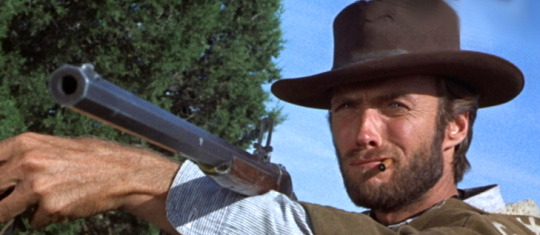
Nothing is better than when an iconic movie lives up to the hype. Clint Eastwood, Eli Wallach, and Lee Van Cleef play off of one another perfectly. I was impressed by Wallach as Tuco in particular: his character initially seems like a one-dimensional greedy criminal, but the performance is packed with wonderful moments of humanity. Do I really need to say anything about the direction? Or about the wonderful storyline, which takes on an almost mythic feel in its grandeur? Or that soundtrack?
Die Niebelungen (both movies) (dir. Fritz Lang, 1924)
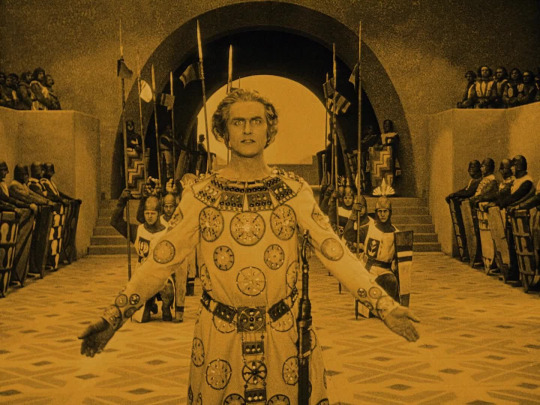
I did NOT expect to love these movies as much as I did. That they would be dazzlingly gorgeous I never doubted: the medieval world of the story is brought to vivid life through the geometrical mise en scene and detailed costuming. However, the plot itself is so, so riveting, never losing steam over the course of the four hours it takes to watch both movies. The first half is heroic fantasy; the second half involves a revenge plot of almost Shakespearean proportions. This might actually be my favorite silent Fritz Lang movie now.
Muppet Treasure Island (dir. Brian Henson, 1996)
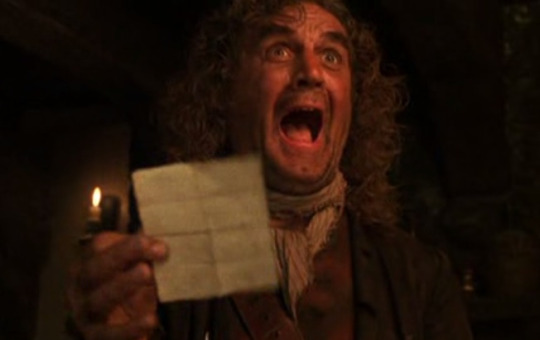
I understand that people have different tastes and all, but how does this movie have such a mixed reception? It’s absolutely hilarious. How could anybody get through the scene with “THA BLACK SPOT AGGHHHHHHH” and not declare this a masterpiece of comedy? And I risk being excommunicated from the Muppet fandom for saying it, but I like this one more than The Great Muppet Caper. It’s probably now my second favorite Muppet movie.
Belle de Jour (dir. Luis Bunuel, 1967)

I confess I’m not terribly fond of “but was it real???” movies. They tend to feel gimmicky more often than not. Belle de Jour is an exception. This is about more than a repressed housewife getting her kicks working as a daytime prostitute. The film delves into victim blaming, trauma, class, and identity-- sure, this sounds academic and dry when I put it that way, but what I’m trying to say is that these are very complicated characters and the blurring of fantasy and reality becomes thought-provoking rather than trite due to that complexity.
Secondhand Lions (dir. Tim McCanlies, 2003)
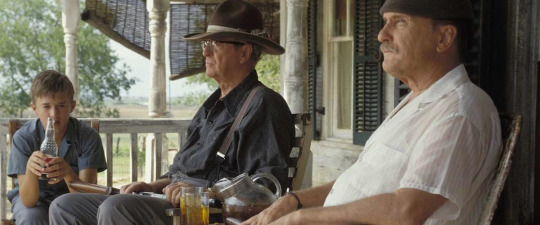
The term “family movie” is often used as a synonym for “children’s movie.” However, there is an important distinction: children’s movies only appeal to kids, while family movies retain their appeal as one grows up. Secondhand Lions is perhaps a perfect family movie, with a great deal more nuance than one might expect regarding the need for storytelling and its purpose in creating meaning for one’s life. It’s also amazingly cast: Haley Joel Osment is excellent as the juvenile lead, and Michael Caine and Robert Duvall steal the show as Osment’s eccentric uncles.
The Pawnbroker (dir. Sidney Lumet, 1964)

Controversial in its day for depicting frontal nudity, The Pawnbroker shocks today for different reasons. As the top review of the film on IMDB says, we’re used to victims of great atrocities being presented as sympathetic, good people in fiction. Here, Rod Steiger’s Sol Nazerman subverts such a trope: his suffering at the hands of the Nazis has made him a hard, closed-off person, dismissive of his second wife (herself also a survivor of the Holocaust), cold to his friendly assistant, and bitter towards himself. The movie follows Nazerman’s postwar life, vividly presenting his inner pain in a way that is almost too much to bear. Gotta say, Steiger gives one of the best performances I have ever seen in a movie here: he’s so three-dimensional and complex. The emotions on his face are registered with Falconetti-level brilliance.
The Apartment (dir. Billy Wilder, 1960)
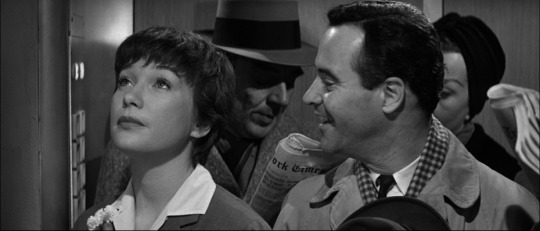
While not the most depressing Christmas movie ever, The Apartment certainly puts a good injection of cynicism into the season. I have rarely seen a movie so adept at blending comedy, romance, and satire without feeling tone-deaf. There are a lot of things to praise about The Apartment, but I want to give a special shoutout to the dialogue. “Witty” dialogue that sounds natural is hard to come by-- so often, it just feels smart-assy and strained. Not here.
Anatomy of a Murder (dir. Otto Preminger, 1959)
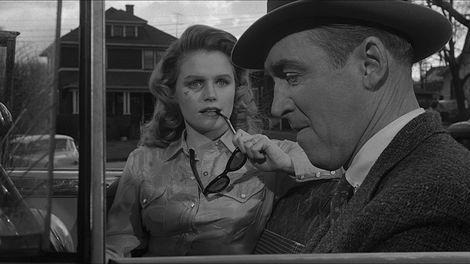
I’m not big into courtroom dramas, but Anatomy of a Murder is a big exception. Its morally ambiguous characters elevate it from being a mere “whodunit” (or I guess in the case of this movie, “whydunit”), because if there’s something you’re not going to get with this movie, it’s a clear answer as to what happened on the night of the crime. Jimmy Stewart gives one of his least characteristic performances as the cynical lawyer, and is absolutely brilliant.
Oldboy (dir. Park Chan-Wook, 2003)

Oldboy reminded me a great deal of John Webster’s 17th century tragedy The Duchess of Malfi. Both are gruesome, frightening, and heartbreaking works of art, straddling the line between sensationalism and intelligence, proving the two are not mutually exclusive. It’s both entertaining and difficult to watch. The thought of revisiting it terrifies me but I feel there is so much more to appreciate about the sheer craft on display.
Family Plot (dir. Alfred Hitchcock, 1976)
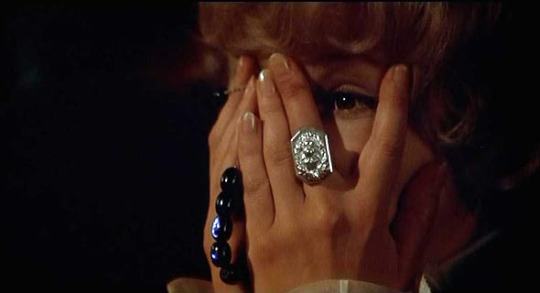
Family Plot is an enjoyable comedy; you guys are just mean. I know in an ideal world, Hitchcock’s swan song would be a great thriller masterpiece in the vein of Vertigo or Psycho. Family Plot is instead a silly send-up of Hitchcock’s favorite tropes, lampooning everything from the dangerous blonde archetype (with not one but two characters) to complicated MacGuffin plots. You’ll probably demand my film buff card be revoked for my opinion, but to hell with it-- this is my favorite of Hitchcock’s post-Psycho movies.
My Best Girl (dir. Sam Taylor, 1927)
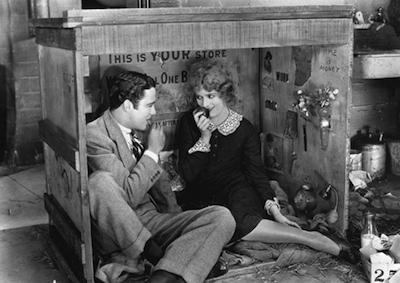
Mary Pickford’s farewell to silent film also happens to be among her best movies. It’s a simple, charming romantic comedy starring her future husband, Charles “Buddy” Rogers. Pickford also gets to play an adult character here, rather than the little girl parts her public demanded she essay even well into her thirties. She and Rogers are sweet together without being diabetes-inducing, and the comedy is often laugh out loud funny. It even mocks a few tropes that anyone who watches enough old movies will recognize and probably dislike-- such as “break his heart to save him!!” (my personal most loathed 1920s/1930s trope).
Parasite (dir. Bong Joon-ho, 2019)
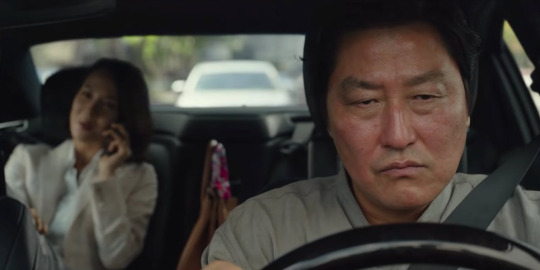
This feels like such a zeitgeist movie. It’s about the gap between the rich and the poor, it’s ironic, it’s depressing, it’s unpredictable as hell. I don’t like terms like “modern classic,” because by its very definition, a classic can only be deemed as such after a long passage of time, but I have a good feeling Parasite will be considered one of the definitive films of the 2010s in the years to come.
Indiscreet (dir. Stanley Donen, 1958)
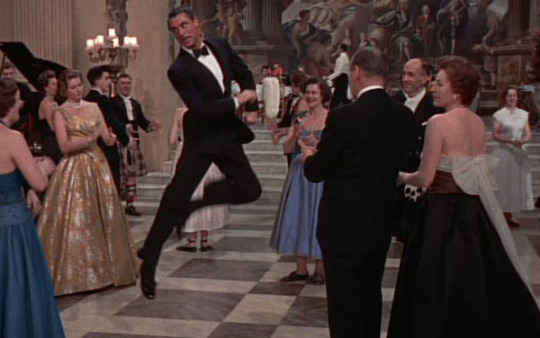
Indiscreet often gets criticized for not being Notorious more or less, which is a shame. It’s not SUPPOSED to be-- it’s cinematic souffle and both Ingrid Bergman and Cary Grant elevate that light material with their perfect chemistry and comedic timing. It’s also refreshing to see a rom-com with characters over 40 as the leads-- and the movie does not try to make them seem younger or less mature, making the zany moments all the more hilarious. It’s worth seeing for Cary Grant’s jig (picture above) alone.
The Taking of Pelham One Two Three (dir. Joseph Sargent, 1974)
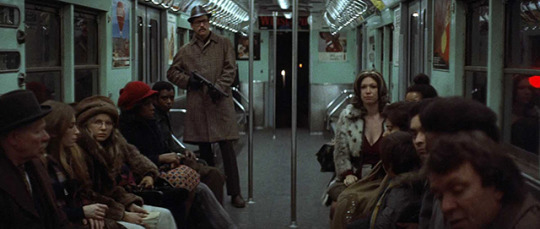
This movie embodies so much of what I love about 70s cinema: it’s gritty, irreverent, and hard-hitting. It’s both hilarious and suspenseful-- I was tense all throughout the run time. I heard there was a remake and it just seems... so, so pointless when you already have this gem perfect as it is.
They All Laughed (dir. Peter Bogdonavich, 1981)
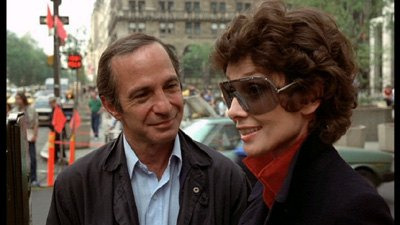
Bogdonavich’s lesser known homage to 1930s screwball comedy is also a weirdly autumnal movie. Among the last gasps of the New Hollywood movement, it is also marks the final time Audrey Hepburn would star in a theatrical release. The gentle comedy, excellent ensemble cast (John Ritter is the standout), and the mature but short-lived romance between Hepburn and Ben Gazarra’s characters make this a memorably bittersweet gem.
The Palm Beach Story (dir. Preston Sturges, 1942)

Absolutely hilarious. I was watching this with my parents in the room. My mom tends to like old movies while my dad doesn’t, but both of them were laughing aloud at this one. Not much else to say about it, other than I love Joel McCrea the more movies I see him in-- though it’s weird seeing him in comedies since I’m so used to him as a back-breaking man on the edge in The Most Dangerous Game!
Nothing Sacred (dir. William Wellman, 1937)
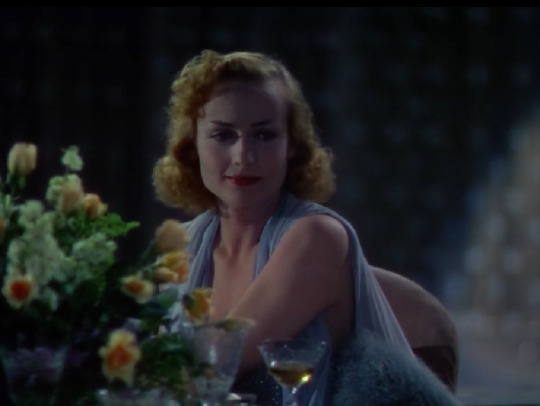
I tend to associate William Wellman with the pre-code era, so I’ve tried delving more into his post-code work. Nothing Sacred is easily my favorite of those films thus far, mainly for Carole Lombard but also because the story still feels pretty fresh due to the jabs it takes at celebrity worship and moral hypocrisy. For a satire, it’s still very warm towards its characters, even when they’re misbehaving or deluding themselves, so it’s oddly a feel-good film too.
Applause (dir. Rouben Mamoulian, 1929)

I love watching early sound movies, but my inner history nerd tends to enjoy them more than the part of me that, well, craves good, well-made movies. Most early sound films are pure awkward, but there’s always an exception and Applause is one of them. While the plot’s backstage melodrama is nothing special, the way the story is told is super sophisticated and expressive for this period of cinema history, and Helen Morgan makes the figure of the discarded burlesque queen seem truly human and tragic rather than merely sentimental.
Topaz (dir. Alfred Hitchcock, 1969)
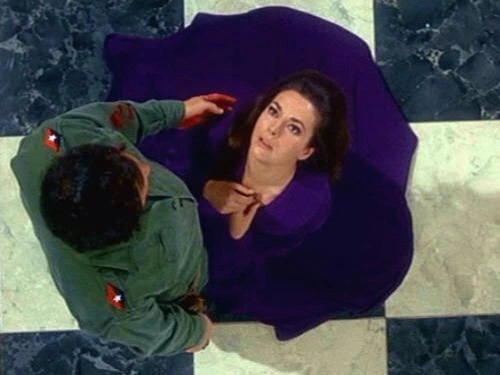
Another late Hitchcock everyone but me seems to hate. After suffering through Torn Curtain, I expected Hitchcock’s other cold war thriller was going to be dull as dishwater, but instead I found an understated espionage movie standing in stark contrast to the more popular spy movies of the period. It’ll never be top Hitchcock, of course-- still it was stylish and enjoyable, with some truly haunting moments. I think it deserves more appreciation than it’s been given.
What were your favorite cinematic discoveries in 2020?
#thoughts#belle de jour#topaz#family plot#the taking of pelham 123#the pawnbroker#nothing sacred#my best girl#applause#muppet treasure island#perfect blue#die niebelungen#parasite#the good the bad and the ugly#the palm beach story#they all laughed#indiscreet#oldboy#anatomy of a murder#the apartment#secondhand lions
156 notes
·
View notes
Text
“The 02 characters didn’t get any character development”
Yes, they did.
“But -- “
Yes, they did.
Having had the gift of having rewatched 02 recently, I have to say that it still really, really confuses me how the hell people get this impression. It’s not even “I’m trying to see the best out of this” but that I genuinely do not get it, because as far as I’m able to see it’s pretty much literally right there!! This isn’t even tinfoil hat tier!
But in case you have any doubts, sit down because Shiha’s gonna sit here and write a meta about the 02 kids, and how they are perfectly reasonable characters that developed properly fine over the course of the series.
(All below translations of 02 dialogue are by PositronCannon.)
So the first thing to understand about 02 is that it is fundamentally made with a very different writing approach from Adventure in the first place, and therefore it is not meant to be compared in a one-to-one fashion.
This is a point I’ve said many times over and over, and I think it’s to the point where it shouldn’t even really need official clarification, but I’m just going to go ahead and bring up the words from Director Kakudou himself:
For instance, we had the prior series stick out in terms of its points about “what it means to be oneself”, and for 02 we made it so that you would pay attention to “the relationship between yourself and other people”.
Right, so: 02, by design, does not use Adventure’s character development methodology of “self-awareness”. It is built from the ground up by having its characters and character development predicated on relationships instead of singular characters. This might seem a bit odd on its face, but no man is an island, and, in fact, changing the way you interact with other people and with the world in general does speak a lot about one’s personal growth in its own way. And this also means that if you try to analyze 02 by holding it to Adventure-based standards of “character focus episodes” or the like, you’re already on a losing battle.
This means that character growth in 02 is not presented in a way where it’s up-front and center, but rather something you have to glean over the natural course of the series. We’re working off relationships, so you have to actually pay attention to the natural interactions between the characters or what they say even during “off-hours” -- the focus-episode format used by Adventure doesn’t apply here anymore. And it’s something apparent enough from how “evolution” is a metaphor for “personal growth” in this franchise -- in Adventure it was via the Crests, which meant self-awareness, but 02′s key evolutionary trump card is Jogress, which relies on the strength of relationships.
One thing I have to say in terms of my experience as a 02 fan is that I’ve found I actually appreciated it significantly more as an adult than I did as a kid, and that, in general, a lot of the things to appreciate about 02 are things that you really viscerally feel and understand when you’ve gotten that degree of life experience under your belt. Unfortunately, this is kind of a double-edged sword, too, because it ends up becoming the kind of series that often risks going over the heads of the very audience of children it was supposed to be targeting. It’s got a lot of very nuanced depictions of mental health and the childhood experience that are maddeningly subtle, to the point of possibly going over one’s head or even coming off as illogical without sufficient life experience, or simply just not being as visceral (the entire theme of “parents stroking their own ego with their kids’ achievements” hits the hardest when you’re college age).
So what this means is that 02 doesn’t exactly hand its themes or character development to you on a plate. But it is there, once you actually start looking for it.
Let’s start off by talking about our main core cast of characters. Adventure and 02 prided themselves on the fact that they tried very hard to not be adherent to anime tropes, but rather to portray well-rounded, nuanced characters that felt more like actual kids you might meet at school. So how does the 02 cast fare in not being pigeonholed anime tropes?
Daisuke: Even though official freely admits he has “the most anime-like personality”, it’s hard to say he actually falls that much into the generic shounen archetype. For one, he’s actually shockingly humble and polite in certain situations (he’s consistently polite with his elders, and is very quick to admit his own limitations). Actually, he comes off as a surprisingly friendly and deferential person -- it’s just that he happens to have somewhat of an abrasive exterior, and even then it’s implied heavily in the first half that this stems from a lack of validation and purpose. (He actually “deflates” really easily, so you can’t even say he’s all that arrogant past the surface.) Certainly he’s simple-minded, and kind of an idiot, but his abrasive exterior is actually pretty deceptive.
Miyako: Miyako floats an interesting duality of simultaneously being aggressively feminine and being aggressively un-feminine -- not necessarily in the sense she tries not to be feminine (on the contrary, she absolutely embraces it), but more that she’s also an aggressive, “inelegant” mess in ways atypical for a lead heroine in a shounen show, who are usually either cute or “badass action girls” and not...a mess. Despite that, she is also consistently portrayed as capable of heavy emotional depth and being very genuinely kind and concerned about others, which are not in any way diminished by the fact she happens to be an aggressive mess with a severe case of foot-in-mouth syndrome. It’s an interesting mix of character traits that you don’t see often.
Iori: “Designated young characters” usually fall into the “cute” archetype a la Adventure!Takeru or Tomoki, so it’s interesting that the youngest one is actually the most mature one, and impeccably polite at that (having been raised by a family that emphasizes formal manners and propriety). Even more interestingly, nobody actually treats him like he’s that much younger, and he’s given the weight of respect in a sense that has nothing to do with his age (think about how there are indeed quite a few kids who simply just get along better with older kids). Yet the series doesn’t shy away from his youth, and his overly black-and-white view of morality is portrayed as immaturity in its own way, along with the occasional “slips” in his facade or manners indicating that it’s still something he has to consciously focus on.
Ken: Ken’s development goes without saying (it’s one of the most consistently praised aspects of 02), but it’s also interesting to note the unusual way the series plays his redemption arc. Instead of making him a typical “jerkass anti-hero who learns to get a bit better”, the series completely blindsides you by revealing that Ken is, in fact, a naturally soft-hearted and kind boy, and then plays up the mystery of the severe kinds of trauma that would lead him down that path. And ultimately, even though the cause is revealed to have supernatural influence, the series also makes it clear that it doesn’t matter -- that, whether it was his conscious “fault” or not, he still is responsible for what he did. And on top of that, it also scorns the usual “redemption by sacrifice” mentality by pointing out that it’s a cop-out -- it doesn’t actually solve the problems that were caused, and, in fact, a much better way to make up for things is to fix them going forward.
Takeru: Takeru had the “designated young character” role in Adventure, and it turns out that once one of those gets a few years older, they’re naturally not going to be nearly as pure and innocent! The “sweet child” from Adventure has now grown into having slightly pettier emotions, even to the point of grudge, and things he won’t let go of. Oh, and also, trauma from three years prior is still going to have impact on an eleven-year-old kid. Who would have thought.
Hikari: Adventure’s most infamously inscrutable character also seems to have gained some individualized, not-quite-innocent traits of her own (observe how she deals with Daisuke’s advances), and, moreover, it turns out that her deferential humility and refusal to open up about her problems is...not a good thing! when it starts to actually bite her in the rear in front of her friends. Yeah, it turns out that being the “quiet cute girl” actually has its own mental health drawbacks. Oops.
We’re doing pretty well, actually! At the very least, they certainly feel like they already have the Adventure/02 brand of character nuance, where their personalities are inherently varied and nuanced enough that you may not quite find characters like them elsewhere. On top of that, we definitely get to see what makes these characters “tick” -- we get a lot of depth into their thought processes and what their likes and dislikes or strengths and weaknesses are, and that’s something 02 still completely beats out a lot of other kids’ shows or even certain other Digimon entries with.
But here we’re talking about character development. So what do we know about them at the very beginning of the series?
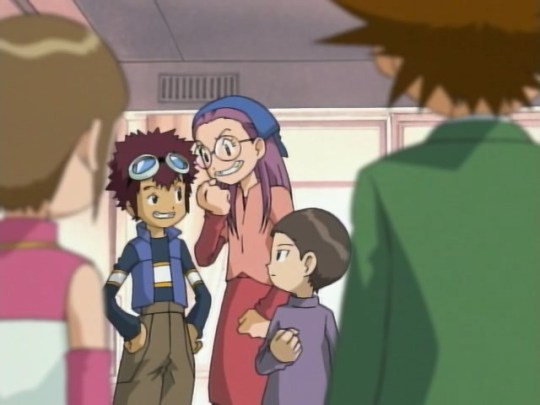
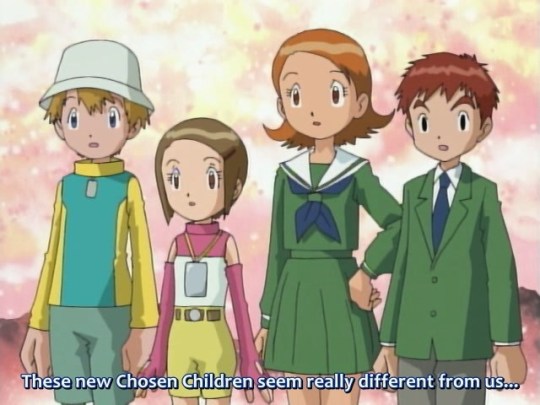
Having watched 02 in Japanese a few times and being very used to the core cast’s latter-half characterizations, rewatching the early episodes always strikes me really hard in the face with genuine shock at how shallow the kids -- especially Daisuke and Miyako -- start the series off as. It’s understandable in terms of the context of the series -- unlike the Adventure kids, who were thrown into a “survival, need to get home” situation off the bat and thus already understood the need to be wary, these kids started off having comparatively easy access to home at any time, and didn’t have a constant sense of danger and survival looming over their heads. It naturally took a lot of time for the gravity of the situation they were in to start really hitting them, and so even the relatively straight-laced Iori didn’t exactly take it all that seriously at the beginning.
Yet while it took them a significantly more delayed time to understand what they were dealing with and take it as seriously as they needed to...they started cultivating something else in the meantime.
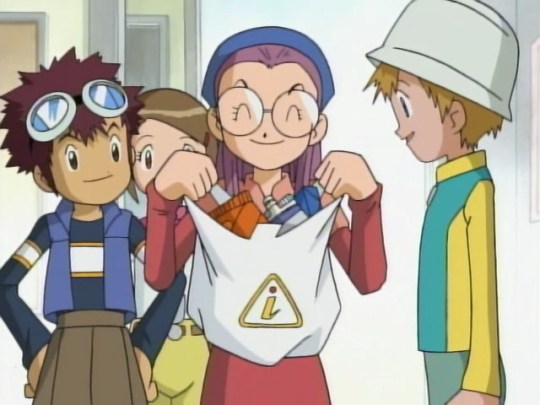
02′s first half is especially full of “random banter conversations” that seemingly involve nothing in particular, but, in fact, that’s actually part of the point. One thing I have always been quick to point out in regards to 02 is that it is rather unique among Digimon series in how it goes out of its way to portray its core cast as having become friends even in pure daily-life social friend terms, even if it had absolutely nothing to do with Digimon incidents -- these are kids who genuinely enjoy each other’s company even in the most mundane of situations. This was something that wasn’t the case for the original Adventure kids -- having been a group of kids thrown together by necessity, even though they most certainly kept in touch and trusted each other as fellow Chosen Children deeply, they started floating back into their own different social clusters after the events of 1999. Relationships are multifaceted, after all; you can still have a deep relationship and bond without necessarily being friends on a social level.
But already, off the bat, Miyako brings food for her new best friends, and it’s implied that she’s the main ringleader behind holding the picnic -- a picnic that started off having no intended relation to the Digital World territory war -- in episode 6. And, to be quite honest, can you really blame these kids? Even the Adventure kids wistfully entertained the idea of a long-term fun adventure through the Digital World in Adventure episode 54, wanting to enjoy its beauty and fun in a situation where they weren’t constantly running for their lives. Now that this luxury is actually available, why not take advantage of it -- and bond further with the others in the process? And for the rest of the year, these kids actively end up spending mundane conversations together and bonding to the point that, by the time we get to the end of 02, these kids have just genuinely bonded so much that they really come off as a cohesive, inseparable unit that would actively choose to spend time with each other if given the opportunity. In fact, even going through all of the TV Digimon series that exist as of this writing, I would say Appmon is the only one that really competes with 02 in portraying its core cast in this manner.
Again, remember: this is a series where characterization is dependent on how the kids treat others and interact with them, so you do actually have to pay close attention to these interactions and see how they change over the course of the series.
So once the episodes start coming in play, we actually learn a lot more about what happens when the characters start breaking away from their shallowness. For instance, episode 8, one of the first key episodes to understanding Daisuke’s character:
Daisuke: He'll be a great opponent. We didn't face off in the last tournament.
Takeru: If you had made it to the finals, you would have, right?
Daisuke: Don't remind me...
Hikari: Can you win?
Daisuke: It's not about winning or losing. Right now, all of the boys who play soccer in this country want to be like him. Just thinking about playing against him makes me excited!
For all Daisuke initially seems to be arrogant, he’s actually not that incapable of humility. Far from it, actually; he does have a genuine love for soccer and the spirit of the game, and, when completely and obviously unmatched, fully admits he has no chance and is set on enjoying the most he can out of it anyway. I feel like Daisuke’s surface-abrasive attitude really does throw off the fact that he’s a lot more genuinely humble than he’s given credit for. In the end, he’s satisfied enough with the accomplishment of pulling off one sliding tackle against Ken, and is able to enjoy that -- a foreshadowing of how the latter half relies so much on the fact that he’s capable of enjoying simple pleasures and being straightforward about them.

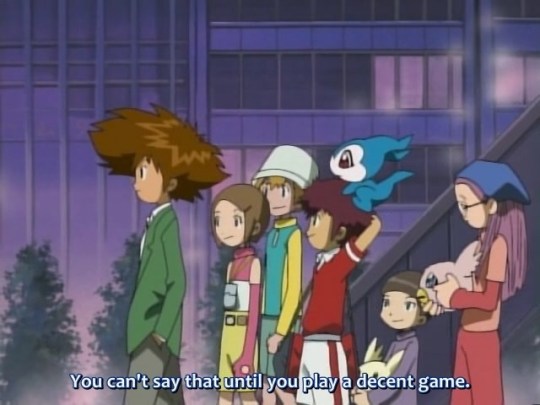
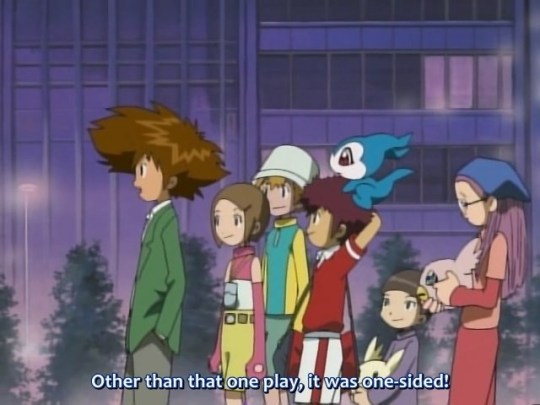
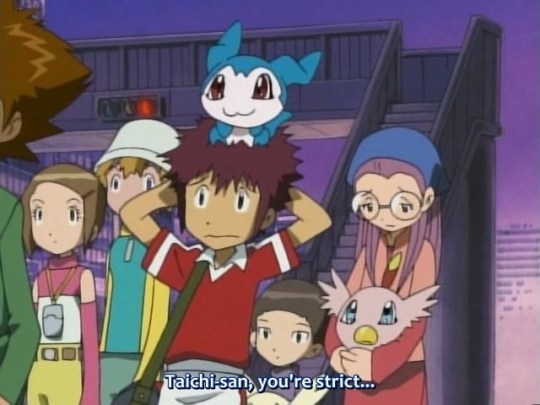
I find that this scene is really underappreciated, too (mainly because it gets lost in all of the other major things in this episode) -- while Daisuke jokes about his accomplishment, it only takes a single comment from his respected senior Taichi to shut him down.
There’s a huge reason I constantly emphasize that Daisuke respects his elders -- this part tends to get lost in translation a lot (especially the American English dub, which just smashed this aspect out of him wholesale, among other things) due to it being a bit reliant on Asian senior deference and cultural propriety, but Daisuke is respectful not only out of societal obligation but also because he genuinely respects his elders! The way he looks up to Taichi and chases after his approval is genuine, and even his interactions with the other Adventure kids have a major hint of him having genuine respect and deference to them. Daisuke is just a deferential person in general -- note that while his crush on Hikari tends to manifest when he’s at his most shallow, he’s actually the one putting Hikari on a pedestal (considering it his own responsibility to impress her), so he’s not actually as assertive as he tries to come off as. The first half of 02 arguably has him deflating more often than he actually stands his ground...and this is a trait of him that starts to actually change quite a bit over the course of the series.
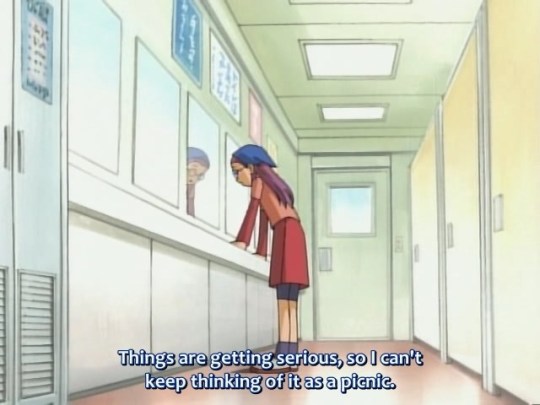
Miyako comes to terms with the fact that maybe she’d been taking this whole Digital World adventure thing too lightly in episode 10, indicating that she actually does have a good sense of priorities when they become increasingly clear! This is actually very important, because it fleshes her out as someone who’s emotionally sensitive -- too emotionally sensitive, to the point that “emotional sensitivity” is just as much of a driving point behind her later breakdown in episode 18, this time from taking her duties too seriously. Miyako is a very id-driven person, and so a lot of the early series is her struggling to find a proper balance on how to adjust her emotions in an increasingly escalating situation. Her heart is in the right place, she’s just not someone with an inherent sense of preparedness to deal with this kind of problem.
We get into the secondary Digimental arc, and there’s a noticeable consistent thread that all of them involve admission of personal faults. This is something that tends to throw people off at times -- wait, having bad traits about yourself is what awards you? -- but the point is that this isn’t like Adventure’s Crests, where things came from proof of exercising the virtue, but rather admitting that there are ways you need to improve, and showing a will to improve in that manner. In the end, people are not perfect human beings, and sometimes even understanding that you’re deficient is half the battle -- after all, the second half is all about a certain character named Ichijouji Ken coming to terms with some very, very serious personal problems.
In episode 11, Daisuke completely admits that he doesn’t feel he understands the concept of friendship the way Taichi and Yamato et al. see it, also latently admitting that he doesn’t see himself as worthy of the Digimental of Friendship. Beyond betraying a lot deeper issues within Daisuke that he seems to have actually had a background lacking in friends and sources of validation, he actually acts very self-effacing when admitting his issues to Taichi and Yamato, ultimately culminating in him calling himself pathetic. Or, in other words, he does want to be a better friend and to understand the concept better, and is harsh on himself for not doing better (which, of course, ultimately leads to how he eventually does gain better relations with the rest of the group and reaches out to Ken).
In episode 14, Miyako admits that she’s shallow and judgmental and tends to jump to conclusions based on first impressions. Recall that she’s comparing herself to Mimi in said relevant scene -- Mimi, whom she admires, and actually spends part of the episode trying to understand and empathize with the mentality of. This is not a statement of Miyako being proud of herself. Rather, this is Miyako being very straightforward about the fact that she needs to try harder to see through the essence of things and to see through to the emotional core of. Again, something she actually does start developing over the course of the series.
In episode 16, Iori gets his first major lesson on the limitations of being too stuck on principles in his attempt to be honest. Recall that Iori’s later character arc is very dependent on him realizing that his own view of the world is too black-and-white. It’s great if you could never tell a lie to anyone, ever, but in the end, that’s going to reach limitations of practicality -- after all, as Jou points out, what Iori did ended up not actually hurting Jou in comparison to the incredible amount of hurt it would have caused everyone by being too stubborn, and thus Iori would have failed to keep his responsibility to help the others because of one narrow-minded principle.
Hikari even gets in a bit during the infamous episode 13, where we learn that her “passive” attitude is biting her in the rear. In Adventure, Hikari’s passiveness and reticence had mostly been used as satellite development for Taichi (his insecurities as an older brother and his obligations to her), so this is actually the first time we get to see a proper perspective from Hikari’s side, and it turns out that his overprotectiveness has actually caused her to get dependent. But even though Taichi is the one the episode actually focuses on, the larger focus is more specifically on the fact that Hikari is too passive -- that she sees being taken by the Dark Ocean as an inevitable thing that’s just going to happen unless someone else steps in on her behalf. Takeru, of course, is having none of it.
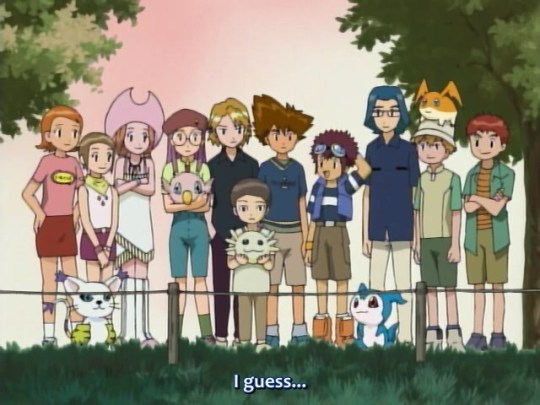
Once that’s out of the way, we go back to taking a look at the subtleties of everyone’s interactions. While everyone generally tends to focus on the second half of episode 17, it’s also pretty interesting to see how the 02 kids react to hearing about their seniors’ adventure in the first half -- remember that this is the first time the 02 kids are actually given any real depth about the degree of 1999′s events that’s not just random points of hearsay, and the way the new kids react to it indicates that they’re thoroughly floored. It’s later established that they didn’t even get the full story (it may not even be possible, given that the Adventure kids’ experiences may well have gone even further beyond what we got to see in 54 episodes), and yet the new kids are overwhelmed. 02 itself does not shy away from the fact that the younger kids really have no qualms about deferring to their seniors if need be, and treating them with utmost respect.
Another minor note, which I pointed out in my Daisuke meta earlier, is that the beginning of this episode is pretty much the last time Daisuke ever shows outright hostility towards Takeru for his relationship with Hikari -- it’s something you have to glean by squinting, but the implication is that the insecure and clingy Daisuke actually got to learn this episode that the two of them had a pre-established shared experience that he himself may not understand, and that it wasn’t just Takeru randomly swooping in and snatching away the closest thing he had to a friend for no good reason.
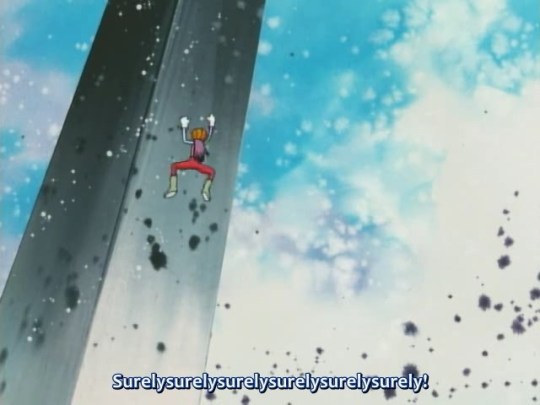
Once the Kaiser infiltration arc begins, episode 18 ends up being one of Miyako’s funniest episodes, but it’s a bit distressing that a lot of people in the fanbase often never let Miyako live this incident down, when in actuality this was explicitly not a good mental health day for her. (This is basically the equivalent of pinning Mimi as a conceited, self-centered jerk based on the fact she was one for a fashion in Adventure episode 25.) The beginning and ending of this episode establish that this is basically a result of Miyako...trying her hardest. She’s scared as hell, but she also learned in episode 10 that this is something she needs to take seriously, and the stress puts her into a mental breakdown. This is why she ends up having a heart-to-heart with Hawkmon at the end; her heart is in the right place, but she needs to find a way to channel her emotional sensitivity in a way that doesn’t make her into a complete mess.
And note that her own voice actress, Natsuki Rio, even pointed out that Hawkmon’s actions had enough of an influence on Miyako’s character that she had to play her differently thereafter.
At first I always played her with Maximum Excitement, and I kept thinking “someone, please, stop her,” but the more straight-laced Hawkmon did his best to pull her in and hold her by the reins (laughs). Thanks to him, Miyako became a lot more of a put-together person…thank goodness Hawkmon is her partner!
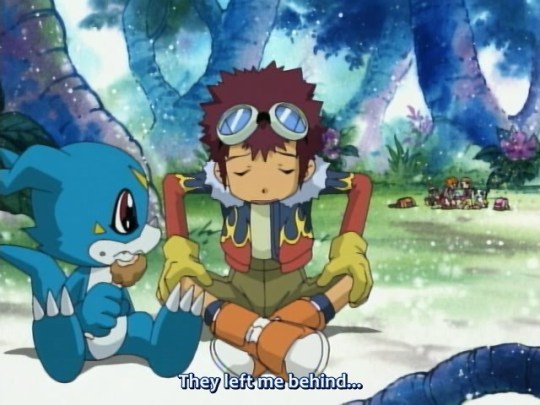
Episode 19 has two interesting things of note that I want to point out -- first of all, starting from the very beginning of the episode, everyone ditches Daisuke because they’re independently going in to infiltrate the Kaiser’s base. Note the complete lack of a plan here whatsoever -- everyone’s just going in on their own -- and the fact that everyone expects Daisuke to come up with what he wants to do on his own. For all it’s worth, even though Daisuke may have a designated protagonist aura to him, within the story itself...nobody actually sees him as a leader at this point in the series (and, to be fair, he’s never really tried to claim the position, either).
It’s similar to how Taichi was never recognized as a particular leader of the Adventure group until Adventure episode 28, but in regards to the full team dynamic, it’s actually inverse -- the Adventure kids were capable of making tactical plans together as early as episode 20, but fell apart emotionally in short order as soon as Taichi was gone, whereas here, the kids are fond enough of each other to hang out socially and support each other emotionally, but they take a while to get any real cohesiveness as a fighting group.
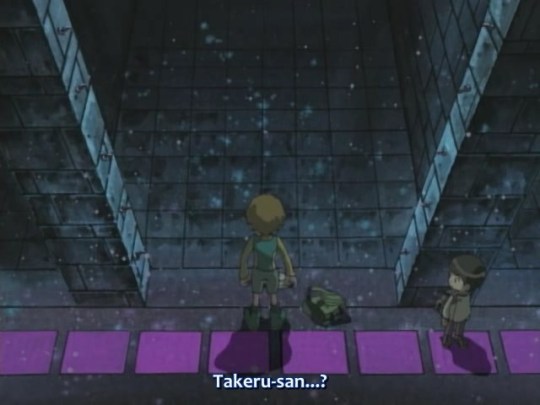
The other is that Iori personally witnesses Takeru’s sudden whiplash into his grudge against the darkness and the Kaiser, and it scares the hell out of him.
Takeru eventually laying a punch on the Kaiser is a pretty awesome moment (and, really, Ken kind of deserved it, so it’s hard to not cheer for him), but it’s also important to note that within the context of the series, this is not a good mental place for Takeru to be in. Iori, the person who should by all means sympathize with hatred of evil things at this point of the series, is still extremely unnerved by Takeru’s actions here, because he’d always seen Takeru as a mature person who’d always kept his composure, only to show a drastically different side of him that he hadn’t even shown a hint of before. That kind of “two-facedness” and emotional repression -- and this way of venting trauma in general -- cannot be good for Takeru at this point in time, and it’s also an important moment for Iori when he later admits during the two’s Jogress arc that he’s having a bit of a hard time understanding him.
And so episode 20 comes, and Chimeramon pretty much takes out the entire party, leading to this conversation.
Takeru: Let's escape.
Daisuke: Escape?
Takeru: We can't fight anymore. Our mission has failed. We'll retreat and wait for another chance.
Hikari: You're right. We have no other choice.
Iori: Understood.
Daisuke: No.
Miyako: Daisuke?
Daisuke: We can't just say "another chance" like that. If we leave now, they'll keep attacking anything in sight. We don't know if we'll be able to get into the fortress again. So this is our only chance!
Hikari: That's crazy...
Iori: Exactly!
Miyako: They're all back to their Baby forms...
Chibimon: Daisuke...
Daisuke: But...didn't you all see it? Destroying those towns...and all we could do was watch quietly. I don't want to see that ever again. I won't let them do whatever they want! So I'm going, even alone. I won't give up now. After getting this far, all I can do is go forward!
Why is this moment important? This is the first time Daisuke has actually stood a firm ground against anyone else in the party -- and not only that, with the entire party standing against him.
Recall that I mentioned earlier that, in spite of Daisuke’s abrasive attitude suggesting otherwise, he actually has a tendency to “deflate” pretty quickly when people tease or criticize him. He spends the first half of the series having a lot more bark than he actually has bite. Earlier in the series, if the entire party were to go against him, he’d be more likely to begrudgingly go along (while complaining) -- in fact, he actually did just that at the beginning of episode 7! But now that push has come to shove, Daisuke’s own sense of morals and bleeding heart have won out. (While his decision here is definitely a bit reckless, he does have a point; if they’d retreated, they might genuinely lose any future chances.) Even with the entire party telling him to pull back, he refuses to accept what they want him to do, and pushes forward.
This is where Daisuke first starts to really make strides towards what becomes his eventual major role in the group as “the one who pulls people forward”. It’s a moment after which the rest of the group themselves also start to treat him with more respect now that he’s proven he’s not just a doormat, and that when it comes to there being a real problem with real priorities, he does have the resolve and initiative to keep going.
Also, a very important point is that he immediately says he’ll go alone if he has to. He doesn’t begrudge the others for wanting to fall back, and has no condescension towards them; he just can’t stand the fact that he himself is being asked to sit it out.
So, you know. Episode 21 happens. Ichijouji Ken goes through some real trauma as Wormmon dies in his arms. And all Daisuke has to say is...
Daisuke: You should go home. There are people who are worried and waiting for you! Go home!
Remember when I pointed out that 02 takes a very unique perspective on Ken’s redemption arc, pointing out the futility of being too trapped in the idea of symbolic penance and focusing more on actively taking steps in the future to make up for and fix things? Here’s our first major sign of this, and Daisuke’s eventual approach to Ken -- Daisuke does not choose to scorn or lambast Ken for what he’s done, even though there are a lot of things Ken deserves to be harped on for, but rather instructs him to take the first active step towards fixing his mistakes, in this case fixing things with his family.
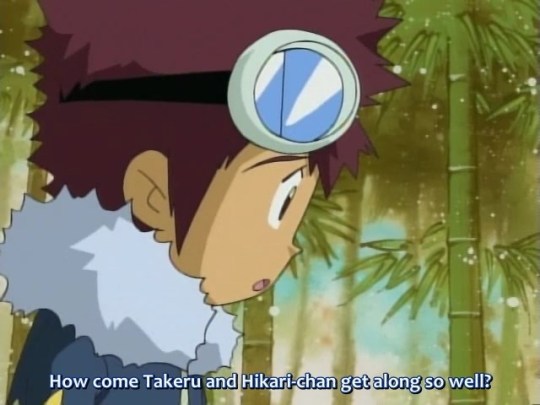
Episode 22 is Daisuke’s own “fanbase will never let him live this down” moment, but there’s still some interesting things to note here. Firstly, Daisuke’s “relapse” happening exactly when it seems like his duty to the Digital World is done and there’s nothing to do besides community service doesn’t seem coincidental, especially when this exact episode actually dedicates a full scene to Takeru, Hikari, and their partners going “...now what?” Secondly, as I touched on earlier, note that Daisuke’s never really seemed to have any resentment against Hikari for not responding to his affections -- in fact, he still considers it his own (and V-mon’s, by extension) duty to be the one to impress her. It’s a surprisingly refreshing take on the “shounen hero with a crush on a girl” trope, because in the end...Daisuke isn’t actually all that possessive of her, he just really wants validation from her, and respects her a lot.
More importantly, though -- note the way Daisuke handles this topic. He’s not actually mad at or resentful of Takeru anymore. In fact, he’s mulling on the topic and wondering what he could do to be on that level. Yup, even when Daisuke’s being shallow and jealous, he’s still learned to handle this issue ever so slightly more maturely than he would have at the beginning of the series.
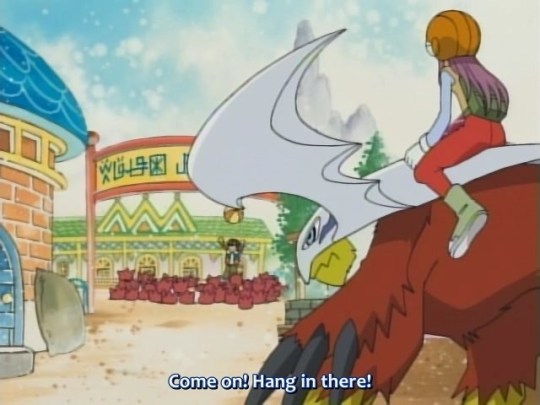
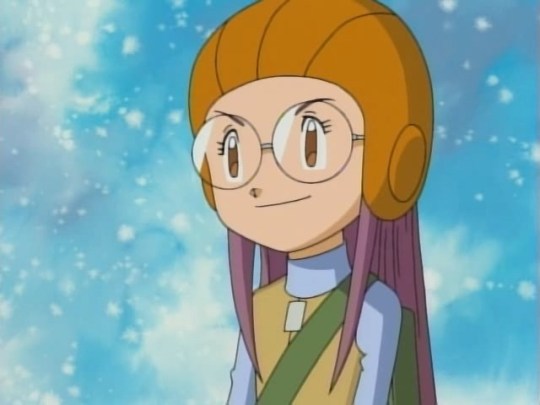
This is also important because only one episode later, once Daisuke becomes disappointed again at Takeru and Hikari walking off on their own, Miyako intervenes -- not only so that Takeru and Hikari can have their space, but also so that Daisuke can have some genuine fun and something to do. This is a very blink-and-you’ll-miss-it moment in episode 24, but it makes it very clear that Miyako was looking out for Daisuke’s welfare, too, and I think it’s very important in light of the events of the prior episode. Miyako, who had always been fumbling on what to do with her emotions, is starting to properly channel them into managing the dynamic between the team and checking in on how everyone’s doing, and that starts to guide her actions and relationships for the rest of the series.
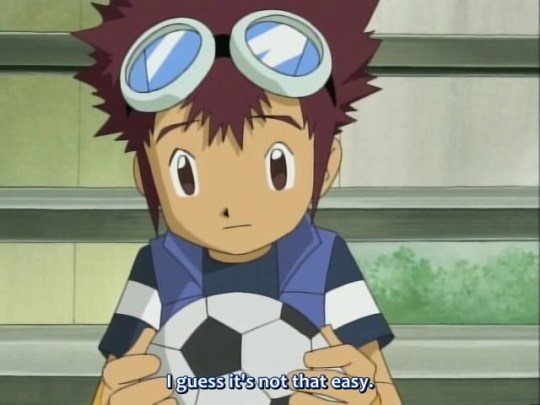
The next episode (25) is where we kick off not only the Jogress arc, but also the arc where we start going into everyone’s attitude towards Ichijouji Ken. This is important not only because Ken happens to be the effective central figure of 02′s story, but also because -- well, remember, 02 is fundamentally founded on the concept of relationships, so it’s only natural that the other kids’ relationship with the “team newcomer” will be a key aspect of the second half, and in relation to their own characters.
Remember how I said that Daisuke’s first-half character involved him being extremely deferential and often deflating whenever he was criticized or someone stood against him? At the time of episode 25, once again, pretty much the entire team is standing against him -- he’s the only one who’s this level of open-minded about getting Ken into the group, and everyone else is showing differing levels of opposition. But while Daisuke doesn’t begrudge the others for thinking this way, he also doesn’t back down, either, and reaches out to Ken on his own because he still really believes in what he’s doing. Now that he’s settled into what it means to be a Chosen Child, he’s started to gain a proper idea of what he wants to do, and what he feels needs to be done.
So, let’s recap everyone’s stances on Ichijouji Ken at the time of this episode!
Daisuke: Forward-thinking and optimistic; willing to believe that Ken should be given the chance to make up for his mistakes and that they should put everything behind him, even to the extent of believing that there’s probably a good reason for the more suspicious aspects about him (prior to the events of episode 25, it was unclear whether Ken was being a bit too callous about killing Digimon). Also the most actively aggressive in reaching out to Ken and trying to get him to join them.
Miyako: Forward-thinking; she openly states at the beginning of the episode that she thinks Ken’s learned his lesson, she’s just worried about whether he’s going to keep doing questionable things in the future (killing Digimon). Once it’s on the table that he’s not just doing this callously, she immediately is on board with him (to the point of even being the first in the group to use given name basis with him), but her stance on what to do with him is more on the edge of “give him space and wait for him to come on his own terms” (she ends the episode saying she’ll be waiting for him to come).
Takeru: States in the episode that he does believe that Ken’s changed, but doesn’t really know what he’s thinking (i.e. too inscrutable to really be sure about). The later episode 35 implies that Takeru was inclined to be a bit more sympathetic than you’d think otherwise, because he understands the trauma of losing a Digimon partner.
Hikari: Wants to wait a little longer and see how things play out. (Remember that Hikari has a known, consistent thread of taking a very passive approach towards things.)
Iori: Absolutely against it on sheer principle.
It should be noted that none of these stances are wrong. Iori sometimes gets a lot of flak for being the one with the most infamously cold stance towards Ken, but when you really think about it, Daisuke and Miyako are very lucky that their hunch about Ken was right and that he actually did happen to be a very kind boy who had a little too much trauma and some supernatural influence. The fact that Ken is a very emotionally withdrawn person for the rest of the series meant that the two of them ended up breaking through to him the most, but there’s nothing wrong with Takeru, Hikari, and Iori’s skepticism; Ken did some pretty shockingly horrible things in front of their eyes for the first half, and it’s entirely within their rights to determine how forgiving they want to be with him.
In any case, we get to episode 26 (the first Jogress), and most of that episode goes without saying, but I do want to emphasize Daisuke’s lines right before it happens.
Daisuke: If you die now, you won't be able to accomplish anything...I don't want that!
Ken: I don't want that...There are still many things I must do.
Daisuke urges Ken not to go for the “suicidal penance” route not only because it sucks, but also because, as symbolic as it may be, it’s also counterproductive to the whole point of doing penance to begin with. If Ken really wants to make up for his mistakes, he’s only going to be able to do that if he’s actually alive to do it! There’s only so much you can do by drowning in self-pity by going “because I did this, because I did that” instead of actually taking responsibility for your actions.
02 itself is deliberately ambiguous on how much Ken’s transformation into the Kaiser was Ken’s own conscious will and how much of it was Dark Seed-induced supernatural influence, but one thing it’s consistent about is that it doesn’t really matter. Regardless of what the cause was, Ken did what he did, and it’s his responsibility to make up for it, and the only way to actually do that is to keep moving forward. The fact that Daisuke is so able to viscerally and directly address what Ken needs the most right now is what fuels their first Jogress, and why Daisuke becomes Ken’s closest friend through the rest of the series.
People have pointed out that 02 has a lot of moments of physical hits, but, notably, other than Takeru punching the Kaiser in episode 19 (which he really deserved, honestly), all of these hits are done with the express intent of bringing the other person out of a very, very deep mental abyss (Yamato punching Taichi in episode 10, Daisuke slapping Ken in 26, Miyako slapping Ken in 30, and Miyako and Hikari’s mutual slaps in 31), because they were in a state where words would no longer reach them otherwise. These are all circumstances of the kind where the person on the receiving end understands that they really needed a drastic wake-up call because of how deeply they’d fallen (and these aren’t some average mental abyss problems these kids are getting put through, either). It’s actually hard to imagine any of the 02 group getting in the kind of genuinely angry and vicious fistfights Taichi and Yamato would in Adventure, because of how close they are (the closest being Daisuke and Takeru grappling in episode 11, but it never got near that level) -- in fact, these kinds of things are done with the implication that they’re doing it because they trust the other person to not hold it against them (and in fact, the fact Yamato does this with Taichi in this way is intended to be read as a sign of how much better they’ve come to understand each other).
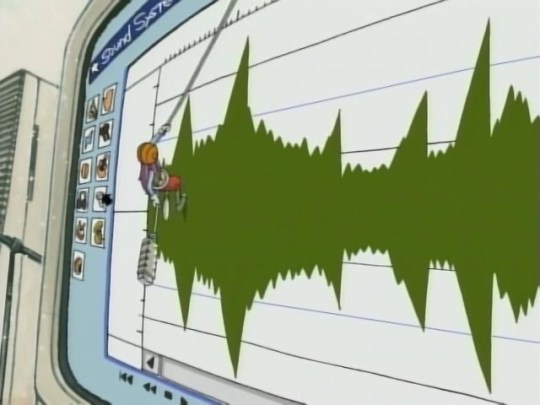
So, moving on with the series! The Giga House incident in episodes 28-29 is the first time the group works together in an organized effort, which is notable not only because it’s their first time coordinating with Ken, but also because it’s their first time properly coordinating at all. Remember when I mentioned that, back in episode 19, as much as the kids were pretty fond of each other and were great friends, they still hadn’t figured out how to actually fight as a team? Here we are, with them actually having started to figure that process out.
We then get to episode 30, where there’s actually quite a lot of interesting things to unpack.
Miyako: What's wrong with you?
Daisuke: E-Eh? Mi-Miyako-san?
Miyako: It feels weird when you add the "-san".
Daisuke: Shut up! Man, you're all the same!
Miyako and Daisuke’s relationship is often misconstrued considering that they’re the two most chaotic in the group (their temperaments are very similar at times, which causes them a lot of friction), but I also think this blink-and-you’ll-miss it moment is pretty much their actual relationship in a nutshell. They fight a lot, and they’re ostensibly vitriolic, but they’re actually two of the most like-minded in the group -- they banter because they’re comfortable with each other. Recall that I mentioned that Daisuke is normally respectful with his elders, yet he’s the only person in the group who won’t use the -san honorific on Miyako (even though she’s the oldest)...but the one time he gets flustered and uses it on her, she tells him that it’s weird and he needs to cut that out. Or, in other words, “it’s not like you to be weirdly respectful of me like that, we shouldn’t have that kind of distance between us, stop it.”
(It’s also pretty notable that Miyako has never seriously used -kun or any other honorific on Daisuke, even right after meeting him -- the only other person she dropped honorifics on was Iori, whom she’d known prior to the start of the series, but she seems to have deemed Daisuke enough of a fellow disaster child that he merited dropping it.)
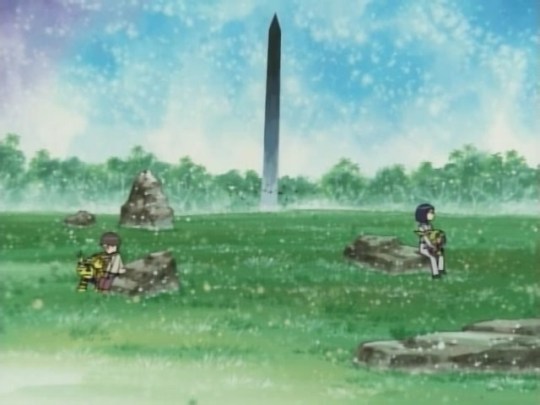
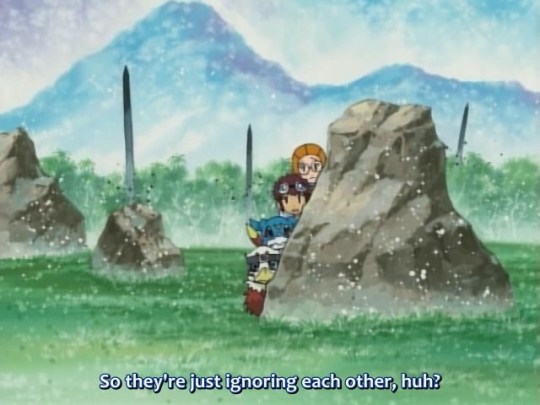
This is especially because, right after that, she recruits Daisuke into her plan to get Ken and Iori to get along -- in the end, when things really get serious, the two are incredibly like-minded (look at how in-sync they are when they scheme together).
30 is actually a surprisingly Miyako-centric episode, despite not ostensibly being one. For one, it says a lot that right now, her biggest priority is to get Ken and Iori to get along -- something that has absolutely nothing to do with herself. In episode 14, Miyako freely admitted that she had a tendency to jump to conclusions about people, and that she was shallow about aesthetics, but this is a very different Miyako from the one who harassed Daisuke for Ken’s autograph in episode 8, or immediately became distrusting of Digitamamon in episode 14. Instead, she’s simply just genuinely invested in seeing people she considers friends get along, and in a selfless manner -- one that has nothing to do with herself. She just really, really cares, a lot.
After all of the first-half hubbub of Miyako really having no idea of what to do with her emotions, the second half has her start channeling that energy into what’s always been one of her biggest strengths: checking on, connecting with, and caring about her friends. Daisuke may be an aggressive forward-thinker who can push everyone in the right direction, but unlike his predecessor Taichi, he doesn’t actually have particular charisma or leadership skills that can necessarily hold everyone together. In the absence of that ability, Miyako fills in for him, checking on the moods and feelings on everyone in the team and making sure everyone’s doing well. And that’s why she loses her temper and slaps Ken late in the episode -- because, really, she’s reached her limit on her “give him space” philosophy when he’s abusing it to be standoffish in a crisis situation, and, on top of that, she really, really did have a huge emotional investment in him.
Moving onto more Miyako in episode 31, her Jogress episode with Hikari, we get to see a little bit of the old emotionally compromised Miyako again, but -- much like the second Digimentals arc -- it involves the two of them acknowledging that both of them are not going about things the best way, and that there are things they can learn from the other.
Hikari: Miyako-san, you're a handful sometimes.
Miyako: I knew that's what you thought of me...
Hikari: But...I've always envied that.
Miyako: Huh?
Hikari: Because I can't be honest and say I'm scared or scream like you.
Miyako’s tendency to lose control emotionally results in her being insensitive much of the time, which she calls herself out on multiple times during the episode, and she can’t always be as “kind” as Hikari is -- but, on the flip side, her antics are something that can be a “light” (pun not intended) towards those who are falling in a bad mental state or into the darkness, and Hikari even acknowledges this when one of her trains of thought makes her break out into laughter. Miyako ultimately manages to get through to Hikari this way at the end of the episode, which results in a Jogress and mutual growth for both of them -- Miyako puts more thought into how to approach others (it’s pointed out at the end that she’s still thinking about understanding Ken and Hikari better), and Hikari gains more resolve and determination to fight against things instead of passively accepting her fate (she tells Takeru very directly at the end "I’m fine now. I’ll never go there again.”).
Iori and Takeru's Jogress is a little more complicated to the point where it spans multiple episodes, but a lot of it ends up having to do with the fact that the events of the BlackWarGreymon arc start really putting Iori's black-and-white principles into conflict -- it's wrong to kill something that's been proven to be alive, but it's also wrong to be evil. Putting a huge nail in that is that there's a stake in him forming a relationship with Takeru, but he doesn't really understand Takeru either -- the "two-facedness" he witnessed back in episode 19 scares even him, and he's so intimidated by Takeru that, in episode 35, he goes to approach Yamato about Takeru's past instead of asking the person directly. Takeru, hearing about this, complains that he could have just asked directly, but admits he understands why Iori did so.
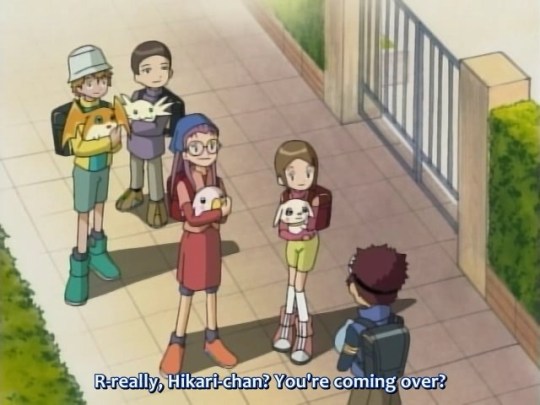
By the way, I should point out that episode 35 is the last time within the TV series that Daisuke is portrayed as having a particular interest in Hikari, and it’s just in terms of being slightly more excited that Hikari is joining his meeting. At this point, there are actual important things happening in the Digital World, and he needs to take care of Ken, too, and so...in the end, once again, Daisuke proves that he’s actually capable of putting aside those kinds of more shallow things when he really needs to.
On top of that, this is when the kids start actively working with Ken in the real world (and, if post-02 materials are any indication, continue to hang out with him even for social outings). The choice to have Ken live in Tamachi instead of Odaiba facilitated his isolation from the group during the Kaiser arc, and during around the third quarter they were all grouping up in the Digital World anyway, but the fourth quarter actually has the kids make an attempt to include Ken in their real-world outings despite the distance. Tamachi is not temporally far from Odaiba (approximately half an hour by train), but it’s a bit of a nuisance to get to, requiring crossing a bridge to/from the Tokyo mainland and paying extra for the Yurikamome. But at this point, he’s an important enough friend to them -- and them important enough friends to him -- that they’ll make it work.
At the end of episode 35, Iori finally decides -- to the point of recklessness, something that would have been previously very uncharacteristic of him -- to try and appeal directly to BlackWarGreymon to get him to stop destroying the Holy Stones so that they won’t have to fight. It’s emblematic of Iori’s heart being genuinely torn, because he’s having such a difficult time rationalizing all of these conflicting feelings. This comes to a head in episode 36, when Iori loses his temper at the rest of the group for “playing around”, but Armadimon snaps him back to reality to remind him that they’re tired and hungry, and this can’t be neglected. Iori himself ultimately becomes the one to proactively suggest that they take time to sit down and eat, indicating that -- little by little -- he’s starting to shift his thinking a bit, after being so incredibly stubborn for much of the series.
This is what leads to Iori and Takeru’s Jogress at the end of the episode, now that Iori is flexible enough in thinking to understand the emotional id behind Takeru’s mentality. And likewise, Takeru’s started to loosen up by 36, too --
Takeru: Sure, darkness is frightening, and we would feel at ease if we could get rid of it completely, but I'm sure that's impossible.
Ken: Impossible?
Takeru: Where there's light, there's always darkness.
Hikari: The brighter the light, the darker the shadow, right?
Takeru: Yes. That's why I think it's important not to lose sight of the light inside you, no matter how dark it is.
The thing about Takeru is that while he deceptively seemed more open and playful than Hikari for most of the series, he was actually bottling up a lot of emotions in a way not entirely different from the way she did. (Note how, despite how tied at the hip the two constantly are, they almost never actually talk about their thoughts on each other; it feels like a relationship where they implicitly trust each other but are practically reliant on that implicit trust to maintain that close of a friendship at all.) And he’s been keeping those emotions bottled up until they exploded in less-than-healthy ways, initially distancing himself from Iori. But being a lot more open about his thoughts on the matter allowed them to connect better, and eventually Takeru came to embrace a somewhat more reasonable stance on the matter after observing Iori.
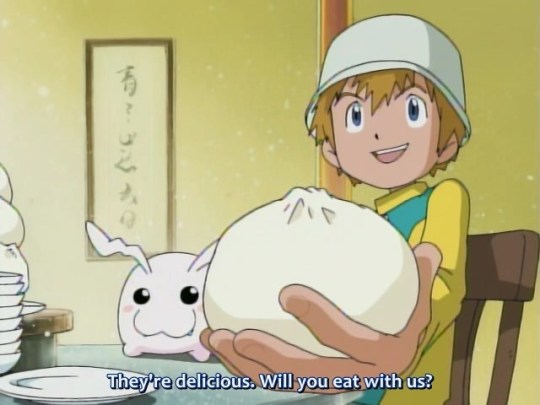
It also doesn’t seem like coincidence that this is the episode that ends with Takeru’s first major act of goodwill towards Ken.
This leads into episode 38, the Christmas episode. Fun things to note!
The episode opens with Daisuke and the other younger kids giving a “Christmas present” to their seniors in the form of letting them reunite with their partners. Remember how I said that the 02 kids always admired their seniors and looked up to them? Even this late in the series, the series does not shy away from the fact you’re supposed to see the 02 kids as their deferential juniors.
The Christmas party is, of course, notably, the first major moment of reconciliation between Iori and Ken, with Iori having gone through major harsh lessons about morality in the last few episodes, and Ken opening up more to the rest of the group. Said party is also yet another notable example of how much of a priority it is for the 02 kids to be “social life friends” and not just friends working as a Digimon incident team -- after all, having genuinely emotionally present friends is what Ken needs most in his life right now, considering that the party is treated as the first time he’s been truly happy in a long while.
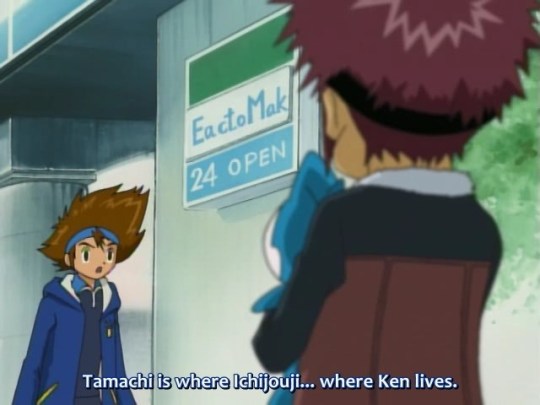
This is followed by episode 39, which is notable as the time when Daisuke finally commits to switching to given-name basis for Ken, and actually opens the episode standing against Taichi -- because he's so worried about Ken that he needs to go join him. This is something that's lost a bit in translation, but although Daisuke stands down against Taichi, he's not rude nor does he overstep his boundaries with his respected senior (he even opens his statement in polite-form Japanese) -- he's just saying, firmly and politely, "I'm sorry, but I can't go, I have to go help my friend." It’s a notable moment because while Daisuke has been becoming increasingly assertive and aware of what he really wants to do, this is the first time we’re actually seeing him refuse to defer to the very senior he’d spent so much of the series idolizing and looking up to.
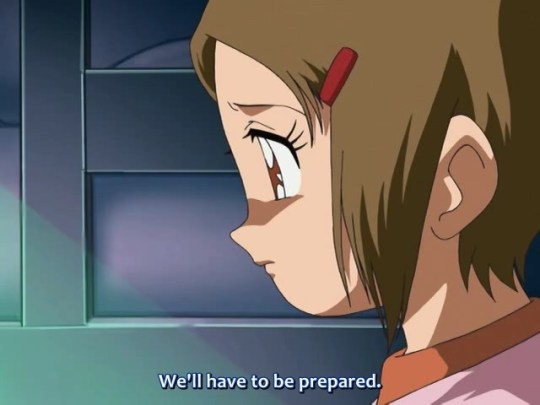
We get to episodes 43-45 (the Demon mini-arc), which is also the culmination of the 02 kids having to face the limits of pacifism. This tends to throw off people who are coming in from Adventure, since the Adventure kids ended up killing Digimon with a lot more ease in the original series, but it’s also important to make note of the fact that the episode itself deliberately portrays a gap in mentality between the Adventure and the 02 kids -- with Hikari torn between the two. It also creates an interesting subversion of expectations when Hikari, the one you’d expect to be more on the pacifist side, is the one who’s already accepted that it may be inevitable, whereas Miyako, the more aggressive and belligerent one, is the one staunchly against it.
The reason for this “paradox” comes out of a single line from Hikari in episode 44:
Hikari: You’re the one who saved him, Miyako-san.
The Adventure kids never liked killing. They were never enthusiastic about it -- it was just that they were almost immediately put in a situation where the entire fate of the multiverse was at stake thanks to some unambiguously evil Digimon who wanted nothing but wanton destruction. Even then, it was pretty clear that they never enjoyed it -- Takeru professed a desire to avoid fighting in Adventure episode 12, and the pacifist Mimi went through a breakdown in Adventure episodes 45-50 trying to avoid casualties. But one of the most important lessons Mimi learned at the time was that pacifism has its limits -- there’s no point if it ends up in more deaths than it saves, because at that point you’re adhering to moralistic principles more than you’re actually saving lives.
The fact that the Adventure kids and the 02 kids have a “different mentality” isn’t just happenstance, but outright embraced. Daisuke, Miyako, and Iori never had to actually deal with a conscious Digimon that was unambiguously evil for most of the series, and Archnemon revealing that her motives were pretty much nothing but wanton destruction in episode 29 was the first major warning signal to Iori that his pacifism might have limits. And during this Demon mini-arc, it’s not like these Digimon are threatening multiverse destruction or anything -- it really does seem like a constant “glimmer of hope” that maybe, just maybe, they can save people non-lethally. Alas, they can’t.
Daisuke, being someone who’s inherently practical-minded, starts entertaining the idea that push may come to shove as early as episode 25, and finally makes his first statement about practical limits in episode 43. But the more emotionally caught-up Miyako and Iori end up taking another episode to swallow it, and they don’t take it well. Most of the attention in 44 is given to Miyako, and it reconfirms that, despite her aggressive exterior, she’s emotionally sensitive and empathetic -- and while killing LadyDevimon is framed as truly the only thing that could have been done in that situation, Miyako is not faulted for being emotionally compromised, nor is Iori likewise when he faces a similar situation with Takeru and is forced to confront the people whose lives were at stake.
Episode 45, when Ken opens the gate to the Dark Ocean, doesn’t really have much to add on top of what’s already there, but this is basically “the point of no return” when everyone confirms their own emotional investment in Ken and understanding that he’s not just reformed, he’s genuinely struggling under the pain of what’s been happening -- and this is before they find out about the truth behind the Dark Seeds, and that Ken’s transformation into the Kaiser may have been supernaturally influenced, too.
It’s also interesting to see the different ways each kid reacts to Ken as they support him:
Hikari, the most outwardly compassionate, goes to support him the second she notices him in physical pain; Takeru notices that it might work, realizes Ken needs the support, and joins.
Iori and Miyako reflect on how Ken’s putting all of his efforts in, and lambast themselves before joining. Interestingly, given the circumstances behind what’s happened up until now, Iori and Miyako criticizing themselves take a different meaning -- Iori, who’d been scornful of Ken until recently, seems to be regretting that he distrusted him when Ken had been trying so hard, while Miyako, who had been open to him since episode 25, seems to be upset that she’s sitting there and not doing enough when he’s in all of this pain.
And Daisuke, of course, the most “forward-thinking” of them all, gives Ken a speech about what he’s done so far and reminds him that he’s already done more than enough for “atonement” -- which is, of course, what directly reaches Ken the most.
And when we get to episode 46, and the kids, now knowing about the Dark Seeds, hold a roundtable (and emotional support group) to discuss what to do about the Dark Seeds, Daisuke’s the one with the most spirit and energy about it, but...
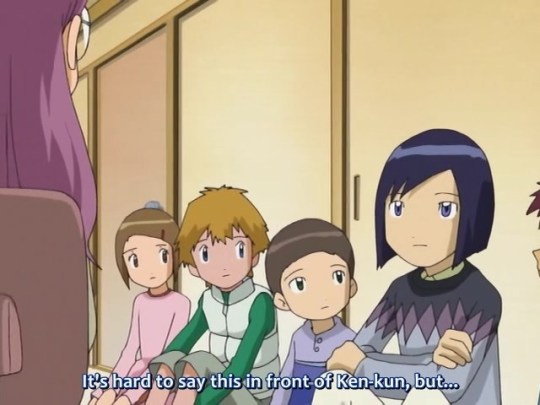
...the one actually leading the roundtable? Miyako.
Miyako: Sorry, that's all I can think of.
Ken: Please don't worry about me.
Miyako: (nods)
It’s subtle, but the scene in question does actually make a deliberate move in indicating that Miyako’s continuing to channel her emotional sensitivity and desire to go out of her way to help Ken -- of course, they all know how traumatic this is for him, but she’s the one who’s actively calling attention to how he must feel about it first and foremost.
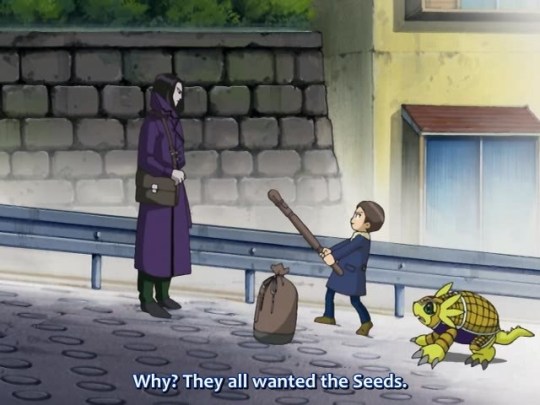
Episodes 47 and after end up becoming yet another major wake-up call for Iori (seriously, I do not understand why people claim he had no character arc when this wasn’t even remotely subtle) when he learns that Oikawa, whom he’d pinned as “evil”, has a deep relationship with the father he’d grown up idolizing so much, and it completely flips his world around -- even though he had started to get a bit more open-minded, he’s still trying to rationalize what should have been, in his mind, two diametrically opposite things. It fuels his confusion and desperate desire to understand more, not just about Oikawa, but about everything he’d thought about morality and why people turn to evil.
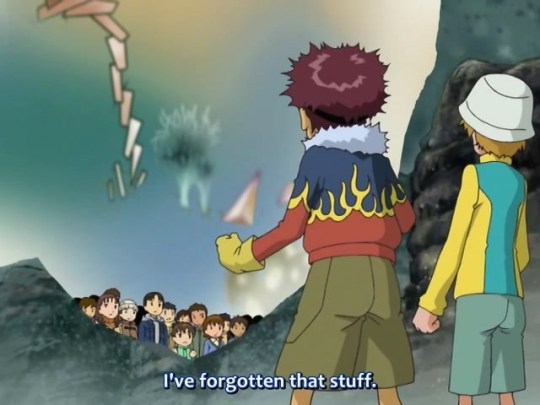
So we get to the final arc of the series, and it involves a confrontation with BelialVamdemon -- but said finale is heavily dependent on talking to the Dark Seed children and inspiring hope back into them. This results in a conversation where everyone talks about their career dreams, and Daisuke admits that he wants to be...a ramen chef, which completely blindsides even his friends.
What’s with this arc?, you might think. And moreover, why is Daisuke ending the series still kind of an idiot? Even Miyako still seems to be a bit of a mess and chaotic. Weren’t they supposed to be growing into dignified heroes, like Taichi and his friends were last series?
Well, here’s the thing -- the fact that the 02 kids end the series comparatively “undignified” is actually very inherent to the core theme of 02 itself. There were more than enough episodes that established that said kids are heroic in their own way -- caring about others, fighting on others’ behalf, and learning important lessons about what’s important to fight about. That doesn’t mean they don’t get the right to continue being disaster children while they’re at it.
Why?
Let’s look at a few official statements behind the creation and intent behind 02 as a series. From producer Seki Hiromi, from the Digimon Animation Chronicle:
That came from an idea I had while reading a newspaper article. I read a story about a nine-year-old boy going to Columbia University, and I thought, “This boy is going to college because he’s considered a genius, and everyone around him will be in their twenties, and he won’t get to have any friends his age. What kind of life would this boy end up having?”
Or some very interesting statements from head writer Yoshimura Genki from the 02 Blu-ray box:
When I was writing Ken Ichijouji, the main idea for him I used as a basis was the conflict between “the self that has to be a well-behaved child when adults are watching” and “being able to be oneself”, and the pain that came from it as a result.
So for instance, in the same way as the Pinnocchio fairytale, or the short story A.I. that was adapted into a movie, or many other works, there are probably universal worries that all children feel as they grow, but also, there were ongoing unimaginable, atrocious incidents happening with children at the time, and perhaps it was those social conditions that gave me a hint on what to do. I think I had some thoughts that I wanted to convey to the children who were living through that time.
I was given the opportunity to put those kinds of feelings, as much as I liked, into episode 23, and I am truly grateful to all of the staff, including the director.
...
Also, this is about Daisuke’s character, but I believe I paid particular attention to making him “a child who could be himself”.
He has no special talents, and although he’s clumsy and scatterbrained, I wanted him to be someone whose strength was in his straightforwardness, and wrote him that way.
Lying underneath the entirety of 02 itself is a theme about “children who are not allowed to be children”. Or, in other words, the pressure placed on children to be “talented” and “dignified” and “well-behaved”, often imposed on them by well-meaning parents who are unfortunately taking the opportunity to stroke their own ego, robbing them of the happiness and mental freedoms they should have as kids.
Ichijouji Osamu and Ken, who were placed under the pressure to be “genius children” and cracked under the pressure to please their parents. Oikawa Yukio, who was cut off from the Digital World in childhood by a well-meaning Hida Chikara, worried about his son getting into “foolish” talk. The Dark Seed children, who also fell victim to similar pressures that Ken did, and lost hope for life unless they could force themselves into that mold.
Takeru: If you want the Digimon to exist, if you believe in that, they will. Just like our feelings...Just like every child having the power to make their dreams come true.
Keiko: That's just childish.
Daisuke: You all have dreams for the future, don't you?
Noriko: Dreams for the future?
Takashi: I've forgotten that stuff.
Daisuke: No way! You must have one!
Takeru: It's nothing to be ashamed of.
Takashi: Then, what's your dream?
Daisuke: Mine? Mine's a ramen shop. I love ramen! I'll become the world's best ramen maker!
Ken: I had no idea...
Noriko: Well...actually, I wanted to be a kindergarten teacher.
Hikari: Me too.
Daisuke: What about you guys?
Takashi: A baseball player!
Keiko: I really want to be a pastry chef.
Hiroshi: When I said I wanted to be a manga artist, everyone laughed, so I gave up...
Takashi: We all had aspirations, and at some point we thought that wasn't allowed...But we were wrong, right?
Daisuke: Let people say whatever they want!
Noriko: You're right, we should be free to dream.
Miyako: Not just dreaming. If you work hard, your dreams will surely come true!
Notice something about all of these careers mentioned? They’re all the kind of “overly childish” “wild dream” “undignified” “too simple” kinds of dreams that an average parent might be uncomfortably quick to shoot down because that’s “not good enough”. These are the kids who willingly accepted the Dark Seeds; they, much like Ken, probably grew up under parents who prioritized school performance and other “societally dignified” things that ended up eating away at their happiness.
02 has a lot of different themes, but the one that lies in its undercurrent from start to finish is “so why does a child have to be this way? As long as they still understand what’s important, do they have to be dignified people? Why can’t they just be free to have dreams and be themselves?” And Daisuke and his friends are there specifically to stand up against this mentality, and to remind Ken and the other victims of it that it doesn’t have to be this way -- that it’s okay to be your true self, and be a child, and not succumb to all of those arbitrary, shallow standards people put on you. Even if that means you’re still a bit of a chaotic disaster at the tender age of eleven.
Digimon, in the Adventure and 02 universe, have always been treated like a part of the self (they were literally conceived as a physical manifestation of the soul), but in 02 they gain an extra meaning of representing “the inner, deepest part of yourself that represents your wildest ‘childish’ dreams”. The symbolism of Ken spending the first half of the series trying to reject Wormmon for being “weak” -- in other words, rejecting his own kind-hearted self for not being the kind of “strong” entity he was pressured and groomed into being -- is not lost, nor that of the Dark Seed children gaining partners when they reconnect with their dreams and wishes, nor Oikawa finally, finally meeting his partner when he comes into contact with the past he’d really lost (and especially not the fact that his attempt to reclaim shallow reminders of said childhood involved trying to make his own Digimon).
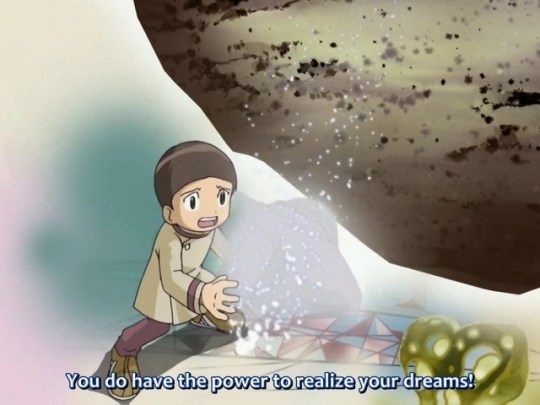
And notably, the series’s finale (prior to the epilogue) ends not on Daisuke but on Iori, escorting Oikawa to the Digital World despite how completely impossible it would have been for early-series Iori to even entertain the idea, finally coming to truly understand what happened with him and being most personally impacted by his death.
But in any case, where are we with the characters? We’re here to talk about how they’ve grown and developed over the course of the series. Let’s recap:
Daisuke: Started off the series as an abrasive kid with more bark than actual bite, constantly deferring to others and easily deflating, relying on shallow sources of validation like wanting attention from Hikari; gradually gained an ability to identify what was important and put his foot down for it, embraced his forward-thinkingness to reach out to a heavily troubled child as a friend, and ended up surrounded by a friend group that loves and respects him.
Miyako: Started off the series as a shallow, flighty girl with poor control over her emotions and difficulty in appreciating the gravity of things; came to channel her emotional range into empathy for others and compassion, bringing other people together and taking care of them.
Iori: Started off the series as a straight-laced but too principled child who stuck to “rules of what’s right” not only in morality but also in way of acting; started to appreciate the emotional nuances and heart behind why people do what they do and how it’s possible to be more flexible in “doing good”.
Ken: Well, his character arc is pretty obvious, but -- again, while his arc of learning to forgive himself is well-known, less often pointed out is that it centers very heavily on not only having penance but also not being too hung up on the past, and the futility of drowning in self-pity and regret instead of choosing to take responsibility and act more productively going forward.
Takeru: Started off the series as a seemingly mature but deceptively inscrutable character whose duality made him hard to approach; eventually opened up with the help of others and showed a capacity for being more flexible with his personal grudges.
Hikari: Started off the series emotionally repressive and passive to the point of self-destruction; eventually embraced connections with her other friends and became more active in taking a stand for herself.
Hey, not bad!
And, again, this is not a series you should be reading in terms of “self-awareness” in the same way Adventure was, but in the sense of their “relationships” and how they interact with others. By being less abrasive and more assertive, Daisuke gained the respect of his other friends. By putting her emotional capacity into caring about others, Miyako became someone who holds the group together. By learning to think a little more flexibly and be less stubborn, Iori arrived at a position where he could more easily sympathize with others in the group. Takeru and Hikari both moved from their previously relatively inscrutable positions to ones who could more effectively interact with and open up to others. And Ken, of course, became someone who managed to integrate himself into a group of true “friends” despite everything he had done against them in the first half.
This, in the end, is how you get what’s one of the tightest friend groups in Digimon history. In the end, the relationships themselves are almost like characters of their own that got development -- I say very often that you could take two of the characters and have an excellent scope of how they’d interact and play off each other by the end of the series. And although they end the series as possibly one of the most shameless, undignified disaster groups out there...they’re certainly still heroic, and in any case, given the lessons they learned throughout their own series, they probably wouldn’t have it any other way.
248 notes
·
View notes
Note
“Perhaps, I killed a Jedi and took it from him.” Clumsy fingers beneath sleek synth leather gloves close over the hilt, the silver of it glinting merrily in the grasp of a cold fist. “Impossible,” Lord Vader says. “I am growing tired of your games, boy. I shall only ask once more: who gave it to you?” “I cannot say,” he replies. “Cannot?” says Vader. “Or will not?” “I will not.” His voice is firm, and does not shake. He reaches again for that serenity: a flash of copper hair, [...] of blue eyes.
This is for the writer’s ask where you ask about 500 characters of one of my fics, and I do a deep dive analysis! <3 Thank you for indulging me.
Alright! Better late than never but I’ve been overthinking this because I DO SO LOVE process and meta! So let’s dive in. The commentary.
First of all, let me say that I am a huge proponent of Korkie Kenobi - and yeah, I’d love to see it canonised - but I think my relationship with this character is a bit more nuanced than people give me credit for.
I was all for arospec/acespec Obi-Wan. That’s the canon I loved. And I was very much not interested in Satine when she first appeared in TCW. But the thing was, once it happened, once they introduced a love interest who played a significant enough role in the story, I felt I could either ignore it...or roll with it. See what it changed. See what it created.
Obviously, the relationship - on a surface level (and tbh probably the only level which the writers considered) is meant to mirror Anakin and Padme. They are the road not taken. Where Anakin and Padme chose each other, Obi-Wan and Satine chose their duties.
This is a...I don’t like this take as an exclusive one, and here’s why: it implies that Padme was also selfish, and made the wrong choice. And yet everything in canon tells us the opposite. She continued working. She jeopardised her career and her reputation to fight against the rise of the Empire. She gave her life trying to prevent it. To put her as a direct mirror of Satine is messy, and to me, cannot justify the creation of Satine enough to convince me.
But I also don’t want to throw away such a huge chunk of TCW narrative. So the other option is to reaaaaaaaaaaaaaaaaaaally lean in.
At which point, you have to examine not just the immediate symbolism of the relationship, but what each character individually brings. You have to give Satine her own agency. She has to become her own person. Suddenly, all the little bits of information that would normally be overlooked become important. We get so little of her, that everything becomes significant.
And Korkie - who hangs around for a couple episodes, but otherwise has no real importance, suddenly becomes significant.
And that, for me, is the crux of the issue. I hate, hate, hate wasted story elements, and if Korkie is so superfluous as to be negligible, then why did we waste not just money, and time, but story on him. And if he is unimportant, then his relationship to Satine is unimportant. And if that relationship is insignificant, then we lose something integral and revealing about Satine, and now suddenly there is less of her to relate to Obi-Wan, and so anything revealed about him becomes less important, too.
Maybe this feels like a stretch, and maybe it is, but to me, Korkie feels very much like Chekhov’s gun.
And it would drive me CRAZY if he were to go unexamined, and unused.
So this whole story was an examination of “What does Korkie tell us about Obi-Wan that we didn’t know before? And what can Korkie tell us about Vader?”
Because what is Vader if not Obi-Wan’s Fallen son?
This was essentially the thesis for this piece: despite the fact that Vader/Anakin had all of Obi-Wan’s attention, love, and time it is Korkie who truly embodies the legacy of his father.
And while I know that “found family” is a massively important part in the SW universe, I think there’s a larger discussion to be had about other aspects of family. The answer isn’t always that Blood is Bad, and that heritage is shameful or unimportant. Sometimes, where you came from does matter. Some people do find strength, and pride, and hope, and motivation, and support in their origins - even if it’s something they’re divorced from in a physical or temporal way.
For me, Korkie is an opportunity to examine a father/son relationship where neither of the two people have an attachment beyond blood, but -
There is still one of love.
But instead of Anakin’s selfish, possessive love for his family, both Obi-Wan and Korkie relate to each other, and treat each other with empathy, compassion, and respect. Their love is noble. Selfless. They put entire worlds before each other. And Korkie learned that from his dad.
A personal pet peeve is this constant depiction of kids whose parents are in high stakes jobs feeling neglected or abandoned. How many cop shows have bratty kids acting out because their dad is never home to share dinner? How many medical dramas show the children of doctors lashing out because mom spends more time at work than at ballet class?
It drives me crazy.
As the child of a medical worker with an on-call schedule, I can say that neither I, nor my siblings, nor any of the other children of my mum’s coworkers have EVER felt neglected. We have never felt unfairly or selfishly entitled to our parents’ time. Because we knew - because someone (another parent? A grandparent? A teacher?) explained to us, and taught us at a young age that what our parents were doing was important. We understood that there were life or death stakes, and that we were very loved, and very much the priority - just not every second. Because sometimes, a life was on the line.
And Obi-Wan Kenobi was fighting to save a galaxy.
I just cannot in any way believe that a child whose mother was a ruler of a planet plagued with civil unrest and a significant terrorist group, and whose father was a Jedi Master, and in charge of securing peace and freedom across the stars would ever be so selfish, and so uncompassionate as to begrudge the sacrifice of his parents.
Korkie Kenobi is an abject example of selfless love. The kind of love the Jedi aspire to. The kind of love that Anakin absolutely does not understand, and fails to embrace.
And it’s not because Qui-Gon died (Korkie never had that kind of paternal relationship), and it’s not because Shmi was killed (Korkie’s mother also dies tragically), but because of the maturity of the person, and the quality of Korkie’s character.
So to pit a Korkie just coming into his own as an adult, aware of his father, and recently bereaved of his mother against a Vader just coming into his own as a Sith…
That, to me, evoked very interesting narrative avenues to explore.
In this universe, Korkie and Obi-Wan have recently reconnected (Korkie having helped Boil retrieve Obi-Wan from an ill-advised trip to Mandalore where Obi-Wan learned that Anakin had become Vader for the first time), and they both know what they are to each other. Obi-Wan has begged for forgiveness, and given Korkie his lineage, and his legacy in the form of Qui-Gon’s lightsaber - something that Anakin never got. Vader wants it.
So let’s get into it:
“Perhaps, I killed a Jedi and took it from him.”
This first line - it’s like poetry, it rhymes.
Vader asks where Korkie got the blade, and Korkie replies...in Qui-Gon’s words. He doesn’t know this, of course. It’s just a coincidence. But the remains of Anakin hear it. Anakin recognises it, and it galls him that this boy - Obi-Wan’s replacement of him - seems to be able to claim the lineage he wishes he had. Korkie is stealing his family. And he doesn’t know them. He doesn’t deserve them. He’s not entitled to them the way Anakin is.
And this is also one of the first things Anakin ever heard a Jedi say. This was the beginning of Qui-Gon’s promise. This is a moment in which Anakin first thought he might find salvation. It was the start of his life, in some ways. This was pure, good, and trusting Anakin Skywalker.
It’s an absolute anathema to him, now. Now, when he’s lost everything. When he’s filled with doubt, and hate, and fear, and suffering. It makes him angry. Because he doesn’t want to see that he was Korkie. He doesn’t want to see that he had this chance, and blew it. And Korkie - who never had Qui-Gon, who never had Obi-Wan - can speak the words without even (in Anakin’s mind) earning them.
Also, and most obviously, Anakin killed the Jedi. And yet...he didn’t kill Obi-Wan. He did not kill that Jedi, and take this blade.
Korkie is alive. Obi-Wan is alive. Anakin resents it. Obi-Wan should not exist without him. Obi-Wan should have no legacy but Vader. Because Anakin doesn’t.
Clumsy fingers beneath sleek synth leather gloves close over the hilt, the silver of it glinting merrily in the grasp of a cold fist.
To me, it was important that we see the weakness of Vader. His hands are not his own. The flesh of Anakin Skywalker is gone, and beneath the serenity of the mask, and the shadow of black, he’s fumbling. Korkie’s wrong-footed him, and he feels young, and insufficient in the face of this boy. This is all about Anakin’s insecurity.
Korkie speaking words he shouldn’t know - speaking in the voice of a literal Jedi - so calm, and so collected (negotiating with the serenity of his father) scares Anakin. He’s hearing and seeing the ghosts of the people he betrayed.
And the blade itself is merry because it belongs in the hand of Korkie. It knows (and the narrative knows) that it won’t be long in Vader’s grasp. It transcends the dark. It glints, and is optimistic. It’s a symbol of faith. It’s delight in being claimed by Korkie is symbolic of Qui-Gon’s own approval of his legacy. Qui-Gon Jinn chooses Korkie Kenobi.
But the thing is, it’s not because he’s a Kenobi. It’s because he chooses to act, and speak like a Jedi. Anakin fears - and knows - he never received this blade because Qui-Gon Jinn would not approve of what he’s done. This is Qui-Gon’s repudiation of Anakin Skywalker. The blade is laughing at Anakin.
“Impossible,” Lord Vader says. “I am growing tired of your games, boy. I shall only ask once more: who gave it to you?”
And then Anakin answers the same way he did as a child. He is still a selfish, defiant, fearful child. He denies the possibility that Korkie could have killed a Jedi.
Now, of course, he knows that the Jedi are dead, he knows that Korkie is not a Jedi, and he’s also denying the possibility that Korkie could have done it.
And, more than that, he’s denying the very possibility that Korkie could speak - could somehow know - Qui-Gon’s words. There is no way that this boy should be speaking with that voice. It’s impossible.
It’s a three-fold denial.
As a more technical thing, Vader’s voice was really hard for me to do, because this Vader still had to be recognisable as Anakin. He’s only been Vader for about a year at this point, maybe a little longer, and he’s just been thrown back into his childhood by memory, so the voice had to hit this balance point between Anakin and Vader.
This is an Anakin who uses language to build himself up. He doesn’t quite buy his own authority - it is so easily undercut by an unarmed boy, here, after all - so he makes himself sound like the seat of power...Obi-Wan. He mimics the slightly elevated phrasing of his former master, and condescends, calling him “boy”. He speaks to Korkie in the voice of Korkie’s father. But it’s distorted, and clunky because it is not Anakin’s voice to claim. And he hasn’t had all the practice that the next 18 years will provide him with, yet.
So theoretically, if I did it right, the motivation - the drive of the sentence - is Anakin, but the pattern is an echo of Obi-Wan.
I also think this is probably the third time Vader’s asked Korkie (iirc), and that’s just a classic storytelling technique - things, especially questions, lessons, or events, happen three times.
Korkie replies differently every time.
“I cannot say,” he replies.
So, at first, Korkie answered a question with a question. He was brash, young, and openly defiant. He replied in the way that Anakin or Obi-Wan may have if they’d been captured. He asked who Vader was. He didn’t know him - he doesn’t know him.
Vader is his brother, and yet Vader - Anakin - has been erased. His own family doesn’t know him. Has no reason to. He isn’t a person anymore. He’s a monster with no face, no name, no history, and no future. He has no claim to his own past.
Then, when Vader asks again, Korkie asks why it matters.
It’s a slight change of tactic, but one that Korkie thinks might put him on a more even playing field. If he knows why it’s important, then maybe they can work out a deal. Maybe he can...negotiate. Again, Vader hears shades of Obi-Wan’s cunning in this kid’s voice.
It also forces Vader to confront the reason he wants this blade - but that reason is intimately connected to Anakin. So Korkie is humanising him. He’s offering Vader a piece of himself. But Vader won’t take it.
Then, after Korkie’s spoken like Qui-Gon, Vader asks again, and Korkie denies him utterly. He cannot say. It’s impossible. It’s something beyond his control.
“Cannot?” says Vader. “Or will not?”
“I will not.” His voice is firm, and does not shake.
Or is it? Because then, Korkie does what Vader does not. He takes responsibility for his choice. It’s not out of his hands. He’s choosing - deliberately, and decisively - to deny Vader. And he does not flinch. He does not hide. He looks into Vader’s face, knowing he might condemn himself to suffering, and death, and chooses that.
This is Korkie as a Jedi. He makes the same sacrifice the Jedi make - he looks into the Dark and chooses the Light.
And in this instance, he has replaced Anakin because he’s protecting Obi-Wan. Korkie is at Obi-Wan’s back. Korkie is making a choice to shield the person he loves - though he hardly knows him - because it is right. He loves freely, and selflessly. He loves Obi-Wan in a way that Anakin betrayed, but Korkie will not betray Obi-Wan here.
He reaches again for that serenity: a flash of copper hair, of soft robes, of blue eyes.
Korkie Kenobi is Force sensitive. Of course, he is. He is the culmination of a series of Light choices, and selfless sacrifice. He, at the end of the Clone Wars, comes out as the very thing they were fighting for. It’s not lost. Obi-Wan isn’t lost - he still shaped Korkie. He still saved something - something of the Force, something of the Light, and something of himself. He saved Satine. He saved the Jedi. He’s not fought and sacrificed in vain.
And so, though it is still rough, and untrained, though, like his relationship with his father, it’s still new, Korkie instinctively seeks to soothe himself, to find peace, so stay calm. In this moment where he is confronted with a Sith Lord, alone, and unarmed he chooses to reach for peace…
And his peace, his hope, is Obi-Wan Kenobi.
He reaches for his dad.
Just like Obi-Wan reaches out for Qui-Gon’s ghost. Just like Anakin reaches out for Obi-Wan (seriously can’t have one conversation without mentioning him). Just like Luke reaches out for Anakin.
Korkie seeks comfort in the Force through the person he most finds solace in. And it doesn’t matter that he and Obi-Wan are nearly strangers, because they choose not to be. And because Obi-Wan is the ideal that Korkie strives for.
Obi-Wan has taught him something about serenity, and bravery, and hope. So when Korkie thinks of calm, and thinks of making his father proud, he sees Obi-Wan. Just flashes in his memory.
And the colours of Obi-Wan are symbolic - the fire of his hair, the chaos of the galaxy and war, the colour of the sand on Tatooine, the heat of its suns, and the shared blood between them. The blue of his eyes like water in the desert, an oasis, a salvation, an open sea, the clear sky, something vast and all encompassing and cool. The soft robes are an embrace. Obi-Wan is a home in the Force.
(Ironically, this is also what Anakin as Vader thinks of, and is thinking of because he also knows Obi-Wan, and so the next beat of this scene shows Vader and Korkie accidentally sharing thoughts. An easy mistake, as they’re essentially running into each other at the same restaurant!)
ANYWAY -
A, um, brief analysis of this passage from Or Else I Shall Be Lost
I hope you enjoyed it!!! And thank you so much @tree-scapes for tagging me!!!!!
#korkie kenobi#meta#sw fic#obi-wan kenobi#korkie#darth vader#writers#gffa#anakin skywalker#qui-gon jinn
28 notes
·
View notes
Note
opinion on the 3d movies? they’re the only aatc content i’ve ever seen bc i’m a 2000s baby 😔
so my feelings on the live action/cgi movies are complex because like. that first movie is how i discovered aatc, i saw that movie and just fell in love with the chipmunks and counted down the days until the squeakquel came out because i was so excited to see the chipettes on the big screen. as a young kid, i really loved those movies and they’re absolutely the reason that i love alvin and the chipmunks so much today
but the movies Themselves......like okay i completely understand the decision to make the chipmunks like actual chipmunks, this was during the massive influx of live action/cgi movies where “x cartoon character enters the REAL world” so that isn’t a problem. their designs aren’t perfect (their mouths creep me out a little??) and i don’t like how they translated the chipettes to 3D but the designs are not a huge problem, they did a fine job with tweaking the models so that each chipmunk has unique facial features/fur markings that reflect their character
the real problem is just the characterization. im not going to penalize the movies for being immature because like they are aimed at kids and im someone who has a huge aversion to toilet humor/immature humor so i can't judge impartially on that frontier and there’s at least one or two legitimately funny jokes in each movie. jason lee is just an awful dave: he comes off SO uninvested and annoyed in every scene. the movie shows him doing fatherly things like helping the boys decorate for christmas and making them dinner, but this is always accompanied by like a visible reluctance and irritation that is so not dave. he doesn’t even legally adopt them until the FOURTH movie (which, granted, is a sweet scene but seems so odd to do after four whole movies and dave still acting like he doesn’t care that much about them). in every other iteration, dave has no hesitations about taking in the chipmunks and being their father, even when they drive him crazy. its so hard to buy that live action dave actually cares about the chipmunks when every scene tells us otherwise
as for the chipmunks and chipettes themselves....the chipettes are given so little depth, the fact that their most-remembered scene is just them mooning over the chipmunks and talking about how cute they are speaks volumes. i mean they were basically written out of the fourth movie. its obvious the writers wanted to include the chipettes to appeal to female demographics and please fans who like them, then realized they had no use for them and gave them only the most basic of character traits and arcs. its nice that jeanette got a little focus in the third one, but her story was literally built entirely around simon’s story which again. speaks volumes that the chipettes are basically here to fill dead air and serve the chipmunks
as for the chipmunks themselves, i don’t have like a huge problem?? their characterization is a little uneven because they have to still be able to like do funny modern pop songs and crazy things for the trailers. it drives me crazy that they get sent to high school in the second movie when they are so clearly written to be elementary school-aged kids just like the previous iterations. theodore’s the biggest victim of personality generalization, especially in the sequels where he basically exists to be The Baby of the family (him being the heart of thee brothers is actually depicted quite nicely in the first one). simon’s sarcasm is written pretty well, as is his responsible nature, but you lose some of his protective instincts and for some reason a lot of his true intellect?? alvin basically exists to be the franchise mascot, so he doesn’t get to develop in like any way and is always crazy, scheming alvin without much nuance (although they try to have some depth to his character in the third movie, only to immediately backtrack on it and reset the status quo).
i won’t act like aatc is this sacred property that the cgi movies desecrated with childish, gross-out humor that isn’t characteristic of the franchise at all because again, these are movies for kids made during an era where that kind of base-level immaturity was en vogue. but i do think its a shame that they are so formulaic in terms of plot and sacrifice so much character in service of pop songs and Crazy set pieces (also i don’t like the weird sexualization of the chipettes through their single ladies choreography, the “whip my tail” sequence, just a whole lot of their choreography and actions) and of all the aatc iterations, they’re definitely my least favorite and i think their popularity set back the direction of the franchise
#syd squeaks#ask#anonymous#and like!!! I do not begrudge anyone who likes the movies there are little parts of them that i like as well!!#and its honestly always just nice to see the chipmunks like i will be perfectly honest about that#theres just a lot of problems with them that bug me as a huge fan#aatc
10 notes
·
View notes
Text
A white animation student’s take on Soul and POC cartoons
This got long but there’s lots of pretty pictures to go with it.
Hi, I’m Shire and I’m as white as a ripped-off Pegasus prancing on a stolen van. Feel free to add to my post, especially if you are poc. The next generation of animators needs your voice now more than ever.
My opinion doesn’t matter as much here because I’m not part of the people being represented.
But I am part of the people to whom this film is marketed, and as the market, I think I should be Very Aware of what media does to me.
And as the future of animation, I need to do something with what I know.
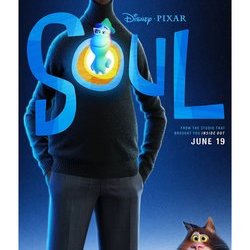
I am very white. I have blue eyes and long blond hair. I’ve seen countless protagonists, love interests, moms, and daughters that look like me. If I saw an animated character that looks like me turn into a creature for the majority of a movie, I would cheer. Bring it on! I have plenty of other representation that tells me I’m great just the way I am, and I don’t need to change to be likable.

The moment Soul’s premise was released, many people of color expressed mistrust and disappointment on social media. Let me catch you up on the plot according to the new (march 2020) trailer. (It’s one of those dumb modern trailers that tells you the entire plot of the movie including the climax; so I recommend only watching half of it)
Our protagonist, Joe Gardner, has a rich (not in the monetary sense) and beautiful life. He has dreams! He wants to join a jazz band! So far his life looks, to me, comforting, amazing, heartfelt, and real. I’m excited to learn about his family and his music.
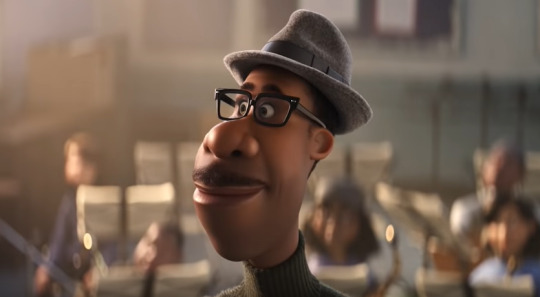
Some Whoknowswhat happens, and he enters a dimension where everyone, himself included, is represented by glowing, blue, vaguely humanoid creatures. They’re adorable! But they sure as heck aren’t brown. The most common response seems to be dread at the idea of the brown human protagonist spending the majority of his screen time as a not-brown, not-human creature.
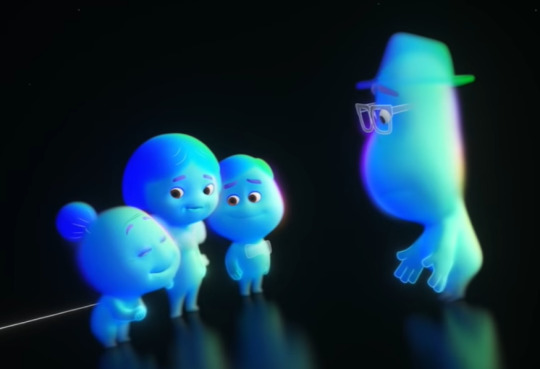
The latest trailer definitely makes that look pretty darn true. He does spend most of the narrative - chronologically - as a blob.
but
That isn’t the same as his screen time.
From the look of the trailer, Joe and his not-yet-born-but-already-tired-of-life soul companion tour Joe’s story in all of its brown-skinned, human-shaped, life-loving glory. The movie is about life, not about magic beans that sing and dance about burping (though I won’t be surprised if that happens too.)
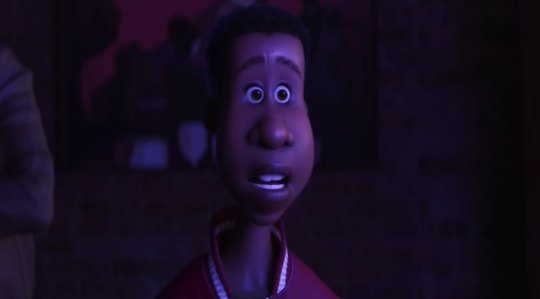
Basically! My conclusion is “it’s not as bad as it looked at first, and it looks like a wonderful story.”
but
That doesn’t mean it’s ok.
Yes, Soul is probably going to be a really important and heartfelt story about life, the goods, the bads, the dreams, and the bonds. That story uses a fun medium to view that life; using bright, candy-bowl colors and a made-up world to draw kids in with their parents trailing behind.
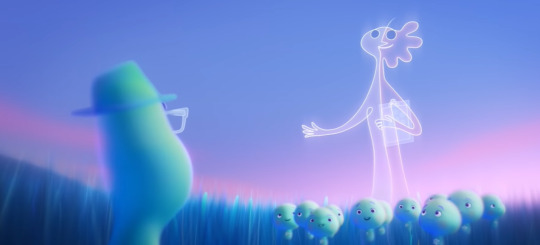
It’s a great story and there’s no reason to not create a black man for the lead role. There’s no reason not to give this story to people of color. It’s not a white story. This is great!
Except...

we’ve kind of

done this

a lot
The Book of Life and Coco also trade in their brown-skinned cast for a no-skinned cast, but I don’t know enough about Mexican culture to say those are bad and I haven't picked up on much pushback to those. There’s more nuance there, I think.
I cut the above pics together to show how the entire ensemble changes along with the protagonist. We can lose entire casts of poc. Emperor's New Groove keeps its cast as mostly human so at least we have Pacha

And while the animals they interact with might be poc-coded, there’s nothing very special or affirming about “animals of color.”
So, Soul.
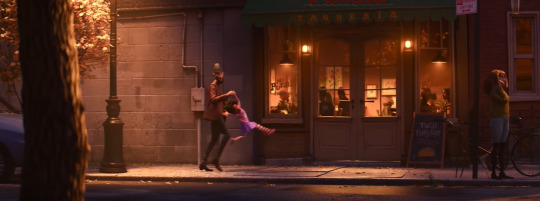
Are we looking at the same thing here?
It’s no secret by now that this is an emerging pattern in animation. But not all poc-starring animated films have this same problem. We have Moana! With deuteragonists (basically co-protagonists) of color, heck yeah.

Aladdin... Pocahontas... The respect those films have for their depicted culture is... an essay for another time. Mulan fits here too. the titular characters’ costars are either white, or blue, and/or straight up animals. But hey, they don’t turn into animals, and neither do the supporting cast/love interests.

Dreamworks’ Home (2015) is also worth mentioning as a poc-led film where the deuteragonist is kind of a purple blob. But the thing I like a lot about Home is that it’s A Nice Story, where there’s no reason for the protagonist to not be poc, so she is poc. Spiderverse has a black lead with a white (or masked, or animal) supporting cast. But, spiderverse also has Miles’ dad, mom, uncle, and Penny Parker.

I’d like to see more of that.
And less of this
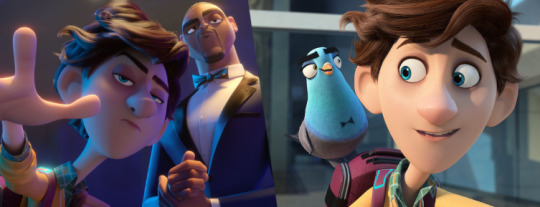
if you’re still having trouble seeing why this is a big deal, let’s try a little what-if scenario.
This goes out to my fellow white girls (including LGBTA white girls, we are not immune to propaganda racism)
imagine for a second you live in a world where animation is dominated to the point of almost total saturation by protagonist after protagonist who are boys/men. You do get the occasional woman-led film, but maybe pretend that 30 to 40 percent of those films are like
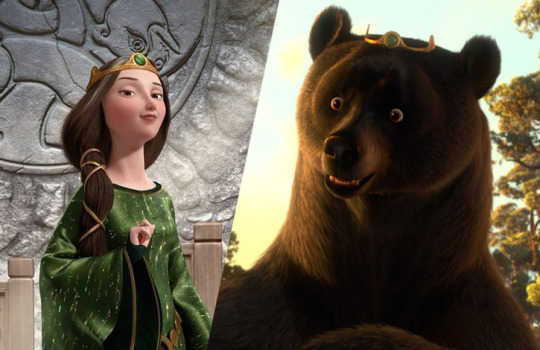
(We’re pretending for a second that Queen Eleanor was the protagonist, because I couldn’t think of any animated movies where the white lady protagonist turns into and stays an animal for the majority of the film)
Or, white boys and men, how would you feel if your most popular and marketable representation was this?
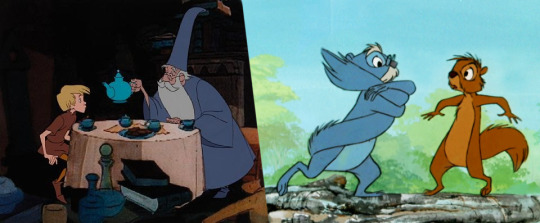
Speaking of gender representation, binary trans and especially nonbinary trans people are hard pressed to find representation of who they are without the added twist of Lizard tails or horns and the hand-waving explanation of “this species doesn’t do gender” But again, that’s a different essay.
Let’s look at what we do have. In reality, we (white people) have so much representation that having a fun twist where we spend most of the movie seeing that person in glimpses between colorful, glittering felt characters that reflect our inner selves is ok.
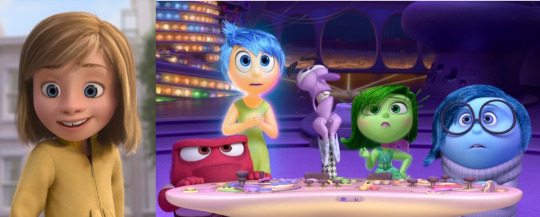
Wait, that aesthetic sounds kind of familiar...

But I digress. Inside Out was a successful and honestly helpful and important movie. I have no doubt in my mind that Soul will meet and surpass it in quality and and in message.
There is nothing wrong with turning your protagonist of color into an animal or blob for most of their own movie.
But it’s part of a larger pattern, and that pattern tells people of color that their skin would be more fun if it was blue, or hairy, or slimy, or something. It’s fine to have films like that because heck yeah it would be fun to be a llama. But it’s also fun to not be a llama. It’s fun to be a human. It’s fun to be yourself. I don’t think children of color are told that enough.

At least, not by mainstream studios.
(The Breadwinner, produced by Cartoon Saloon)
It’s not like all these mainstream poc movies are the result of racist white producers who want us to equate people of color with animals. In fact, most of those movies these days have people of color very high up, as directors, writers, or at the very least, a pool of consultants of color.
These movies aren’t evil. They aren’t even that intrinsically racist (Pocahontas can go take a hike and rethink its life, but we knew that.) It’s that we need more than just the shape-shifting narratives of our non-white protagonists.
It’s not like there isn’t an enormous pool of ideas, talent, visions and scripts already written and waiting to be produced. There is.
But they somehow don’t make it past the head executives, way above any creative team, who make the decisions, aiming not for top-of-the-line stories, but for the Bottom line of sales.

When Disney acquired Pixar, their main takeover was in the merchandising department. The main target for their merchandise are, honestly, white children.
So is it much of a surprise
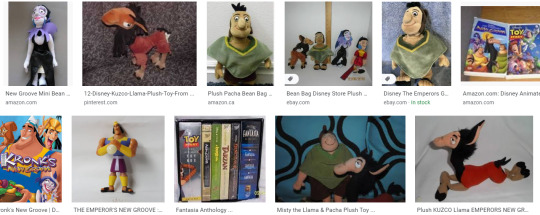
that they are more often greenlighting things palatable for as many “discerning” mothers as possible?
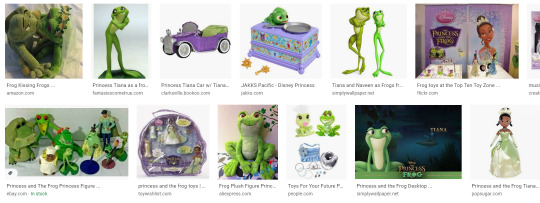
I saw just as many Tiana dolls as frog toys on the front page of google, so don’t worry too much about The Princess And The Frog. Kids love her. But I didn’t find any human figures of Kenai from Brother Bear, except for dolls wearing a bear suit.
So. What do I think of Soul?

I think it’s going to be beautiful. I think it’s going to be a great movie.
But I also think people of color deserve more.
Let’s take one more look at the top people who went into making this movie.

Of the six people listed here, five are white. Kemp Powers, one of the screenplay writers, is black.
It’s cool to see women reaching power within the animation industry, but this post isn’t about us.
We need to replace the top execs and get more projects greenlit that send the message that african, asian, latinix, middle eastern, and every other non-white ethnicity is perfect and relatable as the humans they were meant to be.
Disney is big enough that they can - and therefore should - take risks and produce movies that aren’t as “marketable” simply because art needs to be made. People need to be loved.
Come on, millennials and Gen Z. We can do better.
We Will do better.
TLDR: A lot of mainstream animation turns its protagonists of color into animals or other creatures. I (white) don’t think that’s a bad thing, except for the fact that we don’t get enough poc movies that AREN’T weird. Support Soul; it’s not going to be as bad as you think. It’s probably gonna be really good. Let’s make more good movies about people of color that stay PEOPLE of color.
176 notes
·
View notes
Text
The difference between how Miles handles his charter school and how MCU Peter handles it
First, I would be remissed if I didn’t highlight the history of charter schools. Charter schools were used to force Native American children to assimilate into white culture and strip them of their indigenous cultural identity. Now and days, charter schools or boarding schools are used to allow rich and predominantly white kids as a way out of school integration. Rich kids don’t want to pay for poor people schools so they take their kids out and put them in rich people schools. So Charter schools are a very racial and very class based thing.
So I find it strange how both Spider-men deal with charter schools with both kids attending under vastly different circumstances.
MCU Peter treats charter schools like it is damn near propaganda from Betsy Devos. It is suspect that Peter Parker, a poor Jewish white kid from Queens, would be granted a scholarship to some rich charter or even attend one when the bulk of Peter’s bullying in school came from an American public school perspective. Flash was an American jock who was abused by his car dealer salesman dad. Liz Allen was a snobby cheerleader. The narrative becomes disjointed when you make Flash a rich minority who was snubbed by Peter in consideration of a debate team(showing that Flash is smart but not smarter than Peter). This school can also afford trips to Europe and etc which is atypical from the normal high school experience.
Homecoming is like one of those stock photos that advocates of Charter schools would use as a justification for them.
I am going to tag @traincat because they have a lot more to say about how Peter’s school experience is less about him being a shy nerd and more about him being Jewish.
Anyways...
Miles Morales however takes a completely different approach. His experience with his charter school or the idea of them is more of an indictment of the American education system.
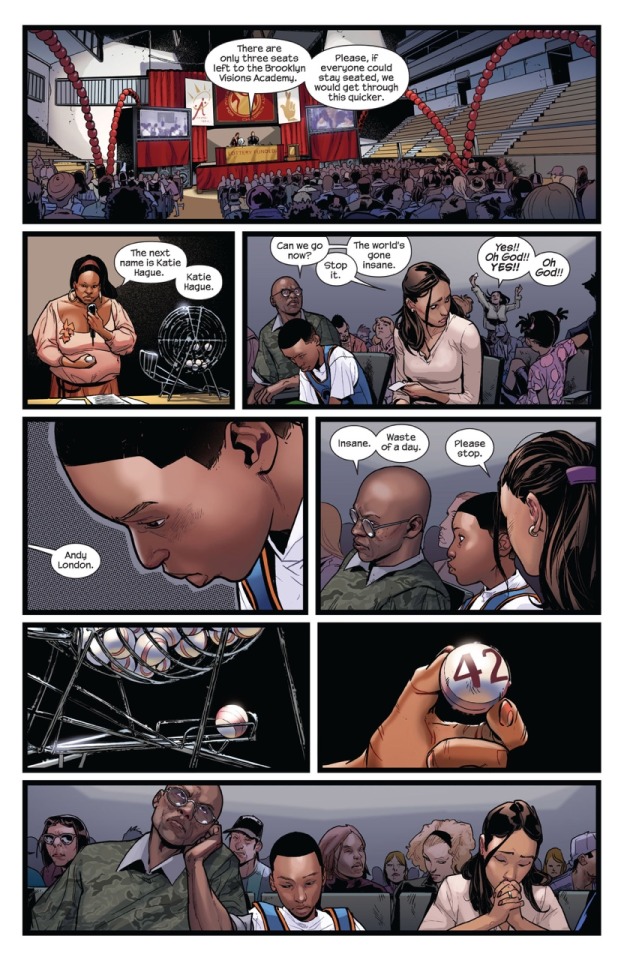
On the onset, the idea that Miles has to enter a lottery to be able to enter this school while testing high enough proving that he certainly intelligent shows the financial inequality of the American education system. It is framed as an opportunity gained for Miles and a missed opportunity for kids whose lucky number isn’t 42.
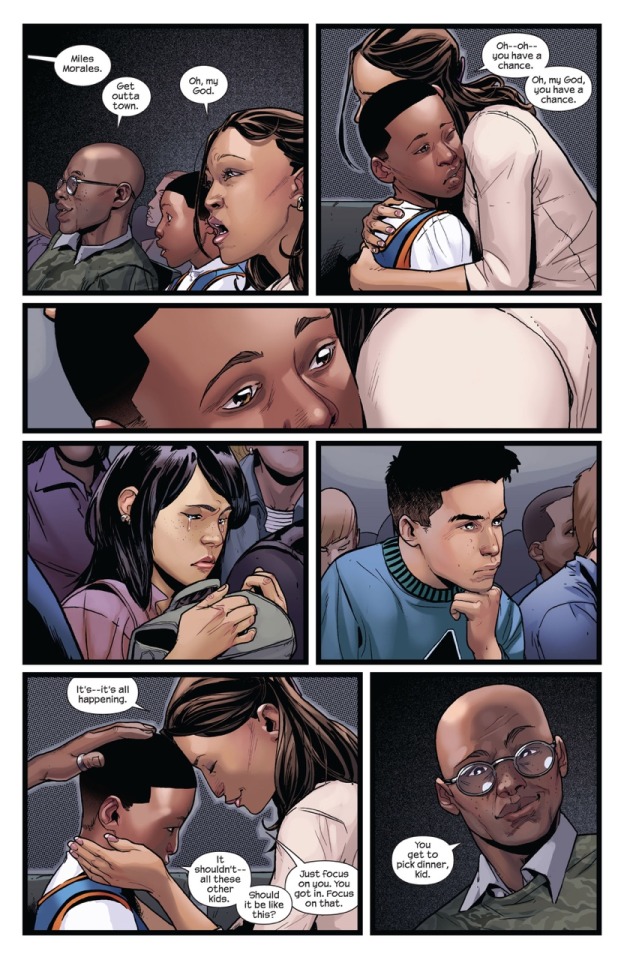
But what exactly is the opportunity gained? In Miles case, it’s hinted that his public school was not ideal or safe as even if he graduated with top scores, he would have still been underachieving simply because of the school that he attended. This underlies the meritocracy aspect of the school system. Going to a bad school becomes a disadvantage and a safety concern.
Also Miles is not happier at Brooklyn Visions as few depictions of his experience there show that he lacks freedom there. Miles is mandated to stay in Visions and away from his community that he grew up in. This is the feeling of alienation that was shown in Into the Spider-verse. He doesn’t fit in yet because these kids are well to do while Miles, who isn’t poor but he isn’t rich, can’t really relate. Miles Morales is involved in graffiti culture, an aspect that further cements that his previous school lacked art classes or graffiti being a culture that grew because the lack of affordable and accessible art avenues. Miles wants to be “with [his] people” but is pushed by his father to go to the school and encouraged by his Uncle who shares with Miles how little his Uncle and his father had growing up.
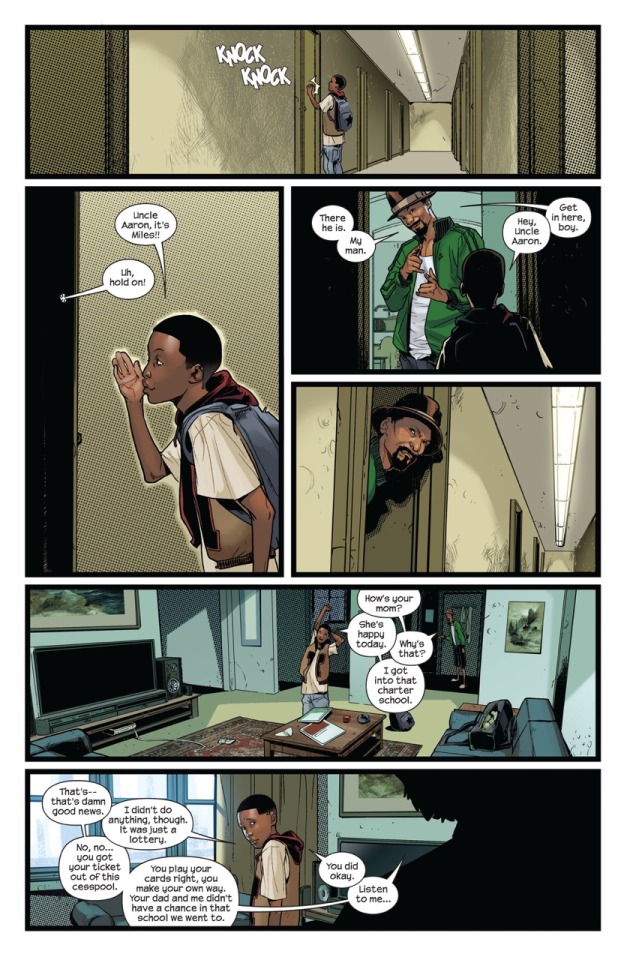
Then there is Miles biggest obstacle in his school experience as Spider-Man: the school-to-prison pipeline.
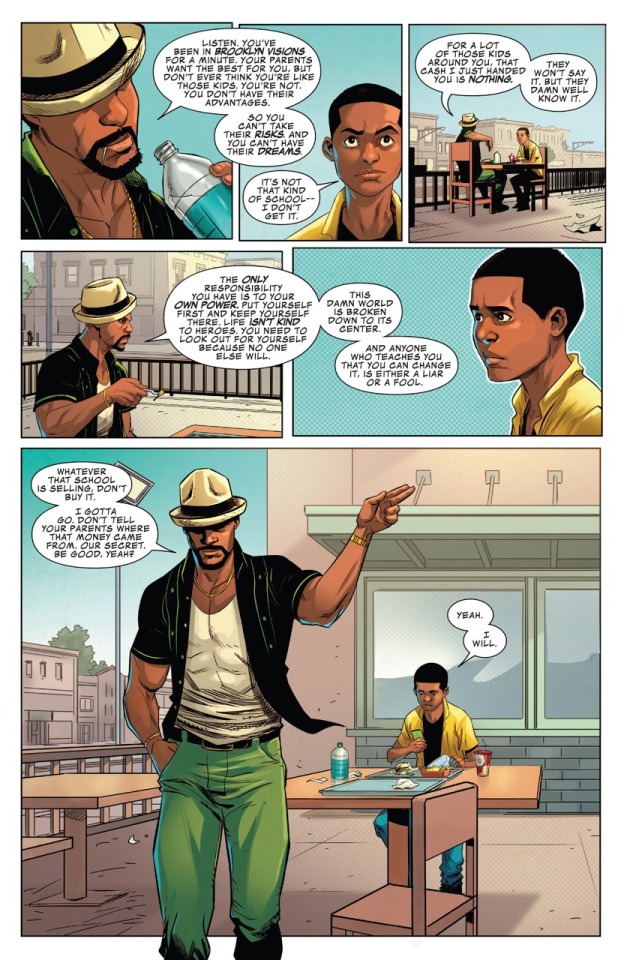
Yes, Miles is black and an outsider because unlike the other kids at Visions, he isn’t super rich or well to do. He got here on lottery scholarship. So there is this underlying racial tone to try to push him out of Visions.
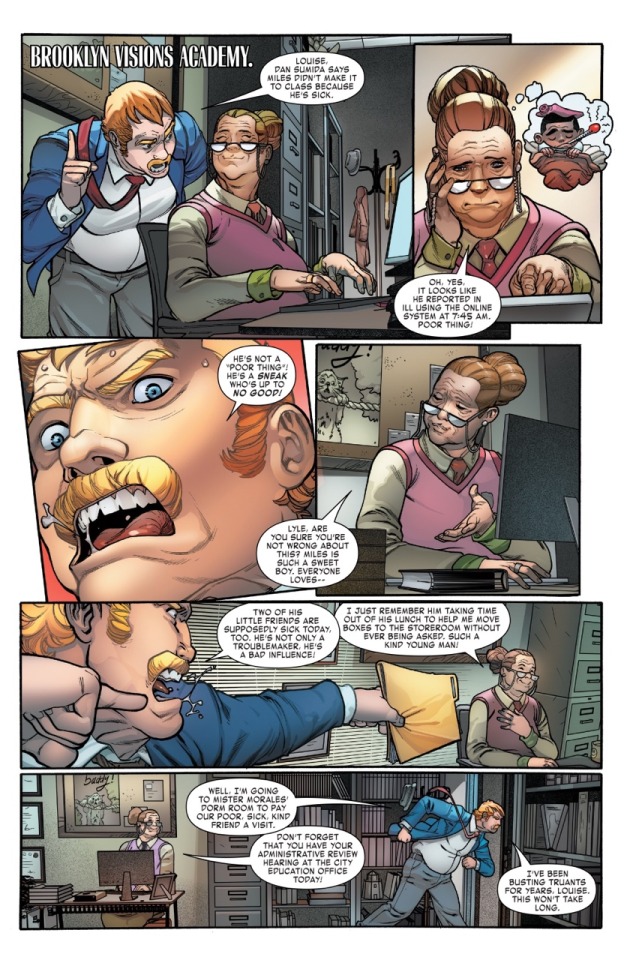
Mr. Dutcher is example number one. Mr. Dutcher assumes Miles is a sneak, a couple of letters away from being a racial slur, contrary to everyone else’s opinion of Miles. Miles is a troublemaker and a problem child which there is no evidence of this. But the hilarious thing is that Dutcher admires Spider-man but loathes Miles Morales. The same qualities that he sees in Spider-man are qualities that he believes Miles lacks.
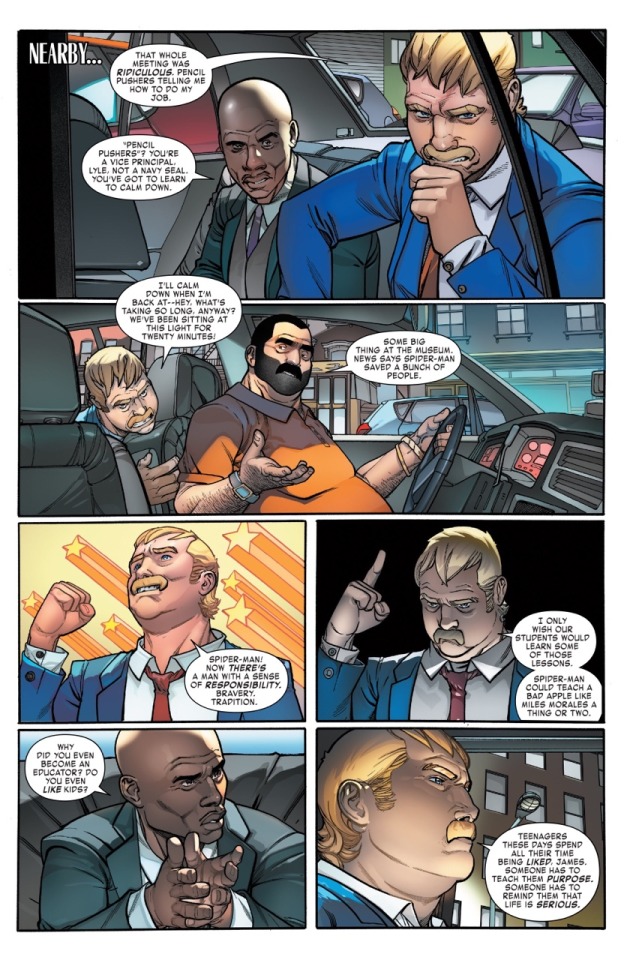
And the other kids aren’t helping in this perception of Miles. Since kids at BV are mandated to not leave school grounds during week without special allowances(parents or family emergencies), Miles sneaking out constantly or ditching class to be Spider-Man is a source of endless rumor. In fact, he discusses this with his not yet girlfriend, Barbara Rodriguez that kids are talking about him contrary to what Ganke says who is a bit of a recluse so he wouldn’t know what other kids at Visions think.
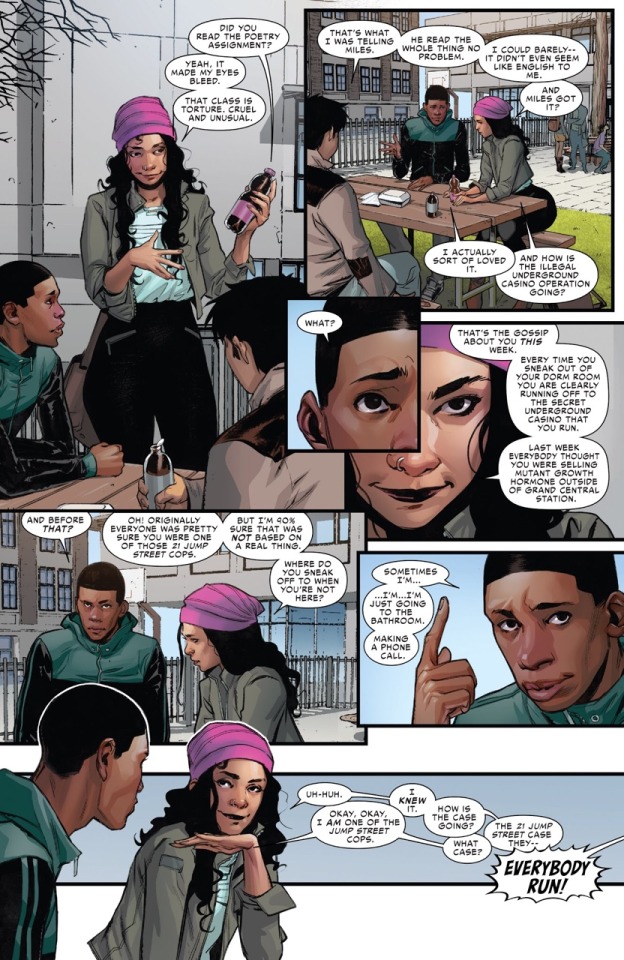
So things that Peter was afforded: freedom and the benefit of a doubt that he isn’t up to no good, aren’t afforded to Miles. Instead of just making web fluid with chemicals, Miles is suspected of using Ganke in stealing from the school chemistry lab and making drugs.
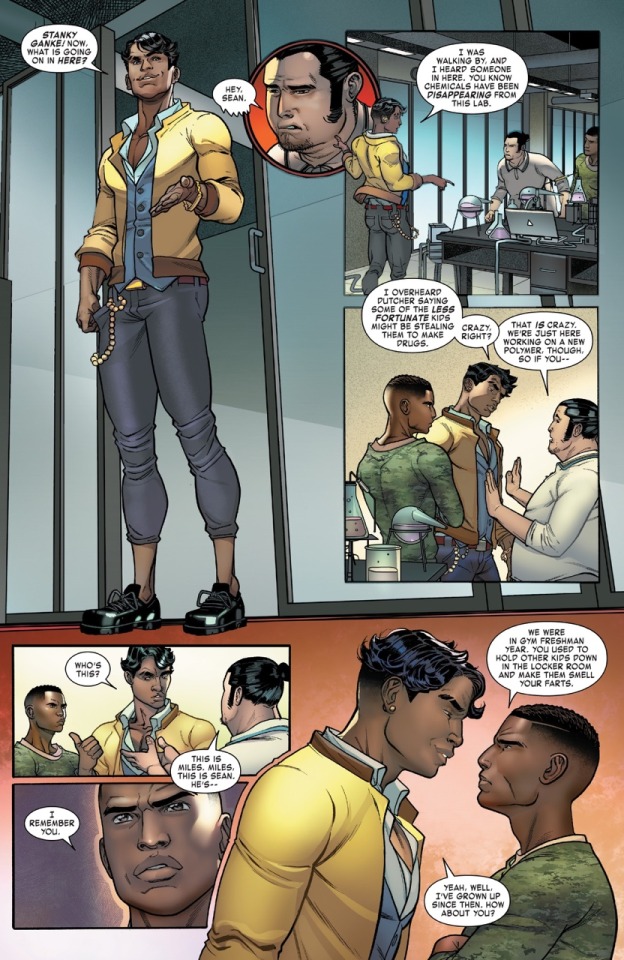
And Miles’ bullies lord his status of being the other over him. Sean thinks Miles doesn’t belong at Visions(two guesses why) and antagonizes Miles to react hostilely to kick him out. Accompanied with Mr. Dutcher’s vigilance of Miles Morales, Miles has an actual situation where he could lose his scholarship and get expelled as Brooklyn Visions is a zero tolerance school.
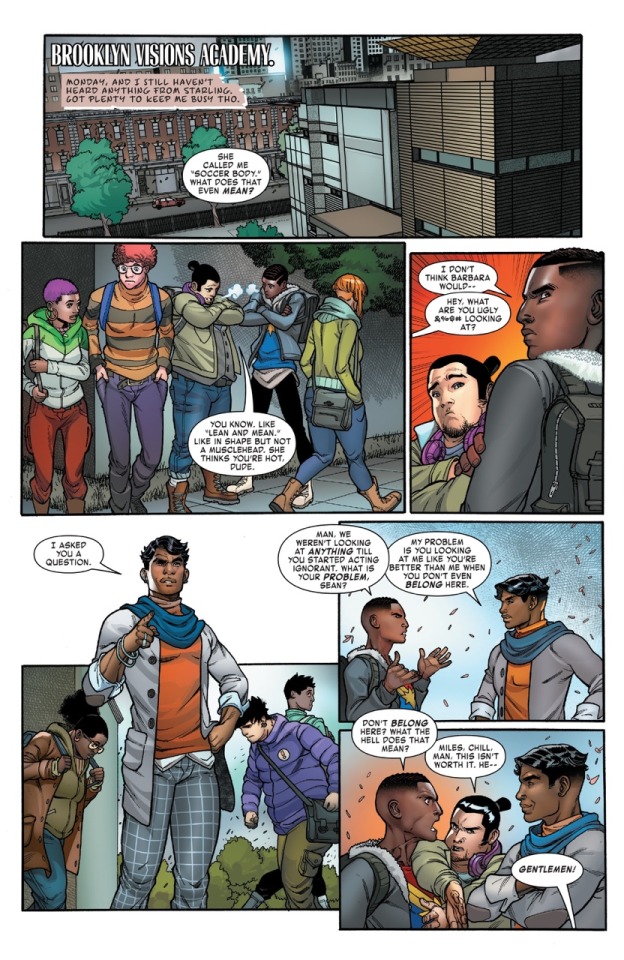
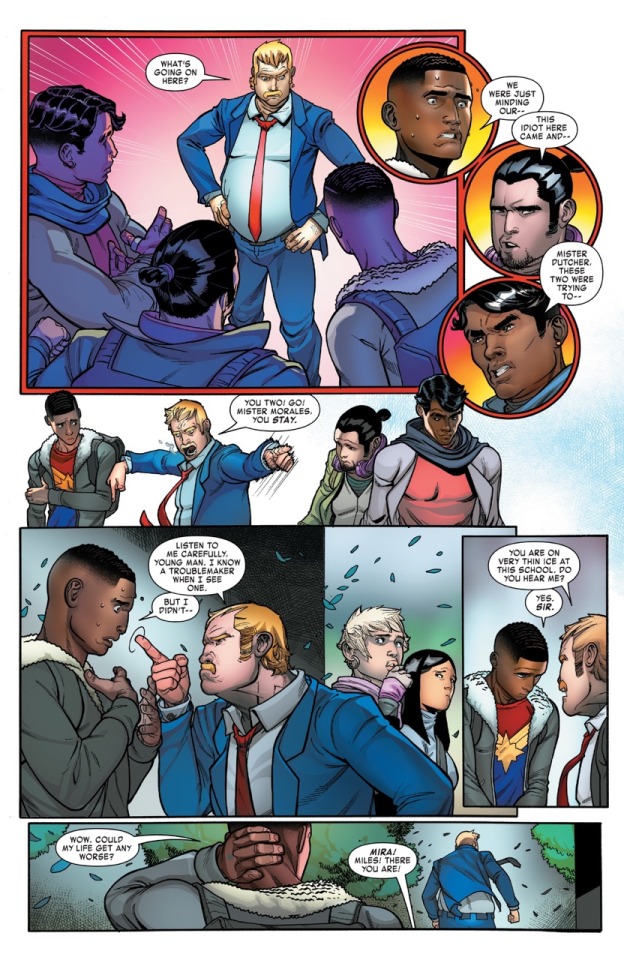
Then you have Jason Reynolds novel of Miles, which is pretty much school-to-prison 101, where Miles is antagonized by a teacher who is teaching slavery was a good thing. Again, Miles being black, brought up in a working class family, is a disadvantage in this environment that he has to overcome.
All and all, MCU Peter’s appropriation of an aspect of Miles lacks the complexity of it. It is pretty much propaganda whereas Miles kind of has a more nuanced approach that only works because Miles is a person of color.
@ubernegro
#marvel#marvel cinematic universe#mcu#mcu peter parker#peter parker#miles morales#spider-man#spider man: into the spider verse#into the spider verse#spider-man: homecoming#spider-man: far from home#spider man: homecoming#homecoming#spider man: far from home#anti mcu
2K notes
·
View notes
Note
Hey-o! I have to ask, because Tim Drake is my favorite BatKid, and you've got good taste! Do you have any fic-recs for Tim-centered happy times? Or just like, his fam appreciating him and taking care of him (because u KNOW they do). (btw I'M IN LOVE WITH YOFA HOLY SHIT IT'S GOOD!)
I DO have recs. I have been reading SO MUCH. Getting into a new(ish) fandom and gobbling up all the hurt/comfort for my favorite character is such a joy in my life. I have sometimes forgotten to give comments to these because I was moving on to the next fic so quickly, and also some of them I read on my phone, but every single one deserves very long, very enthusiastic comments.
First off, just go read anything by Shirokokuro. I have enjoyed every single one of their fics. Also everything I’ve read by girlgeekjf has been delightful.
I have bookmarked some of the stand-out fics I’ve read. When I’ve remembered to. Again, I have been gobbling these up very fast. I should probably resurrect @maychorianrecs and start using it for Batfam fics, because I have read a lot of them that are very very good. Not all of these are completely Tim-centric, but most of them are.
Minimum Height Requirement by Drag0nst0rmWord Count: 66,462Author’s Summary: Somewhere in the multiverse, there’s a universe where letting his children dress up in capes and follow him into vigilantism seems like a good idea. Bruce is determined that it isn’t going to be this one … Despite his children’s repeated attempts to convince him otherwise. (Or: “When you’re eighteen, you can do what you want. Until then, no capes.”)My Comments: I love this so so so so much. The Tim characterization is particularly spot-on and heartbreaking. He gives so much and expects so little. But his family loves him SO much.
Clockwork by heartslogos for protagonistically Word Count:2,468Author’s Summary:“Do you even hear yourself when you talk?” Tim wrinkles his nose. “Also stop trying to hide the coffee. I’ll always find it. You just put it out of reach or opposite the peanut butter. I am on to you.”My Comments:Suuuuuuper cute father-son relationship.
More Precious Than Gold by Drag0nst0rmWord Count:12,949Author’s Summary: Most dragons sleep on their hoards. Bruce’s hoard sleeps on him. Or: Bruce is a dragon. Predictably, he hoards orphans.My Comments: Adorable and amazing.
(Un)Wanted by Mika-chan (mikarin)Word Count:6,772Author’s Summary:Surely, Tim thinks, this time someone would notice. This time he would be missed.My Comments: This is everything I want in Tim-centric hurt/comfort. It gave me that good ache in my chest, I’ve already read it twice.
It Wasn’t Real (But We Were Happy) by lurkinglurkerwholurksWord Count:11,643Author’s Summary:The midnight bell had rung for Tim not on a date of any significance, but during an ordinary night at the Manor. Tim Drake is a sad, sad boy, and Bruce Wayne is trying his best. (But sometimes his best isn’t enough.)My Comments: Another one that gave me that good ache in my chest. I was clutching my face for the last two chapters.
It’s Not That Funny by IonaperidotWord Count:54,149Author’s Summary: “I’m sorry I killed you, Jay,“ Tim says. “Please don’t be mad at me.”Jason sighs, raising his head slowly. “You are not handling the Pit nearly as well as I thought you were.” After Tim kills the Joker, Bruce sends him across the country with his parents, where he’ll be safe. After Jason finds out, he tracks him down to visit. It’s all going pretty well until Ra’s al Ghul gets involved.My Comments: I avoid a lot of fics that deal with the AU where Tim is tortured and brainwashed by the Joker into becoming Joker Junior. Something about the idea of Tim losing his mind makes me really uncomfortable, so much so that I can’t really enjoy stories with that concept. But I really liked this one, mostly for how fiercely protective Jason is. Fair warning, though, this is a dark fic. The first few chapters, especially. But the recovery is absolutely stellar.
Robins and Other Flightless Birds by IonaperidotWord Count:84,919Author’s Summary: It begins with another Bruce, looking around his cave and asking, “So where are the kids?” Bruce has never thought about having a family before. But once the idea occurs to him, it’s hard to think about anything else.My Comments: Absolutely breathtaking. The family AU of all AUs. Literally. Run, don’t walk.
Bringing My Brother Home - Alternate Bat Family Universe by Beathas Word Count: 135,642Author’s Summary: In this Alternate Universe, the Bat Family is put through the trials of helping their family members through the tragedies, abuses, and dangers they run, all the while protecting their city. Whether saving Jason from the madness of the Lazarus Pit, Tim from the abuse of his parents, Stephanie from the danger of her dad, or Damian from the indoctrination of Talia, the Bat Family refuses to give up on each other. They refuse to let each other go.My Comments: Fair warning, the writing style on this takes a little getting used to. I suspect the author is ESL. But once you get used to it, the story just sweeps you away. The series has a very nuanced and realistic depiction of abuse and its effects, without being over-the-top or cheesy. And the author clearly loves Tim just…a lot. So much. I greatly prefer this to canon.
Foreign Object by audreycritterWord Count:86,122Author’s Summary:Bruce Wayne deals with a serious illness, one that threatens the most crucial part of himself. He and the family try to cope with their own fears and expectations about it and then the aftermath. This is written partly as character study, partly as family drama. Originally posted to tumblr.My Comments: The first entry in a LONG and INCREDIBLY good series where the Batfamily becomes, like, an actual family. It is SO GOOD. It is the BEST. Words fail me on this one. Just read it. And don’t skip ANYTHING.
Blood in the Water by Misha Berry (MishaDerps)Word Count:181,939Author’s Summary: We all do stupid things when we are lonely, and in faraway lands, we hardly expect the consequences to follow us. Bruce certainly never thought twice about an American woman in Jaipur after one night with her. He hardly expected to see her ever again.The universe, on the other hand, had different ideas, and the tides of time and chance brought Tim Drake to Bruce’s life over and over again.My Comments:Incredibly satisfying and fulfilling and things turn out so much better than canon, though Tim has to go through some extra hardships along the way. Again, a nuanced and realistic depiction of abuse.
Raisin Delight by LemonadeGardenWord Count:8,949Author’s Summary:A year after Jason Todd dies, Tim Drake and Bruce Wayne take on the case when they notice strange occurrences in Gotham city. This has disastrous consequences, but so do most things that Tim gets caught up in, so what’s new, really.My Comments: This fic is going to break your heart into teeny tiny pieces. Read it anyway.
Yesterday’s Voices by LemonadeGardenWord Count:49,000Author’s Summary:While trying to take down a drug cartel that deals with memory altering drugs, things go awry, and Batman wakes up with no recollection of the last five years. As a result, his family must now race against time to find the antidote, while also having to deal with a Bruce who still thinks Jason is Robin. A Bruce who doesn’t recognise most of them. A Bruce far less jaded and cynical than the one they’re used to. A Bruce who still cares.My Comments: Beautiful. Delightful. Heartwarming. Heartbreaking. It’s found family with a family that’s already found. It’s Bruce getting to know his children, all of them, and showing them with an open heart how much he cares about them, whether he knows them or not. Very, very happy-making fic.
The Longer You Stay by emiv Word Count:64,316Author’s Summary: Bruce Wayne was never meant to be part of Selina’s clean slate. Then again, neither were a circus boy, a street rat or a rich kid. For a girl who didn’t like strings, Selina found herself getting attached.My Comments: Absolutely stellar found-family fic in the Nolanverse. The romance is understated, and all of the feels are about family and adopting kids who need a family, and adults who need a family too. It’s wonderful and perfect. Tiny Tim is heartbreakingly adorable.
100 notes
·
View notes
Text
Reflection on Attack on Titan: How the narrative failed its characters
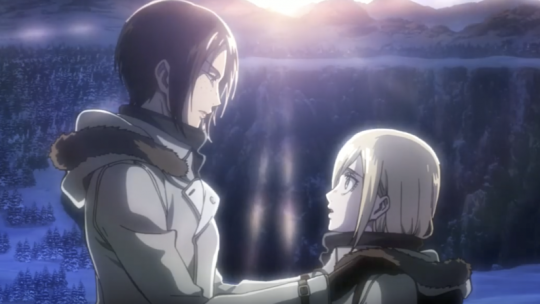
I did a breakdown of how Attack on Titan failed the potential of its premise due to its commitment to being edgy fascist garbage, but I also want to talk about how it failed a bunch of characters who were brimming with potential.
(This is gonna be messy and loooong, because I have a lot of feelings. Someone on the last post noted my “rhetoric blows” and I will freely admit I’m not really trying for coherent “rhetoric” here, I’m just venting my frustration so I can get it all out of me and move on).
Yes, it wasn’t solely the premise that drew me and so many others to Attack on Titan and its potential. There were a lot of unique and exciting elements with the way this shonen manga handled its characters.
I said before that Isayama never cared about his characters, but that was a bit of a exaggeration. I think he did start out caring about some of them...it’s just he quickly got bored with them and started treating them solely as tools to serve the “plot” and the screwed message he wanted to impart.

Isayama does have one strength as a character writer- he excels at showing characters who are messy, flawed and selfish but nevertheless sympathetic. Nobody in Attack on Titan is a classic unselfish “pure” hero, they are all deeply flawed. Isayama’s characters were compelling in the beginning because of that. He allowed his characters to exhibit cowardice, he allowed them to fail spectacularly, and that made Attack on Titan stand out. Despire the melodrama of their situations, actions and personalities, there’s a rawness to (most of) his characters that fits the horror of the setting.
Even the protag Eren, who a lot of people dislike or find easily the most boring character (honestly I found Levi the most boring though), has this ugliness to him that makes him distinct from the billion other teen boy protags in shonen. He is genuinely unstable and honestly a bit disturbing, as this collection of weird murderfaces he makes shows (behold my post popular aot post, ah memories).His obsession with killing Titans was unsettling, it was the classic determination of a shonen hero through a screwed up horror lens, this kid ain’t all right.
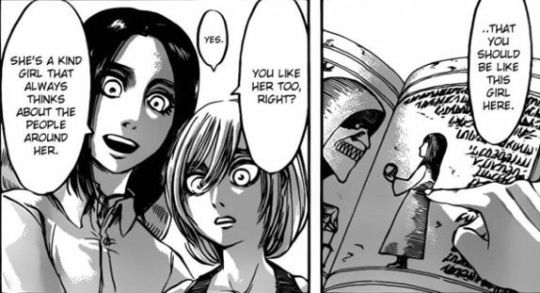
Historia especially resonated me because she was TRYING to be that classic pure heroine- but she was selfish like everyone else deep down. She just wanted to be SEEN as an pure-hearted martyr who sacrificed for others, when really all she was doing was giving into her suicidal urges. It was criticism of the very concept of the “immaculate woman”, and that’s pretty cool. So was the fact she was seen through by Ymir, someone who embraces selfishness in all other aspects of her life but is ultimately selfless when it comes to her love for Historia...that’s some good shit. It’s fantastic as a character concept, and Ymir and Historia’s initial character writing and backstory will stick with me because it was genuinely good in all its melodrama.
Historia and Ymir were nuanced queer characters whose relationships were fleshed out well. I do believe Isayama put care into crafting their initial arcs and developing them.
But then we run into a problem. A problem that eventually we run into with every character in AOT. Isayama stops caring about them. After their initial big arcs or moments in the spotlight or backstory reveals, he just doesn’t know what to do with these characters anymore. So they completely disapppear from the manga or fade into the background only to matter again when he decides to kill them off for some cheap shock moment. Either that, or they just exist to further the narrative of how the military is cool and we have to exterminate all our enemies and blablabla.
Because he ultimately cares about that narrative far, far more than he does giving these characters the full stories that resonate, make sense and are effectively paced. He's completely willing to undo all the character work he did previously if it means he can be edgy or impress his ideals on the reader.
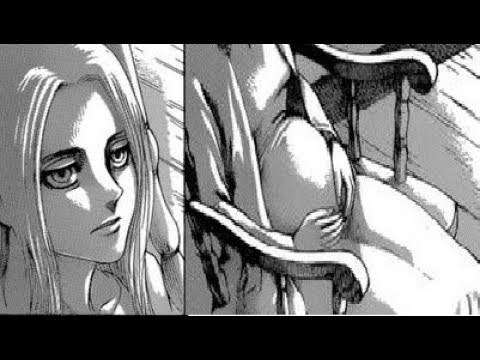
That’s why Ymir and Historia have this dramatic parting that gets the audience pumped to see what happens to both of them and when they’ll reunite...only for Ymir to just completely disappear from the narrative, then be killed offscreen without even really re-entering the story again. That’s why Historia has this whole big arc about reclaiming her agency, resisting her abusive family and learning to live for herself...only to be intimidated into becoming Queen even though she’s not super into it, because she needs to serve the military and NOT live for herself after all, I guess? And oh, now she’s numbly accepted her duty to endlessly make babies for the sake of the nation! Turns out her real purpose is to be something for the other characters to be sad about.
Isayama got bored with Historia’s arc and Ymir’s arc and their relationship. He may have fun coming up with characters backstories and the big dramatic moments, but once those are over? He doesn’t care enough to do the work to conclude their stories. He gets distracted by his next plot point, his next action scene. The characters are toys he discards or breaks for the sake of either some edgy ‘anyone can die!’ moment or to push forward whatever new stupid plot point he’s thought up for his fascist narrative. (Links to evidence of Isayama’s views in this post).
Even in the (dumb) sense of “oohhh doesn’t this impress life’s cruelty upon us”, Ymir’s death is a failure. When she’s been gone from the narrative so long, to have it suddenly be like “oh, she died” just makes for a reader feeling confused and cheated, not devastated. It becomes painfully clear she’s an afterthought to the author, a loose end that needed to be cut. Same with Sasha’s recent death, I saw no sign she’d been anything but background in the narrative for a long. looong time before she was killed off.
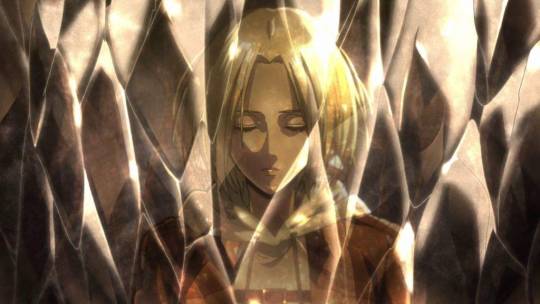
Heck, look not further than Annie, who has now been trapped in crystal for what, 800 chapters? It’s been YEARS, both in universe and out. It’s honestly FUNNY at this point that she’s still fuckin’ in there, literally just frozen until Isayama can decide what he wants to do with her.. I hope the manga ends with everyone dead and then 1000 years later Annie emerges like “hey guys I’m back!” Then a meteor hits her or something. The intrigue surrounding her fizzled out a long time ago, yet Isayama still expects the reader to care whenever that hunk of rock shows up?
Let’s bring it around back to Eren. There were a lot of interesting directions he could have actually gone as a character, had he been forced to actually, y’know, deal with the fact he was channeling his grief in an unhealthy way or his worldview had ultimately been challenged at all. But Isayama actually agrees with Eren for the most part, he does think enemies should be exterminated without fail and genocide is cool and stuff. So Eren’s development throughout 800 chapters was just to ultimately get more and more obsessed with killing enemies, to the point where he doesn’t even enjoy seeing the ocean for long before deciding that was more important. Only his targets are definitely people now, and he doesn’t care about children or civilian casualties anymore, and yeah he’s screwed up, but doesn’t he have a point???? You can almost hear Isayama say this.

Eren exemplifies how Isayama approaches character development. He allows his characters to get more ruthless, more calculating, more fucked up, more comfortable with killing and torture as time goes on, but they can’t develop in a positive way ever- if they start going in that direction, it’s time for them to either die or regress. Nobody’s allowed to find any sort of lasting happiness, nobody’s allowed to become softer or kinder. “Cowards” (like Armin or Sasha) can become “brave”, but they’ll eventually lose most of their softness and empathy too. But that will be excused at every turn, because that’s apparently the price, the sacrifice of being a soldier. It’s “necessary” and it’s something Isayama very obviously admires. “Bravery” trumps compassion, soldiers must be ruthless to win and in the end, any growth is meaningless.
To be clear, a lot of negative character development isn’t a bad thing and “anyone can die” narratives aren’t either (though both are very tricky to pull off without losing audience investment- if you know it’s all just gonna be suffering, why keep reading?). But even when your story has those elements, you, as an author, have to have some respect and perspective in regards to your characters and Isayama has neither. He AGREES that his characters terrible actions (like torture) are necessary, because he thinks what Japanese soldiers did to Korean civilians was A-OK too...so it all just comes off as sickening.
And in a story, even if you’re trying to impress that death is random and arbitrary, that your story’s world is dangerous for everyone, those deaths should still mean something to you. the author. Otherwise the reader can’t feel their impact. It shouldn’t be easy to kill off a character. It shouldn’t be simply because you’re bored, or don’t know what to do with them- yet Isayama has openly admitted what he does. A character ceasing to matter, and then dying, has no impact. A character must matter up until the moment they cease for their death to matter.
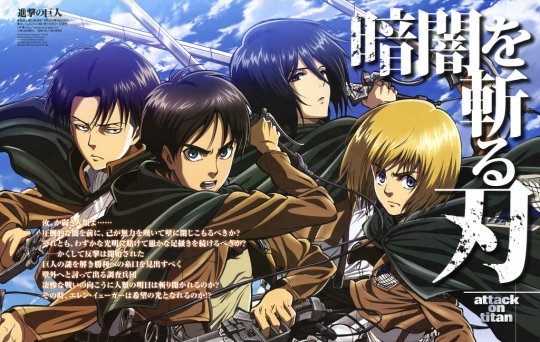
( And lbr, if “anyone” could really die in AOT, the four main characters wouldn’t have gotten a million miracle reprieves by now).
It’s not surprising it ended up this way, though. It’s not surprising a man who has no sympathy or compassion for victims of war crimes has no sympathy or compassion for his characters and slowly drains them of their humanity as the story goes on. His love of war and domination is more important to him than human beings, and that comes through in his narrative, where characterization takes a backseat to his love of depicting war and violence, of impressing its necessity on the reader.
The characters of Attack on Titan deserve better than to be embedded in this cynical, cheap, fascist narrative. Fortunately, there are a ton of stories out there, and you can find similar characters with authors who actually care about them and aren’t openly fascist. For instance, while thinking about Historia’s arc and how good it started out, I remembered that one of my favorite narratives has a very similar main character. If you like Historia and wish she had a better narrative, I encourage you to check out the anime or light novels for The Twelve Kingdoms.
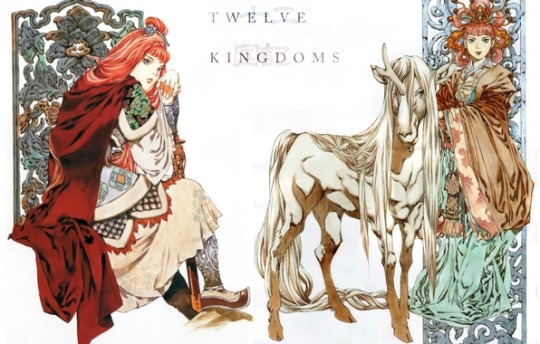
Similar to Historia, Youko is raised in an oppressive environment and constructs this entire personality around the idea of being an ideal good girl who lives for others, even though deep down she didn’t really care much for the people she was pleasing. When she’s stranded in an unfamiliar world, she slowly finds who she really is- and she’s pretty hardcore. She comes into a royal position of power too, but needless to say, it’s handled much better than Historia’s arc in AOT.
True, she’s not explicitly queer, but there’s no explicit love interest either (the anime does add a “crush”, but he disappears pretty quickly and she gets over him amazingly fast), and ton of strong female relationships in the story too, that don’t end with one party dying and the other becoming a baby machine. And it’s written by a woman who’s never openly supported war crimes, so.
So yeah, there are so many better options than Attack on Titan, and so many better ways these character concepts can be used. If you’re as disappointed as I am, it’s important to remember that. These character were failed, but characters like them can still be given the narratives they deserve.
Here’s the final part of this series:
The final reflection on Attack on Titan: How the narrative failed its potential in regard to gender and queer themes.
122 notes
·
View notes
Note
Hey so I've been considering checking out abot for a while now. But before I do, I wanna know what the draw is for you. What do you like so much about it ?
Strap yourself in, we’re about to go through one longass hell of a ride. Fair warning that this gushy love letter has a good chunk of spoils for canon mp100 and abot alike, so do with that what you will. (though i keep most of the spoils to the earlier chapters so i can leave some firsthand experience left)
ABoT has 5 main (not all) attractions for me, most of which are incredibly personal :1. nuanced, actually mature depiction of abuse2. lack of a ‘perfect savior’3. plotting cause+effect4. scene setting (okay this one is more a taste thing that i happen to really love)5. incredible writing all around
Part 1. Nuanced, actually mature depiction of abuse.
I was an abused and neglected child. As such, it’s very easy to see where some of the appeal of this type of fanfic would come from. Course, I’d encourage a looksie regardless because it’s written with respect to the subject matter, and because fics like these have great potential to expand on human understanding and empathy.
THAT SAID ! In order to talk about the depiction of abuse in abot, I first need to talk about the abuse in mp100 canon.
To be frank, I think phantomrose96 handles it better than mp100. Especially the execution and aftermath of said topic.
For comparison I’m going to use the Mogami arc (an arc i do like, perhaps less than the majority of fandom, tho this’ll likely shed a light on why)
The depiction of abuse between abot and canon have some similarities. In both cases, Mob is uprooted from his foundations of support, and the strain goes on for a lengthy amount of time. Canon!Mob’s experiences are 6 months long, and abot!Mob is 4 years. The differences start hereafter, though.
For starters, with canon!Mob, we learn about his torture mainly through his own POV, with Mogami making commentary. His firsthand experience is bolded and put at the forefront, and functions as the end note of the scenes which feature them. Mob is isolated, ostracized, and bullied. He is beat up at several points. One such instance sees him lose a tooth. His bullies torture a cat to death, smash a brick on his head, and stab him with an exacto knife.The ‘maturity’ of canon!Mob’s abuse comes firstly from the severity and cruelty of it. And secondly, for how it could drive him into using his psychic powers against people willingly. It highlights that one can be as shaped by their surroundings as by their choices.It’s dark, and it’s weighty.
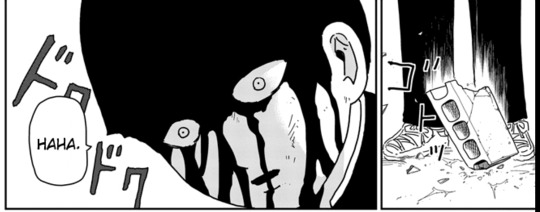
However, the abuse in the arc is used a mechanic, and is glossed over once its primary use is over with. No abuse in this vein crops up after this arc.
The point of it’s presence is to raise the stakes, to showcase “this is fucked up” and then move on when the lesson is learned. We only get 2 peaks that Mob even remembers it. Once is with Mob acting quite fearful when Mogami shows up again, and the other when Mob goes to help a cat off a pole.
Still, the fact remains that it’s never mentioned for the rest of mp100.
And thusly, Mob is presented with no means to process or deal with the trauma other than to, presumably, remain quiet about it. Or otherwise, for the reader to assume that the experience was relegated to subconsciousness. After all, we’re told expressly with Minori that the memory begins to fade as early as a day after.
This stance can be detrimental to those who experience abuse, as it can imply that no help exists for the survivor to seek. That it’s better to simply forget about it, and move on without guidance.
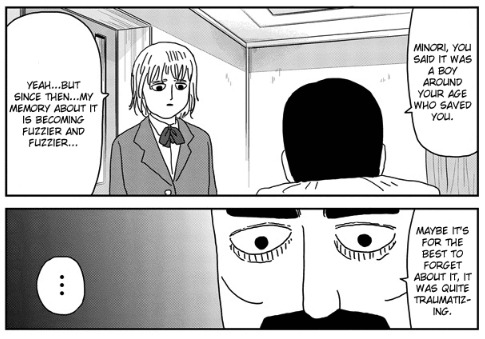
Which, y’know, could work fine if it was ONE’s intention to showcase that some people don’t deal with trauma outright, keeping it hidden.
But there is a difference between “purposefully writing someone to seem unaffected when they really are” and “purposefully writing a macguffin to clear the way of an old arc to make room for a new one"
I love ONE’s writing, I do, but it seems very clear to me that he was giving himself an out for having to write long reaching consequences of such a brutal arc going forward. Folks can get from the arc what they want, and that’s hella valid. I mean, shit, my trauma was never front and center either when I was Mob’s age.
However, there’s a clear delineation between coincidence and intentionality.
By having the abuse all happen in a dreamlike world, he gives himself an out. The characters are more or less able to skirt around the issue, or otherwise forget about it.ONE thereby dodges having to write further complications to the story he wants to tell.
Enter A Breach of Trust.
In Abot, the aftermath of being abused is a part of Mob’s day to day life, like actual trauma do. And here, the process of dealing and coping with said abuse is the main function of it’s appearance in the fanfic.
The four years Mob spends on his own are broadly covered in a punchy ~1k words at the beginning of chapter 4 (the fic is 133k words long, for comparison). They are to let you know the nature of Mob’s problems, without lingering unnecessarily on them, exploiting them, or making them voyeuristic. And in fact, Mob gets out of the Mogami house in chapter 8 (again, in a fic 24 chaps long).
The rest of the chapters where Mob makes an appearance are about addressing what he went through, and trying to help him.
As opposed to mp100 canon, we learn a lot of information as to the nature of what mob experienced through Reigen. He often has sad or horrified responses, as one could expect to have in his shoes. But his response is not the end note of the scenes which feature them. Instead, it’s the actions he and Mob take, in equal turns, to bring about change which gets the end note.
I’ll use the milk scene in chapter 11 as an example.
Reigen learns a piece of information about Mob’s life, namely that he was denied milk:
“You have milk?”
“Uh…yeah. Not even expired. I bought it like two days ago.”
“But Shishou said…” Mob swallowed the words. His breathing picked up, eyes flickering across the single carton of milk in Reigen’s fridge. Slowly, his voice almost choked, Mob answered, “Yes, yes please…”
Reigen’s response:
He couldn’t fathom what sort of world the kid had just escaped, but he knew now he didn’t want to. And he didn’t want to make Mob relive it, not if it was something so horrific that a single glass of warm milk could move him to tears.
The end note of the scene (literally the last line):
“Here,” Reigen said, sliding his mug across the oaken table. “Have mine too…”
Abot, unlike a good chunk of media, seeks not to use traumatic experiences as a throwaway mechanic for a separate, main focus. Or as a stand in for faux character depth or grittiness. I’m lookin at you Kaneki Ken. Or worse, as an inevitable reality. No.
The actual maturity of abot!Mob’s abuse, which I’ve been hootin about with the title card, comes from its application to Mob.
It will not be brushed off as a bad dream. It will not be relegated to subconscious, or forgotten. It is not a ‘shortcut to coolness’, or a ‘dark history’ to earn abot!mob some tragic backstory cred. Nor will it be “solved” with a single long talk, or hug, or even to just put Mob back in his house.
Abot seeks to offer a more layered, real world approach to it. That trauma, fictional or not, does not make you cooler. That it takes several, seemingly small steps to start on the path of recovery. And that there is no reaching your “before” status, but just changing the shape of your “after”.
For that matter! Mob also has agency of his own. It is not Reigen that springs Mob from the Mogami house, but rather Mob himself, taking matters into his own hands.
There was no plan to it. Mob moved. He raced to the door and the inky world beyond. His feet collided with cold stone. Stone became grass, which sheared away before each footfall, leaving wet pulp and mud beneath his beating steps. The vastness of the open sky and the world stretching off in all directions, even after four years, could not overwhelm him more than the image of his dead Shishou scorched behind his eyelids.
Mob will fight on matters he considers important, calling the cops, for example.
Mob’s jaw moved, his wide eyes steeled over, harder now, resolve tight in his face. He looked up to Reigen. “I…wouldn’t like that, Mr. Reigen.”
He’ll voice his own opinion, draw his own conclusions, set his own goals.
His hands twisted in his lap, eyes dropping to them for a moment before they flickered up with new, burning resolve. “…If you could teach me…”
“Teach you?”
Mob nodded vigorously. “How you’re getting rid of it.”
And Mob is not relegated to cowering at all times either. He’ll enjoy things he likes, build himself up, amongst other things.
The rain drenched him. Through the blues and pinks, water could pass. Water wasn’t living, so it wasn’t stopped, it wasn’t shredded. But it felt alive enough to Mob. It felt like something that wanted to reach him, and could.
Mob shut his eyes and smiled. Even if he couldn’t suppress the barrier now, that wasn’t reason enough to give up, not this time around. This time was different.
Rest assured that this journey is as much an active choice on Mob’s part, as it is Reigen’s. Reigen is simply a guide for Mob. And he’s meandering through his guidance half the time, which brings me to part deux.
Part 2. Lack of a perfect savior
I will be the first to admit that Reigen is hilariously flawed. Abot!Reigen likewise. And yes! This is another reason why I like Abot ^^
Preface in place before I talk about this, I am. a tough ass customer. We just had a whole previous section of analysis to illustrate that (which confession time, i cut that down by half), but to go more in depth - It is extremely easy to take me out of a story. And this is because, ironically, I love storytelling.
For better or worse, when I’m consuming media, I cannot turn off the storytelling part of my brain. Ergo, if I see something that can be improved, I’m launched back into a 4th person perspective, no longer engaging directly with the content. Sometimes it’s minor enough where I don’t mind any. But unfortunately, more often than not, it’s enough to get me to drop things when too many instances pile up.
And as one of those Hoity Toity Connoisseurs of the hurt/comfort genre, the human version of the Messianic Archetype™ is both a common occurrence, and a surefire way to get me to drop your story upon first sight.
I cannot engage with media that have regular ass people know exactly how to react, what to say, what to read into, on the first try, when the nature of human existence so chaotic and varied.
Maybe that kid is hiding under the table because you’re wearing fuchsia, maybe it’s because your voice sounds like someone they had a nightmare about, maybe its because the lights hurt their eyes, maybe it’s because they feel safer in cramped spaces, maybe they’re eating ants. You don’t know. They don’t know. Getting things wrong is as much a part of the process as getting things right.
SO!!! ONCE MORE WITH FEELING!!! ABOT!!!
Phantomrose makes it clear, as early as Reigen & Mob’s first meeting, that we’re dealing with a regular ass human fuckup, even in the midst of the rose filter from Mob’s POV.
In the scene, Reigen is presented as being undoubtedly ignorant as to the true nature of what the hell is going on. He, mistakenly, does not believe that the barrier is real. All he knows that is Mob has come from some Yikes and needs help. Oh, and in Reigen’s limited knowledge, he thinks there’s a confirmed Dead Man off somewhere too.
And yet, despite the pressing circumstances, or y’know, having a presumed corpse he should probably mention to somebody, Reigen does not call the cops.
“Okay. Okay… Do you—just—do you want to come to my house? Just for tonight. It’s…late. Don’t feel like dealing with any more police officers tonight anyway. Maybe we just…go sleep. Get you some clothes or, a shower probably. It’s…I’m tired. You’ve got to be tired too.”
We get an explanation for this later on, in chapter 14…
What if he ran off again, back to his dead Shishou’s basement…?
…but. Were the audience not clued into Mob’s circumstances, one would argue that though well intentioned, Reigen’s messing up. And despite the many things Reigen does to help Mob (which he does, he really does) this motif continues throughout the fic.
With Reigen sometimes saying insensitive things to Mob.
“No, I’m…” Mob paused. He hiccupped, voice still hitching, body still trembling. “I’m sorry Shishou is dead. I did something to make him kill himself. I know it.”
“Good, Mob. Good…”
Mob stared up, jaw slack, baffled.
With Reigen often acting as much as his own interest as in Mob’s.
“Toast, Mob, it’s going to be toast. And eggs. And yes. This is breakfast for both of us, and you’re going to help.” Reigen looked the boy over, and the feeling in his chest was almost manic. He was looking at something maybe he could fix.
Where Reigen will make logical assumptions, but false ones nonetheless.
“I’m going to grab just a handful of things from those aisles, okay? Not going far. I just want you to stay here, with the paper, and pick up our order when it’s ready. Okay? It’s another exercise. I’m still here. I’m still suppressing the barrier. I just think you’re strong enough to stand here for a moment by yourself. Can you do that?”
–carved things up, sliced them, killed them…
Mob’s mind filled with static.
He nodded. It was the only thing he could think to do.
Reigen smiled, and stood up from his crouched position. He turned on his heel, toward the left side of the store. He rounded the edge of the counter, and suddenly he was gone.
And yes ! As a survivor, this shit is important to me.
These scenes showcase that comfort does not have to be found gift wrapped, pure and untainted, and delivered by an angel spluttering down from the shiniest parts of heaven. No. It can be found in people who are flawed and sometimes selfish and who are just trying. It can be found in folks like abot!Reigen.
In folks who weren’t predestined by some holy undertaking, but rather who are just making the best of the circumstances they find themselves thrust into.
SPEAKING OF WHICH,
Part 3. Plotting cause + effect
I’ll be honest and say this is something I learned very recently from Phanrose.
From my creative perspective, as long as an action is in character for someone, I can find a way to make it happen. A good showcase for this is, ironically enough, Attic Au, and it’s many incarnations. I can adapt to circumstances to cause what I want to happen.
This is, again, a tie-in to the way I rationalize the chaotic nature of human existence. Sometimes shit can just do, and as long as you pull hard enough emotionally, you can get people on board. So I spend a lot of time on the “why”, with my “hows” remaining fairly lose and interchangeable.
Abot takes this in the opposite direction. She says ‘okay but what if I use the chaotic nature of human existence to cause everything to bump into eachother’.
And honestly I’m kinda tripping over it ?? Like it’s extremely fun ? Connecting all these dots? And it doesn’t feel convenient either. It feels like a logical progression.
To use early examples, as I have been for the most part:
Jun hires Reigen to investigate her husband Tetsuo disappearing at weird hours.
“That’s really all I want from this.” She looked up now, palms in her lap, eyes set to Reigen. “I want you to just figure out what’s going on because I can’t.”
Reigen then discovers that Tetsuo is being possessed.
A thousand memories assaulted him at once, tainted with the raw smell of incense, the grittiness of salt between his fingers and under his nails, dimmed lights and candles and incantations and that dread in the air, like pressure, that he felt whenever a Spirits and Such case turned out to be real.
Reigen decides to confront Mogami 2 different times. The first time he learns his identity, and the second time Reigen gets too close to hitting on Mob’s presence for Mogami’s comfort.
“Why did you buy cough syrup today?” Reigen blurted out. “You miss that taste too? Tetsuo doesn’t have a cold. It’s not for him. You got other puppets I don’t know about?!”
Mogami threatens to kill Tetsuo and take Reigen, so Reigen makes a bargain (with newly cut up hand to make his 1 sigil out of 1000 work).
Reigen thrust his hands down and out, body displayed unprotected. Sweat slid down his face, soaked through his suit, mixed with the blood in his palm. “Come possess me! Space for rent right here, y-yeah? Yeah! Not gonna resist. Not gonna fight. All I’m gonna do is slam you with these tags if you get too close!”
The tag works, banishing Mogami. Mob notices the lack of Mogami’s presence, and goes looking for him.
Even when Mogami left the house, his aura only ever grew fainter, steadily diffused as Mogami established distance between himself and the house. It was an easy blip to detect at all times. It was a constant thrumming presence in Mob’s life for the last four years.
And it had vanished in an explosion that left Mob’s psychic core ringing.
“…Shishou?” Mob called through the door.
Upon finding Mogami’s corpse in the attic, Mob makes for the streets, thinking Mogami has freshly killed himself and that he can no longer stay there.
Mob shot down the hall, took the stairs two at a time with his hand skimming the banister. His mind wasn’t clearing. His thoughts weren’t forming. The reality of what he’d seen beat in heavier against him with each passing second. Mob let out another keening crying, finding no response in the black house.
Another brush of wind, Mob turned toward the foyer. He’d been right—the front door had been left open.
This makes for a wonderful storytelling device. Firstly, it makes the audience both wary and excited for the consequences of any actions in the future. If any action can seemingly build off one another, what’s to say a throwaway moment wont come back to haunt us?
Plus! Aside from making scenes engaging, it also subverts some tropes while it’s at it.
Reigen, despite literally being a PI, does not find Mob on a missing person’s case. And does not discover Mob either of the times he followed Tetsuo into the Mogami house. Instead he only finds Mob by the boy crashing into him. Which only happens again because of a set up in chapter 3.
This carries on and spills over into Ritsu’s plotline too! Which nbnmbxn, I haven’t touched on as much in order to leave a good chunk of story there to peruse as you will.
I’ve learned a lot just from watching pr96 chisel out a story. And you wanna know what else I’ve learned?
Part 4. Scene setting
OKAY I FESS UP THIS IS JUST ME HAVING A THING FOR SETTINGS BEING INCORPORATED INTO THE ATMOSPHERE OF THE SCENE OKAY, OKAY.
With that out of the way, she’s damn good at it yall.
Phantomrose96 likes to employ what I call mood scenery. Where the physical objects present in a setting take a backseat to how the characters feel about it, and therefore flesh it out all the better.
Compare how Reigen sees his apartment:
Reigen cringed a bit as he looked about, taking in, remembering the mess decorating the living room. The ashtray on the table overflowed with cigarette butts, staining the wood around it with sooty acrid residue. Three empty plates were pushed to the table’s edge, scraped of food and left to stagnate for…how many days, Reigen wasn’t sure. Empty beer cans gathered in a herd near them, a few on the floor, leaving sticky coagulated rings around their rim and smelling of staleness, of stagnant fermentation.
With how Mob sees it:
Mob’s apprehension eased off. The look was replaced entirely with something like confusion. He pulled out of his blanket cocoon, let his eyes rove over the apartment in full inspection. The confusion never left his face.
“It’s so much cleaner than Shishou’s house.”
Scenes like this are peppered and expertly handled throughout the entirety of abot.
As a comic illustrator, I often struggle with coming up with backgrounds that tell you a bit about the circumstances of the people who live there, and about the mood of someone viewing it. But Phananarosa does it.
And, like. every setting is like this. Instead of getting fatigue at scene changes, I eagerly dive in because what’s not to love !!! It captures just enough details that it can be fleshed out, without boring the audience with a surplus of inconsequential details.
Teruki walked past the rows of lockers. Further back were bathroom stalls. Three sinks lined up beneath a wall-length mirror. This area existed as its own pocket, seemingly separate from the rest of the lockers, and the light only scarcely touched it. The shadows grew heavy along a gradient, the farthest sink half shrouded in darkness. Even farther back, crowned by a single burnt-out hanging light, was a row of four showerheads, no curtains separating one from the next.
It is no coincidence that some of the backgrounds I consider to be some of my better ones, are ones I made for abot.
It’s very apparent that Phanro9 knows what she’s doing with the words she chooses to dress these with. And, you guessed it, TIME TO SEGUE INTO
Part 5. Incredible writing all around
Okay now I can just gush about some the extra little details that GhostFlower96 uses that just make her tale that much more fun to read.
Amazing dialogue. Especially in Reigen’s case.
“Gottaswirl the eggs to seal in the moisture. Gotta just…put extra butteron the toast, I guess, so you don’t taste the black part cuz that’sprobably bitter, so you—never mind I’ll make different toast thatisn’t burned, gimme your plate.”
You ever tire of reading fics where the characters sound the same ? Spectreblossom has got you covered!
He thrust a hand out, palm open to Ritsu. “My name is Teruki Hanazawa. I’m the esper who’s better than you.”
Ritsu stared at the offered hand. He fought the instinct to step back. “The spirits didn’t say anyone owned them.” He paused, and weighed his options. “And who says you’re stronger than I am?”
Say you wanna feel ur heartstrings tugged because god oh god he’s a mess but he’s still good for something. we got a fresh supply
Beside them, the rice pot boiled over, glutinous water dripping down the black pot’s side and charring against the newly cleaned grating. The sauce bowl sat stagnant and undissolved, a colloid of new and stale ingredients perhaps unsalvageable for the recipe. Broken spoons, filthy sponges, open containers of starch and sugar and soy sauce littered the counter tops, the smell of something burning lingering overtop.
And at the center of the mess, Mob sliced the knife clean through the red bell pepper.
You wanna be haunted by singular closing lines? Already on it.
Thebarrier swept back around Mob, like the curtain drawn at the close ofa play.
Kids ? Being written like kids ? In phantomroseyboboeybananafanafofoseyfiphimomoseyphantomrosey’s fanfic? It’s more likely than you think!
“After this, can we go back to the park?” Mob asked. He wobbled, tilting his head over his shoulder to ask Mogami directly.
“We go to the park every day.” Mogami answered. He walked the sidewalk, thin silver hair catching sunlight and twists of icy wind. The hollow pockets beneath his eyes were deep, but not unkind, intently watchful of Mob who dipped and wavered with each balance-beam step.
“Yeah, because I like it.”
You want some de-glorification of teenage violence? Boy have I just the thing.
He felt 9 again, scared, weak, unsafe, and he cried quietly while he watched the consciousness leave Teruki’s body.
Limp and loose, Teruki’s hands dropped from the tie around his neck.
You like metaflours and symbopolism ? WE GOT THAT TOO
Reigen looked over his shoulder. Mob shut the door behind them, turning to investigate the apartment with wide captive eyes. “…It’s warm,” he muttered, and stepped in line behind Reigen.
You wanna feel like you got punched in your chest ? Even on things you knew already ? Even things you had every tool in your belt to see coming?
Reigen stopped. He lost track of his own words as his focus fell entirely on the sight in front of him. The kid was standing halfway between the bathroom and the living room, his hair still a bit wet, and his borrowed clothes soft and loose. He stood a head shorter than Reigen, and his wide eyes stared back, lost, waiting for instruction. Waiting as though he needed permission to even get his sheets and go to bed.God, it really was just a kid…
fuck ing , d we . g o t tHat t o o goddammit

If you wanna read, you can start here ! Or here, on tumblr.
#anon#joey babbles#abot#long post#long long post#cw: blood#for canon mob#mp100 spoilers#abot spoilers#?#well i'll tag it anyways
709 notes
·
View notes
Video
youtube
“It was also my first exposure to clinical depression. That’s the fascinating thing about it to me, people seem to identity with the song for their own reasons. Some people still associate the song with the video and the song itself has nothing to do with what’s in the video and runaway children. It was just this concept of “runaway” that was applied to the video. But the song itself is just a simple statement of insecurity. It’s talking about the downward spiral, which is what happens when you get sad. You can either come out of it or you can let it take you down. That’s what I was going through at the time. There is hope in the song too. “I can go where no one else can go, I know what no one else knows.” You are trying to overcome your own self-doubt.”
-Dave Pirner on Runaway Train
Dave Pirner: The Resonance of Soul Asylum’s “Runaway Train” 25 Years Later
Posted by Jeff Gorra, Jun 1, 2018
On the silver anniversary of its official release, Pirner reflects on band’s most impactful hit
“Call you up in the middle of the night” — you sing those nine words and in response everybody knows what song you are gliding into. In fact, chances are “like a firefly without a light” will immediately be volleyed back to you.
“Runaway Train” by Soul Asylum. As the opening line suggests — it’s a brutally honest rock ballad that carved its place in history on its own. Frontman, Dave Pirner, has always been straightforward in explaining how “Runaway Train” deals with the complexities of depression. It’s fair to say it’s a song that thematically was perhaps ahead of it’s time.
“I was a key that could use a little turning”
“Runaway Train” takes responsibility, and that’s a big reason why it resonates deeply still — echoing consistently to the masses. By stressing the individual struggle, it offers a subtle – you are not alone. The vulnerability in Pirner’s voice allows for the most graceful of melodies to accompany the equally potent chords and lyrics. Depression is something that is ever-present today — within the arts and the great beyond. Lyrically, “Runaway Train” depicts the feeling of helplessness one wrestling with depressions feels better than any other song I have come across. But I’d like to halt the train on the tracks for a moment. As you will see, Pirner mentions that buried in the song about struggle is one glimmer of hope… “I can go where no one else can go, I know what no one else knows.” Sometimes that’s all it takes. One line. One hand. Ironically, that’s what “Runaway Train” has been for so many over the years. That extended hand of understanding.
But let “Runaway Train” serve as its own example. Its success is undeniable. The song itself was certified gold (selling 600,000 copies) and a key component to Soul Asylum’s triple-platinum record Gravedancers Union. As the third single to be released off the record (Yes, third… behind “Somebody to Shove” and “Black Gold”) it reached number five on the Billboard Hot 100, number two on the US top 40, and won a Grammy Award for best rock song in 1994.
By digging deep and stirring its creative voices, “Runaway Train” knew what no one else did. That one-way ticket put the song on a track that millions of people can still relate to. Sometimes there is nothing more comforting than the compassion exemplified by simply recognizing how challenging something like depression is and the toll it takes on your total being.
For Pirner, he put the pen to paper and the pick to the stings. As a result, it was one of the worlds most popular songs in 1993 and 1994, but furthermore, it offered an artistry that continues to be both a companion and a ray of light.
On June 1, 1993, “Runaway Train” was officially released as a single. Today, June 1, 2018, exactly 25 years later, Pirner invites us on-board.
What do you remember about writing “Runaway Train”?
I remember it well because I had to live through it. It was a melody I had in my head for a long time. It was based around the words “two souls” — it went like this, “Two souls laughing in the rain, one is crazy and the other’s insane.” That was the loop. I hadn’t pursued, it was just one of those musical things that gets stuck in your head. Eventually, I thought — OK, there has to be something to this. I hadn’t even recorded it. It probably took me a year-and-a-half before I made the connection with the train. Once I got the train on the track the rest of it came together.
It was also my first exposure to clinical depression. That’s the fascinating thing about it to me, people seem to identity with the song for their own reasons. Some people still associate the song with the video and the song itself has nothing to do with what’s in the video and runaway children. It was just this concept of “runaway” that was applied to the video. But the song itself is just a simple statement of insecurity. It’s talking about the downward spiral, which is what happens when you get sad. You can either come out of it or you can let it take you down. That’s what I was going through at the time. There is hope in the song too. “I can go where no one else can go, I know what no one else knows.” You are trying to overcome your own self-doubt.
This song was written in a really tough period of my life. I was going through some terrible shit. I thought I was losing my hearing. It has a lot to do with grabbing on to a thought that is devastating and not being able to get away from it. I couldn’t climb back up the downward spiral. That’s where the “Runaway Train” metaphor comes in. It’s interesting to now think about, I’ve never really had to talk about it much, usually people want to talk about the video and I have to explain to them that the song is not about kids at all.
Where was it written?
I was home in Minneapolis. I had walked away a little bit. We were supposed to go out on tour with Jane’s Addiction and I couldn’t do it. I wasn’t hearing right, and I was worried it wasn’t going to get better, which it eventually did. So, I had that loop going around in my head and I was trying to figure out what I was going to do with my life. Soul Asylum had been at it for 15 years and we hadn’t gotten anywhere. We had put out two records on a major label and the future was bleak. I had started playing the acoustic guitar a lot to help me rethink what I was doing. I ended up writing the songs for Gravedancers Union. It was just me and an acoustic — in my apartment feeling sorry for myself.
Did you know you had something special upon finishing and recording “Runaway Train”?
No, it was just another song. The record was finished and I started playing it for people. As I was looking for a manager, that was the first time I paused and thought — Wow, what is going on here? One guy in particular heard 45 seconds of “Runaway Train” and said “OK, that’s it. I want to manage this band.” He heard the song in a way that I never had. I was very taken back. I didn’t understand how that would make him want to manage my band, but it was more artistically calculated than I would have imagined. “Runaway Train” was the third single off the record. “Somebody to Shove” was first and it did very well, which I didn’t expect. Then “Black Gold” came out and when that song got popular it was the first time I realized I was delivering a message. The record was already doing well and then they released “Runaway Train”.
How did things change for you after that?
When we were recording the record, we could not get any basic tracks. Our producer, Michael Beinhorn was very particular about results. If he wasn’t hearing what he wanted to hear then we would have to do it over and over again. We were in a studio in New York and Michael kept hearing a sound that was like a screw on a vent, some weird sound that nobody else could hear. Finally, he made us move because he couldn’t take it anymore. As it turns out, he was not happy with what the drummer was doing. We had been in the studio for two weeks and not gotten a single result. It was New York City, everything cost a fortune. Even the whole band staying in New York, that’s not cheap. We had no choice but to bring in another drummer. It totally devastated the feeling of this do it yourself, homegrown, organic, four boys that met in high school and started a band. We didn’t listen to what anybody said. It was a big deal to bring in another drummer. Then Sterling Campbell came it to play drums and I was emotionally overwhelmed by how great my songs sounded when he played on them. I went back to the hotel and played the cassette of our daily rough mixes and I got all teared up. It was a groove and the way they were supposed to sound. At that point, there was no turning back. I love playing the drums and I think I have a good feel, but there’s a nuance to it that you can’t explain. Michael’s plan saved my life musically.
I remember being in Tokyo on the Gravedancers Union tour. After our show I felt awful. I thought we played horribly. I was sitting in a car shortly after the gig and I heard “Runaway Train” on the radio. I realized the difference and that was how it was supposed to go with a different drummer. That was the only part of the “Runaway Train” frenzy where I felt really spoiled. I had to get Sterling in the band. It was what’s right for the music and the music would suffer if I didn’t have him.
The rest of it was just a lot of work. We had so much on our plate. That wasn’t a bad thing, it just turned into this crazy media circus. A lot of photo shoots and publicity. It was distracting. It made no sense to me to go to Europe and do a publicity tour, but we weren’t going to play a single show. Fly some place for a photoshoot? I couldn’t grasp it. You put your head down and you power through it.
I make a lot of jokes about now, but “Runaway Train” helped me to continue doing what I am doing now. I stopped playing the song for awhile and people were not happy with that. It was a cliché, I left the song out of the set because I wanted the band to be challenged and not rely on the hit. I’d see people after the show and they’d tell me they drove four hours to the gig and all they wanted to hear was the one song we didn’t play. I thought it wasn’t worth it, we were talking about not playing it more than if we had played it. It’s a three-and-a-half-minute song and we’ve been talking about not playing it for ten minutes. To me, it felt effortless, but it was something people really enjoyed. Now I will play it any time.
What’s the emotion of seeing “Runaway Train” impact so many people? Even each night as you perform the song, 25 years later, to see people passionately sing back every single word? Given the subject matter you are speaking of and how genuine you are in the delivery, it must be pretty moving.
The analogy is Los Lobos and “La Bamba”. They had all these great songs they had written and then had this huge hit with “La Bamba”. By the time they were half way through touring you can tell they were almost making fun of the popularity. It made me proud of the fact that the song I have that people know and love came straight from the heart. I wasn’t singing a cover or a song about dancing. The reaction with “Runaway Train” is always more of an emotion you can see in people’s faces as opposed to people pumping their fist and jumping up and down. You often see couples in the crowd get very close when the song starts. It’s something people can relate to in an inward way. It’s fascinating to look at a crowd in a moment where they are all examining their own emotions.
All of this considered, what does “Runaway Train” mean to you now — 25 years later?
Getting the song out of my system was something very important to me. It still resonates for me. It’s timeless and it still feels like something that is about acceptance. Once I got past the psychological analysis where I knew this feeling of depression could happen to me again, it helped me pretty prepare myself. I remember being in the psychiatric hospital and you had to walk the gauntlet to get to the doctor’s office. It was a scary hallway where all the patients can roam free. This one particular dude was so nice to me on my walk to the doctor. He walked into the office with me and finally the doctor told him it was time to leave and he explained to me that he had dementia from aids. It put a huge perspective on my situation that I will never forget. The song reminds me that I am still keeping it in check.
~Dave Pirner, Soul Asylum
ABOUT THE AUTHOR
Jeff Gorra
Founder/Editor/Writer @ArtistWaves — a voice of the artist platform. Compelling & inspiring stories…Behind the art, from the artist. Follow on twitter @JeffGorra | [email protected]
0 notes
Text
Gender and Sexuality Portfolio Post Four: Connection to Popular Culture
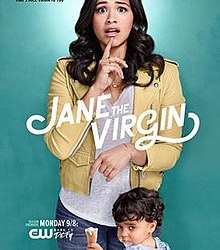
Jane the Virgin: Revising the Binary
The goal of this assignment is to search how TV shows, movies, comics, songs, etc. depict stereotypes and gender roles of Latina women in popular culture. In addition, the goal was to also explain how the artifact chosen either retells, revises or rewrites the binary. From the very beginning I knew I wanted to focus on the Latino community since I, myself am a Latina. I thought about focusing on Latina women in the workplace and analyzing the show, Ugly Betty but it wasn’t a topic that I really connected with. I chose to focus on how Latina women are portrayed in the media and after thinking about it, I decided to look into Jane the Virgin. I picked this artifact because I know that it is a show in which the main character is very family oriented and the storyline is based on the life of a young Latina woman who faces a variety of difficulties such as family expectations, family issues and an unplanned pregnancy. I also know a lot of people who have seen this show including my friends, my sisters, my mom and myself. To provide a brief summary about the show, it is about the life of a pious, hard working 23 year-old Latina woman who is artificially inseminated by accident. This life changing event changes her timeline and the way she had her life planned out. The show, Jane the Virgin revises the binary by destroying Latino stereotypes and challenging expectations that are placed for women in society.
After getting artificially inseminated by accident, Jane is questioned by her family about her promise to stay a virgin until marriage, including her grandma, Alba, who is very passionate about God and Jane. Alba has always been very strict and straightforward with Jane, especially when it comes to her virginity. She gives Jane a white flower and says to her, “look at the flower in your hand Jane. Notice how perfect it is. How pure. Now, mija, crumple it up. Crumple the flower Jane.” After doing so, Alba tells her to try to make it new again but Jane is unable to do so. Very satisfied Alba tells her, “that’s right. You can never go back. And that’s what happens when you lose your VIRGINITY. You can never go back. Never forget that, Jane.” This first scene is very important because it plays a very important role in the life of Jane throughout the show, especially because she has been in a relationship with her boyfriend, Michael, for over two years without any sexual relations. As the audience, we can tell that even though she feels the pressure that as a woman she has to sexually please her boyfriend, she decides not to abide to these expectations. Instead of abiding to these expectations she focuses on her education and the goals she has set for herself. Doing so, encourages the audience, to ask questions such as is the binary useful? Is it appropriate? According to chapter five of Gender Stories, “such questions revise the binary by raising questions for the audiences about the system in which they have been participating” (121). Jane’s commitment to staying a virgin and not allowing herself to fall under these expectations and pressures as a sexual being helps the audience criticize how women (Latina, white, or black) are portrayed in the media, as overly sexualized.
As I mentioned above, Jane’s boyfriend Michael, plays a significant role in Jane’s life. Although, as he says, he would love to have sex with her he still respects her decision to save herself until marriage and that’s something that Jane loves about him. In episode one, Michael proposes to Jane before finding out she was artificially inseminated on accident. As soon as he finds out he backs out and explains to Jane that he can’t be with her if she decides to have ‘it” because it is not his child. When Jane chooses to have the baby and then give it to the baby’s biological father, Rafael Solano and his wife Petra, Jane knows that she wants to spend the rest of her life with Michael, the love of her life. She unexpectedly surprises him in the office to propose to him. She goes up to him and says, “so instead of telling you the reasons why I love you, I’m gonna tell you the reasons why I don’t. I don't love you because you’re smart and kind. I don’t love you because you’re hard-working and competitive and way too defensive (the other officers laugh). I don't love you because you’re incredibly sexy (the officers laugh again). I love you because you’re my best friend. And I want to grow old with you. And right now, I’m confused about every single thing in my life… except you… (the officers applaud and cheer). What is so special about this scene is the way everything is set up. Michael is an officer and as soon as Jane walks into the office the audience can see that every single officer in the room is a man. This scene makes me question why there isn’t a single women in the room except Jane but at the same time it also makes me realize how confident Jane is walking into that room as a Latina woman. Seeing the way she walked into the room, in front of all those male officers encourages me to be confident as a woman. Not only that but she also motivates me to contemplate the binary by the way she challenges it. By proposing to Michael, as the woman, she, “suggests that there are multiple ways of being a man and a woman- ways that expand the prescription of the binary” (124) according to Gender Stories. Not only that but she also sets an example to all the male officers by showing them that a woman is capable of anything, such as being able to walk into a room full of men and proposing to the love of her life.
It is very important to know that Xiomara, Jane’s mom had her at a very young age. After letting her baby’s father know she was expecting, he leaves her and is out of the picture until he decides to come back. In episode two, Rogelio de la Vega, Jane’s father also a very famous telenovela star wants to finally meet her. After many nonstop calls and very pushy demands to let him meet Jane, Xiomara has a hard time telling him no, that it is not the appropriate time. Rogelio not only questions her role as a mother but feels like he has the right to demand her to introduce them after he has not been a father figure in Jane’s life since she was born. On top of that, he decides to show up at their house, at a very bad timing, without asking Xiomara if it was okay for him to be there. Xiomara tired of him not being understanding but demanding has had enough and is finally able to stand firm after he once again, very angrily, tells her that he want to see Jane right away. After being too nice and way too patient she responds to him with, “no you won't, because being a parent means that you put your kids interests first and right now, Jane is overwhelmed, and she needs some part of her life to not change, and so you’re gonna back off until I tell you she’s ready. And don’t ever question me as a mother again, got it?” Very scared, Rogelio backs away and tells her that he will wait. Xiomara’s response makes the audience question what Xiomara’s anger is all about. In some way it questions the binary. In Gender Stories, we learned that “best sellers also offer you gender stories that revise the binary- stories that stretch or modify it in some way. The binary stays in place, but it is challenged and expanded in these revisionist narratives” (121). Xiomara’s response is the appropriate response because she didn’t have a choice but to take the role of a mother and a father from a very young age, while Rogelio very easily walked away. He left her alone with their baby and didn’t help raise Jane emotionally or financially. This lets the audience see how despite doing it alone, Xiomara, as a young Latina mom was able to to raise her daughter without the presence of a man. She was a strong, independent woman and that is something that women need to be given credit for more often. Xiomara did not let Rogelio control the situation because she cared so much about Jane that she was not afraid to stand tall and give him a firm response. If she had not done so, Rogelio would have still kept calling her non stop, demanding everything from her while still having the audacity to call her a bad mother.
To conclude, Jane the Virgin revises the binary by destroying Latino stereotypes and challenging expectations for women. First, Jane the Virgin encourages the audience to question the binary by pushing them to ask questions about the way all women, Latinas and non-hispanic alike- are portrayed. Jane is committed to saving herself until marriage and this depicts how TV shows don’t always need to portray women as sexual beings. Jane is allowed to exhibit a nuanced sexuality, embracing her desires while still managing to stay true to her personal wish to remain a virgin until marriage. This is an example of how it is not necessary to over sexualized women like the media is so used to doing so. Second, women are capable of anything, this include doing things that according to society, are usually meant to be done by men, in this case proposing. Jane is a ray of sunshine with the yellow dress she is wearing in this scene. As soon as she walks in, she fills the room with confidence and that is clearly seen even when the room is all men. Third, though Xiomara had Jane as a teenager, she is not a one-dimensional, Latina teen mom stereotype, and her pregnancy has not defined her life. She was shaped by having had her daughter at a young age, but it’s hardly all there is to her. She is a strong, independent woman who is not afraid to be firm and stand up for her family and herself. Analyzing this series in a more deeper level has made me realized how much I missed out on the first time I watched it. Rewatching these episodes made me realize how Latinos are portrayed. Not only that but it also made me realize how much I connect to this character at a personal level. Some of the same expectations Jane had are some of the similar expectations that I saw play a role in my life while I was growing up. One of them being how important it is to stay a virgin until marriage. This is something that my parents focused on so much throughout my childhood. Not only that but they used religion as the major reason as to why I had to stay a virgin and hearing the same reasons over and over again was something that I got tired of listening to. Not only that, but I also had to learn to be confident as a Latina women everywhere I went. I still have to do that now. Being a Latina woman in today’s society is not easy. This show taught me that I don’t have to fall under society’s or my parents’ expectations. I am going to focus on my education, my goals, and my happiness because I learned that it is okay to do that. I don't always have to do what other people want me to do and I don’t have to please others. It is okay to focus on myself and do what makes me happy.
0 notes
Text
The Last Jedi Blaster Points
I am writing these notes with no reverence or respect for spoilers. Read at your own peril.
One of my favorite songs is still "I still haven't found what I'm looking for." Not because I like Bono's warbly voice all that much, but because it still encapsulates my feelings about this life the best. I've been skimming new and old shows on the streaming services like I'm looking for something, and it occurred to me recently that I AM looking for something. I just still haven't found what I'm looking for.
As the product of a millennialist religion, to me the anticipation of the star wars movies most resembled anticipation of the second coming, and joyous hope for a world made new. This blessed hope has diminished with each flawed arrival of the christ movie, as disillusioned adults realized they weren't 10 anymore and never would be or simply believed the perfect SW movie WAS possible, it was just in hands incapable of crafting paradise correctly. The blessed hope is that someday, someone WILL craft the perfect SW trilogy, and we will walk hand-in-hand into that eternal realm.
As for me, I have long lost the hope that a movie will save me in any fashion, but I still sift through them restlessly, hoping to find some sign of good in them, and by extension the industry that creates them, and by extension western civilization. Like Luke, I want to find the good in the thing that created me. Not coincidentally, one of my other favorite songs is, "Give me something to believe in."
For now, I hold on to one quote from each movie I see that means something to me, even if I can't explain why. For the Force Awakens this was:
"Dear Child. The belonging you seek is not behind you, it is in front of you." (I went home and sobbed after this movie).
For the Last Jedi it's Luke saying:
"No one's ever really gone."
Which ties with my other favorite SW quote:
"Luminous beings are we. Not this crude matter."
"No one's ever really gone." is simultaneously the hope of redemption in this life and the hope of possibilities beyond it.
I look for hope in SW, and in the original trilogy that was the redemption of Darth Vader. A father's love for his son, redemption, and sacrifice are all powerful themes and their combination in Return of the Jedi is probably my favorite aspect of star wars. I personally think genuine redemption (as opposed to posed redemption with no real contrition), is one of the most powerful ideas in human society, is vital to healing social bonds that every one of us can't help but damage from time to time and I like aspects of our culture that champion that idea in a sincere and meaningful way. Our default setting is angry, gory revenge when we are wronged and while we still haven't really gotten much beyond it in our society, we should still try. And what concerns me most about modern society is the increasing absence of redemption, as if we are afraid the wrong people could make use of it.
I believe in redemption because anger leads to hate and hate leads to suffering and while this is a trite pop-culture spiritualism in a kids movie, it is also an idea intimately intertwined in every major religion. To forgive is divine. That doesn't mean you have to be stupid about it, that doesn't mean you have to pretend someone is sincere when they are not. It just means if you can't mend the wound, the remaining options get less fun over time. Isolation, demonization, and violence are less ideal than the alternatives.
So to see redemption tossed so casually aside in the Last Jedi concerns me, but then again, not every story is a story of redemption. This is partly a story about fascism that cannot be reasoned with. I think western civilization is still figuring out how to deal with fascism politically and Star Wars is some not small part of that. How do we stop violent eliminationists without just violently eliminating them? Star Wars has so far not been up to the task in answering this question, but I'm glad it tries. The First Order is still woefully underdeveloped, and the original empire under Palpatine was 1-dimensional evil. A deep exploration of fascism this series is not.
Part of the problem here, is I don't think we have much of an idea of what a healthy, functioning democracy looks like yet in our civilization, which is partly why you never actually see one in Star Wars. Just cartoon fascism and people clinging to hope that we'll figure it out someday. That moves me, and If feel it, but it doesn't enlighten me. Star Wars has yet to show me how things could be better, just that power is being taken by hateful, violent people and we should stand up to them. And they should and we should and I still want to know what better, specifically, looks like.
More interesting here is the way TLJ seems to upend the traditional star wars story entirely. Not even is this not a story about the redemption of Ben Solo, this may not even be a story about the empire or the rebellion. Both the main empire vs rebels and jedi vs sith storylines are cracking at the seems in this movie, as new stories threaten to break free from beneath them. The rebellion vs the First Order is recast several times as the 1% vs the poor and downtrodden and jedi vs sith is cast as dogmatic religions too rigid in their thinking and the light and the dark as oversimplifications that hurt more than they help.
Luke panics at how readily Rey faces the dark side cave, but the panic seems more that the dark is so seductive a person can't help but succumb. But this is Luke's problem, not Rey's. She touches the dark side and instinctively recoils. It is not who she is, it does not have what she wants, it holds very little power over her. Luke's reaction reminds me a lot of christians who freak out when their kids are exposed to any non-christian opinions. If you genuinely believe your ideas are more powerful and more compelling, why be afraid?
Similarly, Kylo Ren seems devoted to the dark, but does not seem to fear his explorations into the light. His lines about killing the past and leaving the Jedi and the Sith far behind were genuinely exciting but also the kind of thing an ambitious Sith would say. For the Sith, it's always about being the new force-using iconoclast who reinvents even as he innovates and remolds the universe around him. But still, as a fan I'm genuinely excited to see the genuinely stale jedi vs sith contruction cast aside in favor of more nuanced depictions of light and dark. I think there is such a thing as good and evil, but SW has long been constricted by overly-simplistic mythologies and losing those to some degree will enable more interesting discussions of good vs evil. Is it still Star Wars if you stop talking about Jedi and the Sith? I honestly don't know.
Beyond that, I have no idea where they're going with Ben Solo from here. He's one of the most well-developed characters of the new series, extremely sympathetic, and seemingly as unbound from the Sith as he is to the Jedi. He may have grabbed the helm of the first order, but to what end? He doesn't strike me as the type who wants to rule the universe, just to do as he wants when he wants to. He's an interesting character, but I'm not sure I buy him as the new prime evil of the series. The next movie needs to add something here, in terms of characterization or motivation or new villains (or a surprise resurrection and exploration of his relationship with Snoke or something).
Of course, there IS actually a short redemption arc in this film, but it's not Ren, it's Luke. Rey brings Luke back the way Luke brings Vader back. Luke nearly fell to the dark side in trying to be a Jedi Master, and it scared him so bad he shut himself off from it and went into exile. Here, Rey faces the dark unafraid and without letting it diminish the light in her and Luke, in the end, does the same. I think if there's any powerful emotional core to this movie, it's that.
Not only that, but Luke's final duel is most powerful in what it fails to give Kylo, and by extension the blood-thirsty fanboys in the audience: violent revenge. The movie does a good job in implying Luke is there to kill Ben, or that Ben is going to kill Luke like Vader killed Kenobi. Luke, finally a Jedi Master, shames them all by solving the problem elegantly and non-violently. He admits he fails him, says he's sorry, and saves his friends and family; all without wasting a life. The last act of the last Jedi Master is probably by far the strongest argument for the existence of the Jedi Order in the history of the franchise. Yoda said the hardest part of being a master was being the thing his students grow beyond and he was talking about Rey, but he was also talking about Luke. Not even Yoda did so much good with so little violence. I was unsure I liked what they did with him as I left the theater last night, and now I think I love it.
With that in mind, I'm still not sure this trilogy won't end with the redemption of Ben Solo. His two most important father-figures leave him with kind words and looks of love on their faces. Han touching his son's face before he falls and Luke with a gentle "See ya 'round, kid." (or somesuch, expect to see Luke as a force ghost in the third act). Moreover, he's still not committed to the dark side. He's abandoned the sith as much as he's abandoned the Jedi. I'm not saying it should end with his redemption; if he relentlessly and continually chooses evil it cannot. I harbor a suspicion that Ren is a stand-in for the angry ostracized man-children in the fanbase, who may choose evil but who we have also failed to bring into a healthy adult community. These are also the most vulnerable recruits to fascist movements anyway, so maybe SW is exploring "how to fight fascism" more in Kylo Ren than in the First Order vs the Resistance.
As far as the Wars part of the Stars goes, I don't know what the new series is doing. The world-building in this new trilogy is awful. The First Order are just fascists who have not been fleshed out at all. Okay. They couldn't figure out how to depict a functioning democracy so they just nuked the Republic in the first movie(again, this is a big weakness in western civ right now). Leaving a tiny resistance that only gets tinier over the course of the second movie. I mean the entire arc here is the Resistance fleeing from one base, and a slow-ass chase to a new planet which they again flee. Call him all the names you want, but Lucas was significantly better at world-building in the first 6 movies, for all his failings with dialogue and how people work. Details matter and there are not enough details here. The First Order is bad and the resistance is good is all you really get, with not even a sketch of how the rest of the galaxy looks at this point. This part of the plot exists without any context whatsoever and that is frustrating.
So, while I am excited for all the new directions hinted at in this film, it's still kind of a mess. While I enjoyed a lot of it, it resolves too much and has almost zero forward momentum going into the third act, which is a, um, bold choice. There's no question of Rey's parents going forward, there's no question of "will Kylo turn?" (or is there?), the rebels are flying free and happy to their friends in the outer rim (although no one answered, so maybe?). Snoke is dead. The First Order and Ren still plan to take over, but that's how the first movie ended. The resistance is weak and on the run but that's how the first movie ended. There are no characters in dire peril that will need to be rescued, unless we're still talking about redeeming Ben Solo, Luke is dead (but not gone!), and all the series regulars are safe for now. What tensions run taut between them? What ill wind blows them to destruction or salvation? I have no idea and the movie doesn't either. And that's, frankly, very disappointing.
All that said, beyond Luke's redemption, there are some things that really worked for me. Laura Fucking Dern. Her dramatic lightspeed sacrifice that was such a stunningly powerful and beautiful moment that I gasped out loud. Leia force-pulling herself back to the ship. It worked for me and my only question for those who hated would be: Would it have worked for you if Luke had done it? why or why not? My suspicion here is old women in dresses are traditionally coded as helpless so to see an old woman in a dress save herself strikes people (*coughes* men *coughs*) as a ridiculous spectacle. I just liked the reminder that Leia is a Skywalker.
The battle on Crait was great, if anti-climactic. Like I said, I ultimately like it as a powerful end to Luke and the Jedi, but in terms of the actual battle, it kind of fizzles. Although those speeders were cool. Visually lovely though, in traditional star wars fashion. Finn's battle on the ship and vs Phasma was pretty great. BB-8 generally kicking ass, especially in the AT-ST, worked very well for me. Bencio Del Toro's codebreaker guy was interesting. The New Han Solo ladies and gentlemen! The alien creatures were good and I wanted more. The throne room fight scene where Rey and Ren face off against Snoke's goons was fun and I like how they eschewed the traditional lightsaber tropes in general in this film. I thought the humor generally worked. Poe on hold for Hux was probably Poe's best moment.
In terms of things that could have worked better, Chewbacca should have taken a bite. Finn's side adventure interrupts the flow of everything. Seems more appropriate for a rogue one style spin-off (honestly, they didn't know what to do with Finn in this movie, which is a shame because he's great). Not enough material for Finn and Poe slashfic. Finn and Poe are in love and I won't believe otherwise. Not quite enough star-fighting for my taste.
This trilogy is weird. Johnson took a right angle from Abrams and Abrams will probably have to take another sharp turn to save it. The lines leading from movie to movie will probably not end up lining up too well. A lot of complaints about modern cinema revolve around flashy cinematography that essentially doesn't go anywhere, promising the meat will be in the next installment. These movies are always leading somewhere great but rarely great in and of themselves. There's lots I like about the Last Jedi, but I think that critique holds some water here. Too much hinges on where the next movie goes and this movie should hold up better under its own weight than it does.
I'll watch the next movie both because I love Star Wars and I'm curious how they'll resolve any of this. I'm hoping it will still have that one good line worth holding on to. But I'm not expecting it to save me, or turn back time, or usher us into a bright new Star Wars paradise and neither should you.
via Blogger http://ift.tt/2zitWAn
0 notes
Photo

Adventure Time: "You Blew It Man!" An Essay Adventure Time“You Blew It Man!”Hello everyone! I’ve been a fan of Adventure Time since its conception, and I’ve often read the thoughtful and intriguing discussions posted on this subreddit. However, I was often hesitant and nervous about positing my own opinions of this show, especially since I was shy and never quite built enough confidence to put myself out there. Now that it is all coming to an end, though, and I see just how loving, dedicated, and supportive the people here are to Adventure Time and for each other, I wanted to post something. Thank you for helping me gather the courage to speak about this crazy, unique, sprawling, imaginative, daring, silly, philosophical, emotional, hopeful, and very mathematical show. It’s a long list, and it’s a testament to this “kid’s cartoon” with all of its creativity and heart that I could use a thousand more words and still have more to say. In the ever expanding and inventive medium of television, Adventure Time proudly stands on its own as a beacon of childhood and hope.To be entirely truthful, Finn the Human is not my favorite character. He is not always interesting and entertaining; and, in his more emotionally volatile years, he can be painful to watch as he flounders in a swirling, violent vortex of relationships and heartbreak. Even at his most selfish and vulnerable, though, Finn is loyal, caring, and righteous; in the context of a coming of age epic, he makes for a great and compelling main character. His development is gradual and meaningful, and this development of his character as he matures and grows is significant enough that we observe a different Finn in each season without losing sight of his heroic heart and noble spirit. There’s the head-strong adventure-seeking child of Season 1, the more accepting and quietly emotional adolescent of Season 3, the sexually awakened and selfish teenage of Season 5, the contemplative youth of Season 6, and the insightful and intelligent young man of Season 7 and Season 8. The episodes focusing on Finn may not always be of high quality, but they all do their best to work in service of his character.The gradual growth of Finn from season to season as he enters manhood is surely impressive, but to see how he also maintains his most important characteristics while he still changes is frankly astounding. Even the best of animated main characters such as Steven Universe or Aang (not “Ung” from the movie adaptation, God help us all) from Avatar: The Last Airbender often stagnate for long periods of time or occasionally act out of character. There are definitely a few hiccups in Finn’s development, such as the return of his arm in “Breezy” (Finn still gets some great development in Season 6 and I love this episode for its handling of depression, but this arm conflict was a big missed opportunity). However, unlike with Aang or Steven, we never lose sight of Finn as a character. He always stays the one true hero of Ooo, and all I can say to that is, “Schmowzow!”Now, I want to discuss a controversial episode which not only showed Finn at one of his lowest emotional points but also hurled a blazing spear of such tremendous velocity and intense force that it impaled and scattered the entirety of Adventure Time’s fan base. This episode is Season 5’s “Frost and Fire.” I was fifteen, just starting high school, at the time. I remember Cartoon Network absolutely hyping the shit out of this new episode, the advertisements exclaiming this was an event not to be missed. Will anything happen to Finn and FP? Is Ice King going to threaten their heating relationship? Stay tuned at (insert time here) and watch the sparks fly! The commercials were probably not that cheesy and strained, but from the crude way a large portion of the fan base strived to match any of the characters into a forced romantic relationship and the poor treatment the channel later gave to its more quality shows, they might as well have been that cringe inducing. The ads were also manipulative in that they influenced many anticipated fans to believe the episode would potentially be another emotionally draining melodrama which further developed Finn and FP’s relationship into something akin to “true love.”It is perfectly understandable why fans held this view, for Cartoon Network was also manipulative in the way they advertised Season 4’s “Burning Low,” a good episode in its own right, as essentially a love triangle among Finn, PB, and FP. The episode certainly possessed romance and dramatic tension, but the focus was on Finn finally expressing his emotions to Bubblegum and the rage he feels for being so conflicted. Flame Princess’s characterization is actually rather thin, and she has very few lines of dialogue here. However, as the commercials depicted and exaggerated, the episode’s drama was genuinely engaging and the emotions brutally raw. More importantly, Finn and FP officially kissed on screen, which solidified their relationship status for many of the fans. There was an intimacy there which few shows, even those developed for adults, could capture well. In addition, Finn is compelling and human enough character that we want to see him succeed and find someone special to live his life with. For a maturing adolescent wandering through a cheerfully bleak land of isolation and sweetness, FP was someone wonderful. If anyone doubts the impact and influence “Burning Low” had on fans, the episode is recorded to have the highest ratings in the show’s entire run, right in the middle of a season with heavy episodes like “I Remember You” and “The Lich.”Of course, Adventure Time doesn’t act like most television shows and is nearly unpredictable, which directly puts it at odds with fans who want to take a more conventional and traditionally satisfying route. If television shows were like rivers with the occasional twist and turn, serenely flowing to their natural conclusions, then Adventure Time is a torrential rapid which breaks off into hundreds of smaller tributaries before pouring up a cliff side as a reverse waterfall, defying the gravity of expectations as it strives for the clouds themselves. And in the midst of ever expanding, the main river takes a moment before flowing naturally again to tumble and swirl into the violent whirlpool that is “Frost and Fire.”There are probably several reasons why this episode plummeted into controversy, but the most important one is also the easiest to identify: Finn and FP broke up over a wet dream. There’s no point denying whether what he did was truly wrong: Finn experienced a sexual awakening and exploited the insecurities of his trusting hot tempered girlfriend and a demented old soul to manipulated them into harming and potentially annihilating one another, all because he wants to get aroused. Consequently, Ice King lost his home, FP lost her only friend, and Finn utterly blew it. I remembered thinking what the Hell just happened, more so than the average episode. Why would Finn act like such a prick of a dick? In retrospect, the answer is simple: Finn is a teenager, and teenagers can do some really stupid shit. As a teenager at the time, I was too self-absorbed to understand why Finn did that shit, but I definitely thought what he and the show did was stupid. Finn is certainly a noble and heroic spirit, but he is also figuratively and literally human. He has no one like him who fully understands what he is going through and how to confront such feelings like arousal. Jake, the wonderful brother he is, simply does not comprehend this aspect of Finn. He does know about prophetic dreams and fate, though, which is why he encourages Finn to commit the deed. Therefore, Finn is essentially alone stumbling in the dark chambers of the dungeon of adolescence, and he poked some big ass monster with his sword trying to find the way out.However, adolescence is not the only reason why Finn acted this way; selfishness is another integral aspect of Finn’s character which motivates some of his actions, and it’s just prevalent enough to be more than just simply being naïve or bull headed. Finn has occasionally harmed others, usually unintentionally, in order to help himself or someone for whom he cares deeply. Unintentional or not, though, the pain is very real. Take Season 2’s “Storytelling,” for example, when Finn abuses multiple innocent animals to create a good story for Jake, or “To Cut a Woman’s Hair” when Finn tries to save Jake from a witch’s bottomless bottom by stealing and/or harassing princesses for their hair. Or how about “Another Way,” where Finn beats up anything and everything to get his foot healed and avoid his fears, or that time in “Sons of Mars” when Finn essentially killed the King of Mars out of his deep caring and tunnel vision to save Jake, or “The Lich,” where Finn steals from every princess in Ooo in order to help BILLYEEE for a highly ambiguous purpose? Better yet, what about “All the Little People,” where Finn gets a chance to play God and fiddle with the lives and relationships of tiny figurines without once questioning their own individuality?The reason Finn’s selfishness is not addressed more often is because Finn has enough of a conscience to later realize what he did was wrong and apologize for said wrong doing. These apologies were enough to patch up the problems with most of the characters he harmed. However, his crime in “Frost and Fire” cuts too deep into a very complex relationship to be forgive so easily with words. As Magusmirificus refers to, this is the point where Finn needs to stop viewing his life as a video game and treat it and the people around him with nuance and consideration. Considering Finn’s own father is Martin, a pompous dingwad who is sucked so far up his own ass that he’s his own black hole, distorting everything around while he himself is filled with nothingness, it is amazing Finn is not even more selfish. That is because Finn has friends who care about him and a brother who loves him. Finn has, as Martin puts it, “a star to revolve around.” The pain Finn feels may last for some time, but it is not forever, and as we see in Season 7, he becomes all the better of person and friend precisely due to everything he has gone through. From here on out, Finn eventually conquers his selfishness and becomes truly selfless.Not everything following “Frost and Fire” is great: Finn is too horrifically awkward to watch in “The Red Throne” considering he already tried this with PB earlier in “Too Old” (an episode I personally really like), and Flame Princess is not strong enough of a character to carry said “Red Throne” or the rather lukewarm “Earth and Water.” However, there is something beautiful in seeing Finn grow in episodes that range from very good to downright brilliant. That is because the crew is so dedicated to Finn as a character and put a lot of effort into making the arc “Frost and Fire” ignited truly work.In addition, there’s really no way to get around this episode when revisiting the show; it is too grounded in the series’ past. We have Finn’s slight selfishness as a character and his initial sexual arousal from “All the Little People” come into play. There are the prophetic dreams and Cosmic Owl from “The Final Frontier” as well as a callback to PB’s probable German roots. We have Ice King’s tragic backstory being acknowledged as Finn abuses him. And, of course, there is the collapsing relationship between FP and Finn that started from “Incendium” onwards. Likewise, the episode greatly influences the events to come that will affect Finn and his friends’ lives. Such events include Finn and FP’s breakup, the destruction of Ice King’s home, the dissolving of Finn’s demon sword due to Ice King’s antics, FP dealing with her betrayal and her subsequent transformation into a ruler who focuses on trust, Finn’s torment and anguish following the breakup, the introduction of the grass sword, the loss of Finn’s arm and the birth of Fern. Many of these plots last several seasons, even extending to the end of the series, and they all stem from the tragedy which occurs here. As suggested by “The Comet,” even the most insignificant act has consequences which go far beyond what we can see and feel. This immaculate randomness and the very real and caring individuals it encompasses is what life is all about.A major component of Adventure Time’s success and identity is its portrayal of childhood and its real sense of hop, that everything will turn out all right. However, in order to confront maturity and retain such hope, Finn, that boy adventurer in a bear hat who in some way represents all of us, has to be challenged in the face of all sorts of adversities, whether it’s candy zombies, selfish acts, the Lich, sexual awakenings, an uncaring father, isolation, or the death of a best friend and brother. If hope can survive that, through apocalypse, adolescence, and loss, then even wonders like Ooo can prosper from destruction, and a young man can have a life that is happy and truly worth living.I know that this was a long ramble which went everywhere and nowhere in particular, but I’m glad I was finally able to speak my mind on this special show. If you still hate this episode with a fiery passion or icy disdain, that is perfectly fine! If you think I’m full of it and want to set me straight, I would welcome such a conversation. To be able to discuss this show, no matter the opinion, is fun, educational, and helps me to become a better and more understanding individual. My only hope is that you give this episode another chance and try watching with a fresh perspective, for even when you become an adult, as a wise nut once said, “You never really stop growing.”Thank you.
0 notes